Oct 23, 2018 | Non categorizzato
The joy of service When our son died after the treatment he received was ineffective, my wife began to suffer from depression. She found visits from other children unbearable and, gradually, we became very isolated to the extent that life didn’t have meaning anymore. One day we got to know a community that tried to put the words of the Gospel into practice. There was one Gospel sentence that made a big impact on her and changed her life. It was, “There is more joy in giving than receiving.” After reflecting for a while, she went back to work as an assistant in a centre for children suffering from cancer. From then onwards, she recovered very quickly. One day she told me about the joy she had found in serving other children. R.A. France The shoe rack Poor health forced me to stay at home for a few weeks. I wanted to do something and so I decided to make a shoe rack but I made such a bad job of – it had so many defects – that I was quite depressed with the result. My wife and children, however, kept saying that it was wonderful and praising me. That made me think that maybe it wasn’t as terrible as it seemed to me and so I began to make other things that would be useful around the house. When I returned to work, I was really happy to see my colleagues again. I think love made me well. S.V. Czech Republic The new car Our old car wasn’t worth repairing but we couldn’t afford another one. We have a daughter who suffers from autism and can’t use public transport or walk very far. With great faith we prayed for a solution believing that God had already answered us. Soon afterwards, some friends in the parish told us about a car they had found: it was second hand but in perfect condition. Once again, God helped us. R.C. Great Britain No keys On account of poverty and unemployment, many people on our island resort to stealing and burglary. One evening, Nanou wanted to go to a meeting in the parish while her parents were out. She didn’t have keys to lock the door and so she pushed it shut with a brick and asked Jesus to keep the house safe. When she was coming back she met her parents who were also making their way home. Her father was furious when he found the door unlocked but he couldn’t match her faith and trust in Jesus. What’s more, nothing had happened. D.R. Madagascar I am free to love I didn’t take much notice of the early symptoms. My voice sounded lower, I had backache, difficulty in swallowing, I had poor balance and fell over, I had problems with my nose. Then, on June 13 2016, in Bologna, I received the diagnosis: amyotrophic lateral sclerosis – ALS. There were just the initials written on a tiny piece of paper. For several days, the words of Saint Paul kept coming into my mind; “We are afflicted in every way but not crushed, perplexed but not driven to despair.” I kept looking at that piece of paper. The initials reminded me of the Italian words which say “I am free to love.” When my muscles won’t work, when I can’t smell anything, when my senses of touch and taste have disappeared, I can still love. If you can transform suffering into a gift of love, then life smiles back at you. We are not made for defeat. F.S. Italy
Oct 22, 2018 | Focolare Worldwide
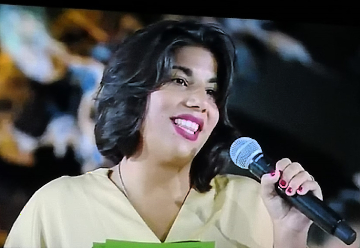
Oct 21, 2018 | Focolare Worldwide
 Ana is 19 and lives in Spain. She started to talk while she walked onto the stage of the Paul VI Hall. “In order to better know about the socio-sanitary sector, last March I went to a hospital in my city,” she recounted. In the hospital she was received by a social worker who, instead of many words, lent her a gown, put a case sheet in her hand, and accompanied her to the room of a patient: “When I entered and saw him, a shiver ran down my spine. I had to leave for a second to take a deep breath.” On the bed lay a boy, just a bit older than her, a terminal cancer patient. Ana took courage and returned to the room: «How are you?» He looked her with surprise, and asked her to repeat the question. “The first thing I did was to present myself – then he said – I have been here for two months now. I have bone cancer and I don’t have much time to live and I feel that I am losing everything: the family, my job, my girlfriend. My life no longer has a meaning.” Ana was in a state of shock. A million emotions and thoughts passed through her heart and mind. However, she tried to start a conversation by telling him about herself and her life. After a few minutes of silence the boy asked: “Do you believe in God?” Once again Ana was taken aback but answered with a big “yes.” “I instead, say no, since he has abandoned me – he added – because in just a few month he will take my life. He has really left me alone.” The young Andalusian girl entrusted herself to God before answering: “What you feel now has a name, it is ‘Jesus Forsaken.’ God has not abandoned you and he continues to stand by you more than ever. He is putting you to the test and with what you are undergoing is asking you a question which you still may not have answered: “Can you follow me also in the greatest suffering?” He has chosen this cross for you and for you alone, for a reason, because he wants you to bear witness to his love. He wants to make you a saint. You can become a saint if you accept and receive this suffering, and if you take it as something that comes from God and not as something you own. Then, without second thoughts, start loving the people around you, your parents, your girlfriend, your friends, making them see that you do not fear death because you have found something precious that helps you to live moment by moment, without thinking of what you will be tomorrow.” “Through the social worker I found out a few days after my visit, that his health had worsened, Ana recounted – and that he asked to receive the sacrament of the sick, to be able to go in peace. After some time, I received this letter…” On the stage of the Paul VI Hall, a young actor reads out Hugo’s letter: “Hi Ana, let me tell you something about myself. These have been difficult days since the cancer has advanced much faster. I felt more tired and weak, but those were the occasions in which I had to love more. These have been hard days since I saw that death was coming closer and it scared me a bit. But when this happened, I remembered that it is not death that beckons, but God: he was calling me to be with Him in Heaven, and this gave me the strength to smile, to love. I have now very little time left down here, Ana, but I must tell you that now I am not afraid because I know that I shall be fine up there. Thank you for pulling me out of that deep hole, for listening to me, but above all, thanks for having brought a new God into my life. I want you now to live for both of us, enjoy for both of us, and fulfill all your dreams. I shall always be beside you, and from Heaven, I will take care of you every day, I shall be like your little guardian angel. I gave the social worker a cross which she will give you on my behalf. I have always worn it since my first Communion, but I want you to have it so that when you look at it, you will remember that this is the Cross that God wished for you and has to be borne with joy and love always. I shall await you in Paradise, Ana.” Tamara Pastorelli Source: www.cittanuova.it
Ana is 19 and lives in Spain. She started to talk while she walked onto the stage of the Paul VI Hall. “In order to better know about the socio-sanitary sector, last March I went to a hospital in my city,” she recounted. In the hospital she was received by a social worker who, instead of many words, lent her a gown, put a case sheet in her hand, and accompanied her to the room of a patient: “When I entered and saw him, a shiver ran down my spine. I had to leave for a second to take a deep breath.” On the bed lay a boy, just a bit older than her, a terminal cancer patient. Ana took courage and returned to the room: «How are you?» He looked her with surprise, and asked her to repeat the question. “The first thing I did was to present myself – then he said – I have been here for two months now. I have bone cancer and I don’t have much time to live and I feel that I am losing everything: the family, my job, my girlfriend. My life no longer has a meaning.” Ana was in a state of shock. A million emotions and thoughts passed through her heart and mind. However, she tried to start a conversation by telling him about herself and her life. After a few minutes of silence the boy asked: “Do you believe in God?” Once again Ana was taken aback but answered with a big “yes.” “I instead, say no, since he has abandoned me – he added – because in just a few month he will take my life. He has really left me alone.” The young Andalusian girl entrusted herself to God before answering: “What you feel now has a name, it is ‘Jesus Forsaken.’ God has not abandoned you and he continues to stand by you more than ever. He is putting you to the test and with what you are undergoing is asking you a question which you still may not have answered: “Can you follow me also in the greatest suffering?” He has chosen this cross for you and for you alone, for a reason, because he wants you to bear witness to his love. He wants to make you a saint. You can become a saint if you accept and receive this suffering, and if you take it as something that comes from God and not as something you own. Then, without second thoughts, start loving the people around you, your parents, your girlfriend, your friends, making them see that you do not fear death because you have found something precious that helps you to live moment by moment, without thinking of what you will be tomorrow.” “Through the social worker I found out a few days after my visit, that his health had worsened, Ana recounted – and that he asked to receive the sacrament of the sick, to be able to go in peace. After some time, I received this letter…” On the stage of the Paul VI Hall, a young actor reads out Hugo’s letter: “Hi Ana, let me tell you something about myself. These have been difficult days since the cancer has advanced much faster. I felt more tired and weak, but those were the occasions in which I had to love more. These have been hard days since I saw that death was coming closer and it scared me a bit. But when this happened, I remembered that it is not death that beckons, but God: he was calling me to be with Him in Heaven, and this gave me the strength to smile, to love. I have now very little time left down here, Ana, but I must tell you that now I am not afraid because I know that I shall be fine up there. Thank you for pulling me out of that deep hole, for listening to me, but above all, thanks for having brought a new God into my life. I want you now to live for both of us, enjoy for both of us, and fulfill all your dreams. I shall always be beside you, and from Heaven, I will take care of you every day, I shall be like your little guardian angel. I gave the social worker a cross which she will give you on my behalf. I have always worn it since my first Communion, but I want you to have it so that when you look at it, you will remember that this is the Cross that God wished for you and has to be borne with joy and love always. I shall await you in Paradise, Ana.” Tamara Pastorelli Source: www.cittanuova.it
Oct 20, 2018 | Non categorizzato
If we are united, Jesus is among us. And this has value. It is worth more than any other treasure that our heart may possess; more than mother, father, brothers, sisters and children. It is worth more than our house, our work, or our property; more than the works of art in a great city like Rome; more than our business deals; more than nature which surrounds us with flowers and fields, the sea and the stars; more than our own soul. It is He who, inspiring his saints with his eternal truths, leaves his mark upon every age. This too is His hour. Not so much the hour of a saint but of Him, of Him among us, of Him living in us as we build up — in the unity of love — his Mystical Body and the Christian community. But we must expand Christ, make him grow in other members, become bearers of Fire like Him, (that dissolves the human side of us into the divine which is Charity lived out). Make one of all and in all the One. It is then that we live the life that He gives us, moment by moment, in charity. The basic commandment is brotherly love (see 1Pt 4:8). Everything is of value if it expresses sincere fraternal charity. Nothing we do is of value if there is no feeling of love for our brothers and sisters in it. For God is a Father and in his heart he has always and only his children. Source: Centro Chiara Lubich

Oct 20, 2018 | Non categorizzato
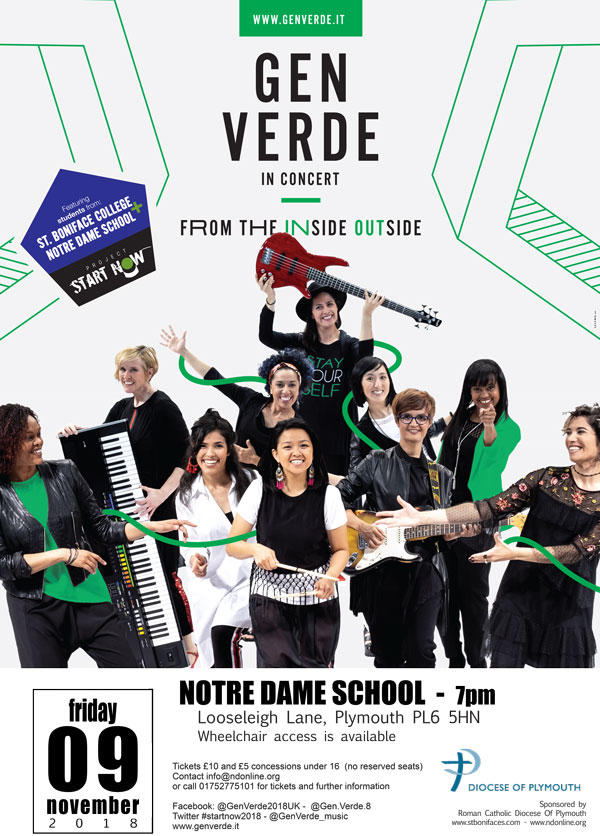 Dates: Plymouth:
Dates: Plymouth:
6-7-8 November: Workshop with young people 9: Concert 10: Feedback with young people
Welwyn Garden City:
16-17-18 November: workshop with young people
Birmingham: 20, 21 and 22 November: workshop with young people November 23rd: concert November 24rd: Feedback GenVerde Tours
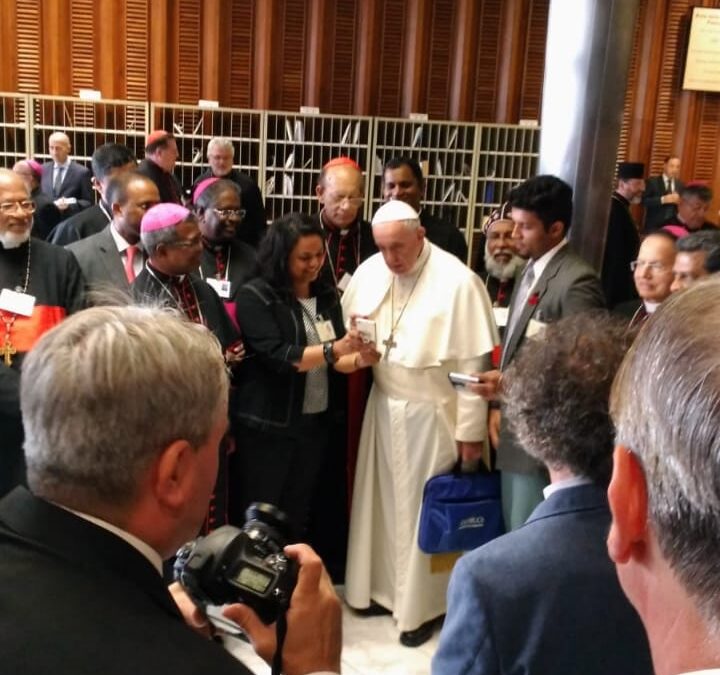
Oct 19, 2018 | Focolare Worldwide
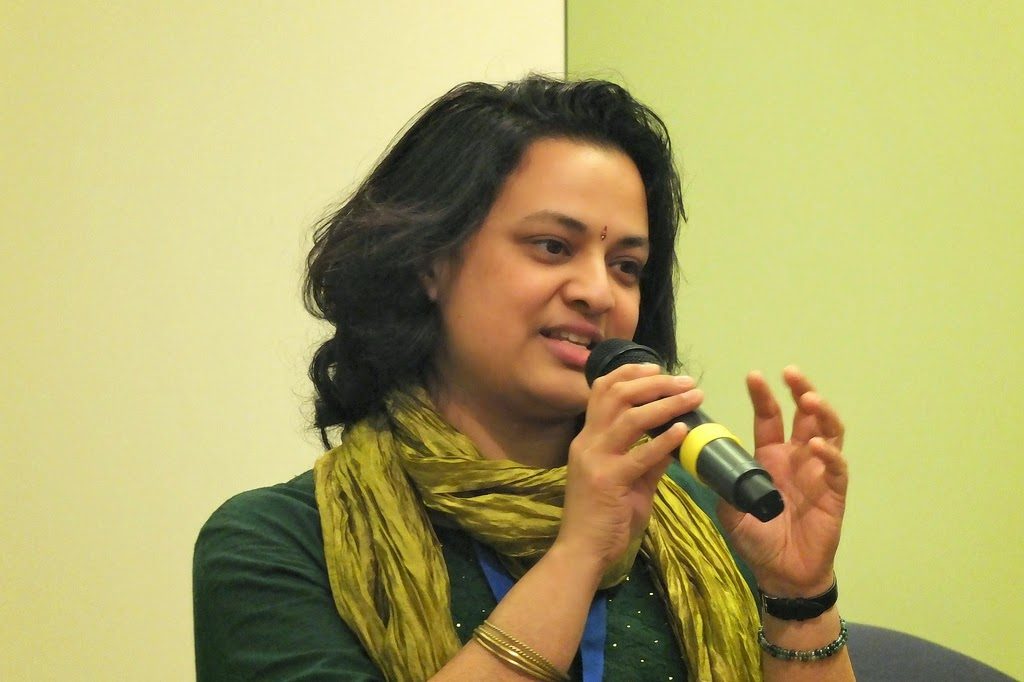 Cherylanne (Doni) Menezes is from Mumbai. She is part of the delegation of 11 members representing India at the Synod on Youth, underway in Rome up to 28 October. Raised in a family that is very active in the district parish, and within the context of a multi-religious community, after her studies in economy and business Cherylanne started to work in the field of management. But her broad range of interests led her to acquire a Master’s at the Sophia University in Loppiano, Italy, where she wrote a thesis on Hindu-Christian dialogue in the Focolare Movement, where still today she is committed with the young people of her country. I met her during a break during the synodal works. The Indian delegation is headed by Cardinal Oswald Gracias, Archbishop of Mumbai, and is composed of 9 bishops (of the Latin, Syro- Malabar and Syro-Malankar churches) and another lay person, Percival, President of the Indian Catholic Youth Movement. Cherylanne is attending the Synod as a representative of the Focolare Movement in India. She has met Pope Francis twice, together with the delegation. The first was at the start of the works (“Also the Hindu youths of the Focolare Movement are praying for you and for this event,” she said to the Pope, who reacted with a happy exclamation) and the second when the Synod had already started.
Cherylanne (Doni) Menezes is from Mumbai. She is part of the delegation of 11 members representing India at the Synod on Youth, underway in Rome up to 28 October. Raised in a family that is very active in the district parish, and within the context of a multi-religious community, after her studies in economy and business Cherylanne started to work in the field of management. But her broad range of interests led her to acquire a Master’s at the Sophia University in Loppiano, Italy, where she wrote a thesis on Hindu-Christian dialogue in the Focolare Movement, where still today she is committed with the young people of her country. I met her during a break during the synodal works. The Indian delegation is headed by Cardinal Oswald Gracias, Archbishop of Mumbai, and is composed of 9 bishops (of the Latin, Syro- Malabar and Syro-Malankar churches) and another lay person, Percival, President of the Indian Catholic Youth Movement. Cherylanne is attending the Synod as a representative of the Focolare Movement in India. She has met Pope Francis twice, together with the delegation. The first was at the start of the works (“Also the Hindu youths of the Focolare Movement are praying for you and for this event,” she said to the Pope, who reacted with a happy exclamation) and the second when the Synod had already started. 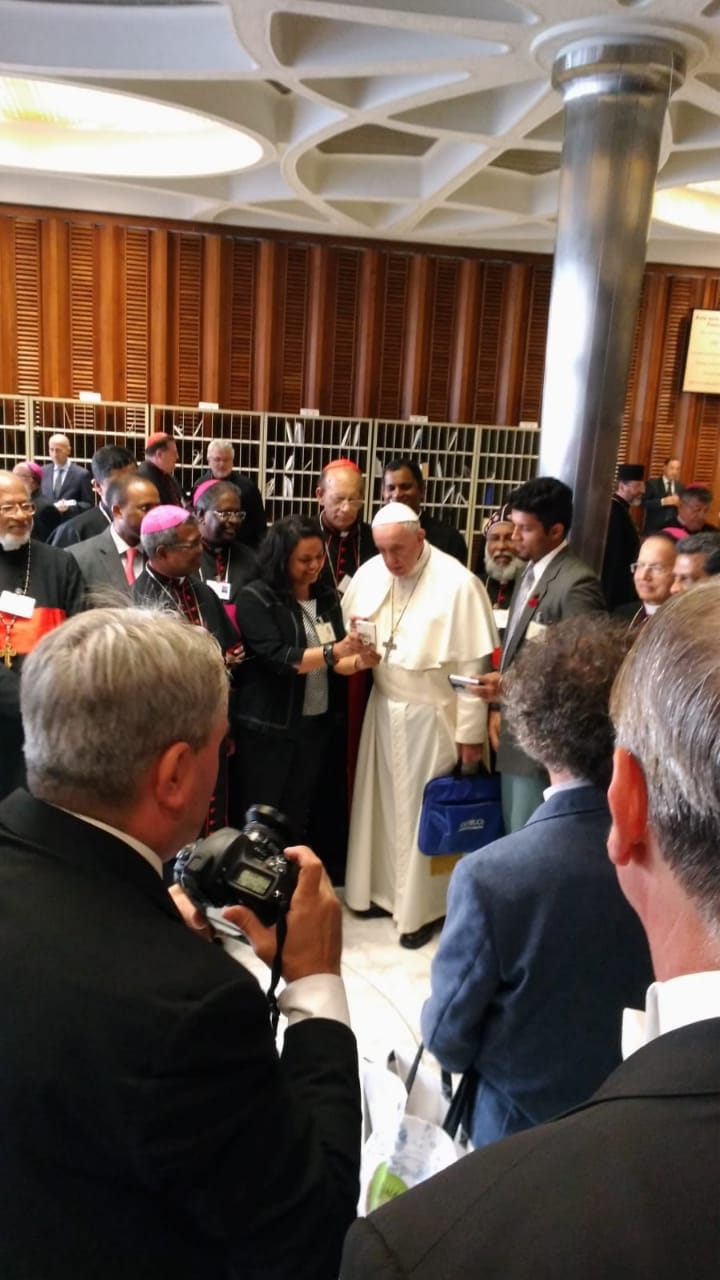 The new appointment was for 17 October. The delegation arrived on time, at the entrance of Aula Nervi, at 4 p.m., together with that of South America. The afternoon session started at 4.30, and half an hour earlier Pope Francis met the single groups, in a joyful and informal personal encounter that was an integral part of the Synodal spirit. Percival gave the Pope a sandalwood cross bearing the image of the Good Shepherd, work of a Hindu artist. “I have also letters for you, Holy Father” Cherylanne added. The letters are wonderful, full of affection of the youth and families of India. Among these were also those of two youths, a Hindu and a Muslim. Besides talking of themselves, they put down in writing the promise to pray for the Pope and the Synod. “Yes, because this is the Synod of all the youth,” Cherylanne explained. On consigning the cross and the letters, Cherylanne dared to ask: “Holy Father, would you like to answer with a video-message to these two young people?” “Certainly,” the Pope answered. She took out her cell phone and the Pope turned to look right into the screen. “I want to thank you for your greeting. I greet you too. I pray for you, and ask you to pray for me. We are one in friendship. Unity is always superior to the wars. Work for unity among peoples, respect the identity of one another, whatever religion you profess. May the Lord bless you… Pray for me!” The very short video captured a last frame, the smile of Pope Francis, and the mission ended successfully. Taking a shoot of Pope Francis’ greeting with one’s own cell phone is not something that happens every day, I said. “It wasn’t an act of courage – she said – I just grabbed the opportunity, Pope Francis is always so easy to approach.” How is the experience of the Synod coming along? I asked. “We are experiencing a moment of insight in which the Holy Spirit is at work, and renews everything. The experience which the disciples on the road to Emmaus had lived well describes what we are experiencing. The Church is becoming aware not only of its challenges, but also of its internal wealth and potential. I see a growing convergence in our ideas, here at the Synod, and the urgency to walk together, youths and bishops, clergy and laity, religious movements and associations, in order to go towards the world together and demonstrate our love in action.” Chiara Favotti https://vimeo.com/296453712
The new appointment was for 17 October. The delegation arrived on time, at the entrance of Aula Nervi, at 4 p.m., together with that of South America. The afternoon session started at 4.30, and half an hour earlier Pope Francis met the single groups, in a joyful and informal personal encounter that was an integral part of the Synodal spirit. Percival gave the Pope a sandalwood cross bearing the image of the Good Shepherd, work of a Hindu artist. “I have also letters for you, Holy Father” Cherylanne added. The letters are wonderful, full of affection of the youth and families of India. Among these were also those of two youths, a Hindu and a Muslim. Besides talking of themselves, they put down in writing the promise to pray for the Pope and the Synod. “Yes, because this is the Synod of all the youth,” Cherylanne explained. On consigning the cross and the letters, Cherylanne dared to ask: “Holy Father, would you like to answer with a video-message to these two young people?” “Certainly,” the Pope answered. She took out her cell phone and the Pope turned to look right into the screen. “I want to thank you for your greeting. I greet you too. I pray for you, and ask you to pray for me. We are one in friendship. Unity is always superior to the wars. Work for unity among peoples, respect the identity of one another, whatever religion you profess. May the Lord bless you… Pray for me!” The very short video captured a last frame, the smile of Pope Francis, and the mission ended successfully. Taking a shoot of Pope Francis’ greeting with one’s own cell phone is not something that happens every day, I said. “It wasn’t an act of courage – she said – I just grabbed the opportunity, Pope Francis is always so easy to approach.” How is the experience of the Synod coming along? I asked. “We are experiencing a moment of insight in which the Holy Spirit is at work, and renews everything. The experience which the disciples on the road to Emmaus had lived well describes what we are experiencing. The Church is becoming aware not only of its challenges, but also of its internal wealth and potential. I see a growing convergence in our ideas, here at the Synod, and the urgency to walk together, youths and bishops, clergy and laity, religious movements and associations, in order to go towards the world together and demonstrate our love in action.” Chiara Favotti https://vimeo.com/296453712
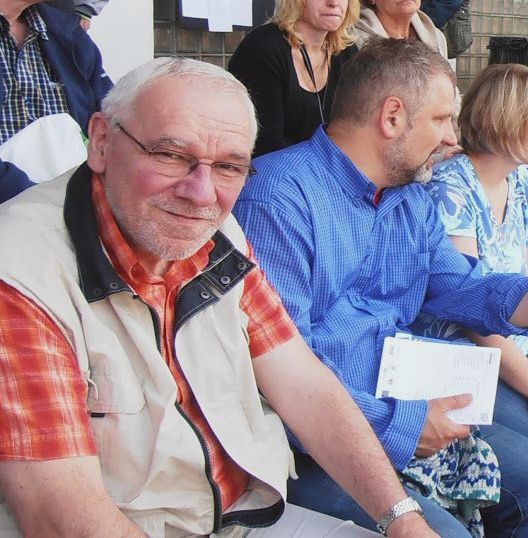
Oct 18, 2018 | Focolare Worldwide
The next event with the Friends of “Together for Europe” is going to be held in Prague, the land of the Hussites, the Prague Spring and the Velvet Revolution. The vast history of the Czech people will serve as the backdrop for the conversation among participants. It is a troubled history, marked by grand idealistic and spiritual re-awakenings and by a search for truth and justice that often ended in disappointment. Thus was the case of the three examples just mentioned: the Hussite Movement that began after the death of the priest Jan Hus, who was burned at the stake in 1415 and considered a martyr for the truth by his followers. Unfortunately, the wars that followed didn’t deal in truth, but in the lust for power and they completely devastated the country. Likewise, many centuries later, in 1968, the main actors in the Prague Spring, with the enthusiastic support of the whole country, wanted to install a Socialist regime with a human face, free of all the lies and cruelty of the recent past. Unfortunately, this hope was crushed under the wheels of armed tanks and ended in general resignation. Then came the Velvet Revolution in 1989, which many still remember. It was brought forward by its main protagonist, Vaclav Havel: “Love and the truth must win over the lies and the hate.” But no one expected the hard battle that followed: the spiritual values that were so strongly felt during the mass demonstrations in the public squares slowly dwindled as they were substituted with the pragmatism of the “technology of power.” The President of the Republic’s banner bears the words: “The Truth Wins.” However, two words were removed from the original version of that slogan: “The Truth of God Wins.” We’re sure that his truth will win before the end of the story.

Jiři Kratochvil
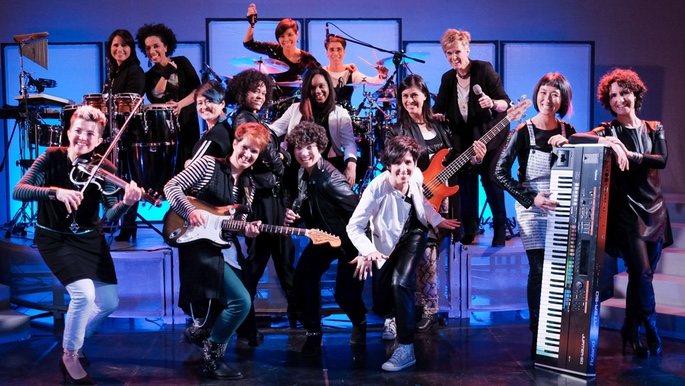
Oct 18, 2018 | Non categorizzato
 Rome: Partecipation in the event “Quando la Carità ti chiama”, (When Charity calls you), promoted by the Vincentian Family as part of the “Finding Vince 400” (FV400), International Film Festival. Auditorium Conciliazione. GenVerde Tours
Rome: Partecipation in the event “Quando la Carità ti chiama”, (When Charity calls you), promoted by the Vincentian Family as part of the “Finding Vince 400” (FV400), International Film Festival. Auditorium Conciliazione. GenVerde Tours
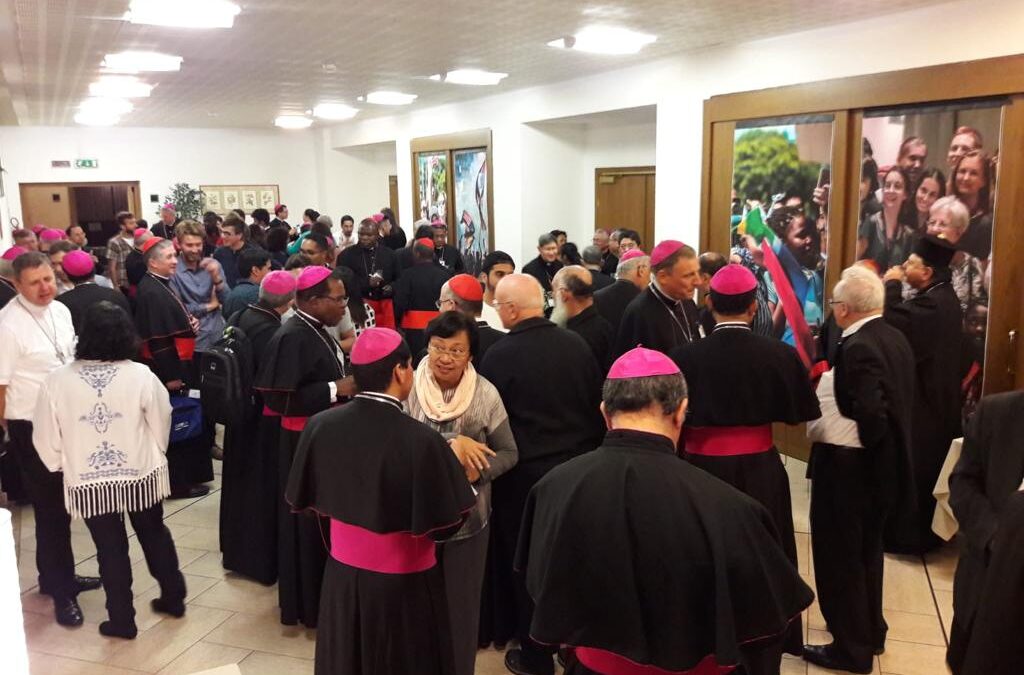
Oct 17, 2018 | Non categorizzato
Conversations in different languages could be heard amid the tastefully and simply set tables. For three evenings, the young people of the Focolare acted as hosts in a hall, close to where the works of the Synod will carry on up to 28 October. After a warm welcome, the three dinners revealed to be the right occasions for the exchange of ideas, informal sharing and mutual interaction. During dessert, there was a presentation of the recent international Genfest held in Manila and some experiences, and stories of commitment and coherence to boost closer contact with the synodal Fathers, in line with a meeting held a day earlier, where they express queries, uncertainties, choices, in the hope that the Synod would propose some answers. In the second soiree, František from Czechia took the floor. His words highlighted a genuine passion for politics and concrete commitment in view of the next European Parliament elections emerged with the request, “Please support me with your prayers, so that I may always be faithful to the choice of serving my people, without any personal interest.” A similar story came from Nicola. She is 33 and a pediatric therapist in a university hospital. “I engage in rare pathologies and pediatric insurgence, and therefore I am always in contact with situations often at the brink of death. The difficulty at times lies in communicating to the relatives, the prognosis and life expectancies of the child. In these moments, I entrust myself to God, so that he may help me find the right words and attitude. Cynical detachment is a due form of survival, but we mustn’t lose the human dimension. Every day for me is like a gym in which to love and serve God.” Then it was Nicola’s turn. “Practicing this profession – he explained – means living at the limit between faith and reason; in these years I have learned what suffering is, and what it means to live immobile on a bed, attached to the mechanical lung for breathing. At times my faith is harshly put to the test, but then I have no time to reflect, being ’forced’ to see to the people I have before me, and loving them. This is really a countenance of Jesus Forsaken. If I manage to welcome him poor and miserable as he is, this fills up the void. I have to face many situations. 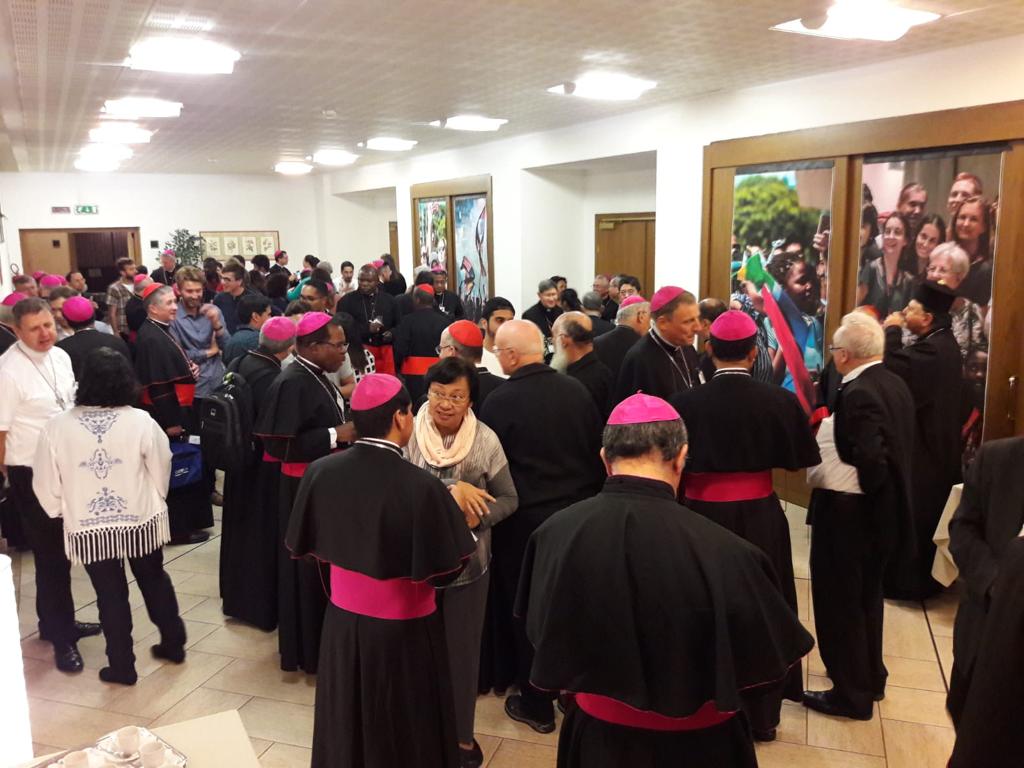 The families of the eastern countries are at times the most desperate since they do not have adequate healthcare systems, both from the economic and clinical standpoints that can help them. This is why they undertake hope journeys to our hospitals in search of treatments, which in some cases imply great expenses, given that these are issued only to Italian citizens. These situations lead us to reflect that at times, being born in one part of the world is just a matter of luck. It is in these cases that God reveals his grandeur and asks you to do the impossible. We certainly must not break the laws but we can try to help in other ways, for example, proposing strategies to limit at best the deformity of the joints, or trying to stand by and be of help.” Time had flown. It seemed like the guests did not wish to leave. The challenge of a deep and reciprocal listening between generations, the reason for the Synod itself, had also taken the form and consistency even in a dinner. And the dinner ended with the words of the song dedicated to Mary, the silent response of utmost love. By Chiara Favotti and Gustavo Clariá
The families of the eastern countries are at times the most desperate since they do not have adequate healthcare systems, both from the economic and clinical standpoints that can help them. This is why they undertake hope journeys to our hospitals in search of treatments, which in some cases imply great expenses, given that these are issued only to Italian citizens. These situations lead us to reflect that at times, being born in one part of the world is just a matter of luck. It is in these cases that God reveals his grandeur and asks you to do the impossible. We certainly must not break the laws but we can try to help in other ways, for example, proposing strategies to limit at best the deformity of the joints, or trying to stand by and be of help.” Time had flown. It seemed like the guests did not wish to leave. The challenge of a deep and reciprocal listening between generations, the reason for the Synod itself, had also taken the form and consistency even in a dinner. And the dinner ended with the words of the song dedicated to Mary, the silent response of utmost love. By Chiara Favotti and Gustavo Clariá
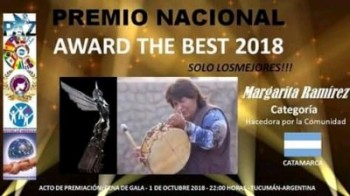
Oct 16, 2018 | Focolare Worldwide
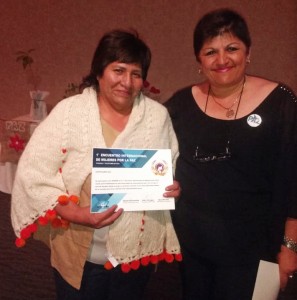 Many of our readers are familiar with the story of Margarita Ramirez De Moreno who comes from Santa Maria di Catamarca in the north east of Argentina. She is a descendent of Calchaquies Aborigines whose leader was Juan Calchaqui. These people were well known for their abilities in many forms of traditional crafts. Margarita certainly inherited an enterprising spirit and great talent in weaving from her ancestors. When she was young, she studied for a diploma at the “Aurora School” in her town: this institute is recognised by the Argentinian government for the outstanding contribution it makes to teaching about designs and traditional skills deriving from the “quechuan” culture. Later on in life, Margarita was unemployed but she did not give in to the personal challenges that she and many women like her faced but decided to open a spinning mill to provide thread for the looms in the school workshop. This enabled her to overcome discrimination and reclaim her cultural identity. On October 1st in Tucuman, Margarita received an award during the first international meeting of “Women for Peace” organised by the “World Federation of Grand Master Ladies”. This is an international association, found in many parts of the world that works with individuals, groups and foundations: its spirit facilitates women in establishing links of friendship, fraternity and support and enables them engage politically in initiatives promoting peace, security and protection.
Many of our readers are familiar with the story of Margarita Ramirez De Moreno who comes from Santa Maria di Catamarca in the north east of Argentina. She is a descendent of Calchaquies Aborigines whose leader was Juan Calchaqui. These people were well known for their abilities in many forms of traditional crafts. Margarita certainly inherited an enterprising spirit and great talent in weaving from her ancestors. When she was young, she studied for a diploma at the “Aurora School” in her town: this institute is recognised by the Argentinian government for the outstanding contribution it makes to teaching about designs and traditional skills deriving from the “quechuan” culture. Later on in life, Margarita was unemployed but she did not give in to the personal challenges that she and many women like her faced but decided to open a spinning mill to provide thread for the looms in the school workshop. This enabled her to overcome discrimination and reclaim her cultural identity. On October 1st in Tucuman, Margarita received an award during the first international meeting of “Women for Peace” organised by the “World Federation of Grand Master Ladies”. This is an international association, found in many parts of the world that works with individuals, groups and foundations: its spirit facilitates women in establishing links of friendship, fraternity and support and enables them engage politically in initiatives promoting peace, security and protection. 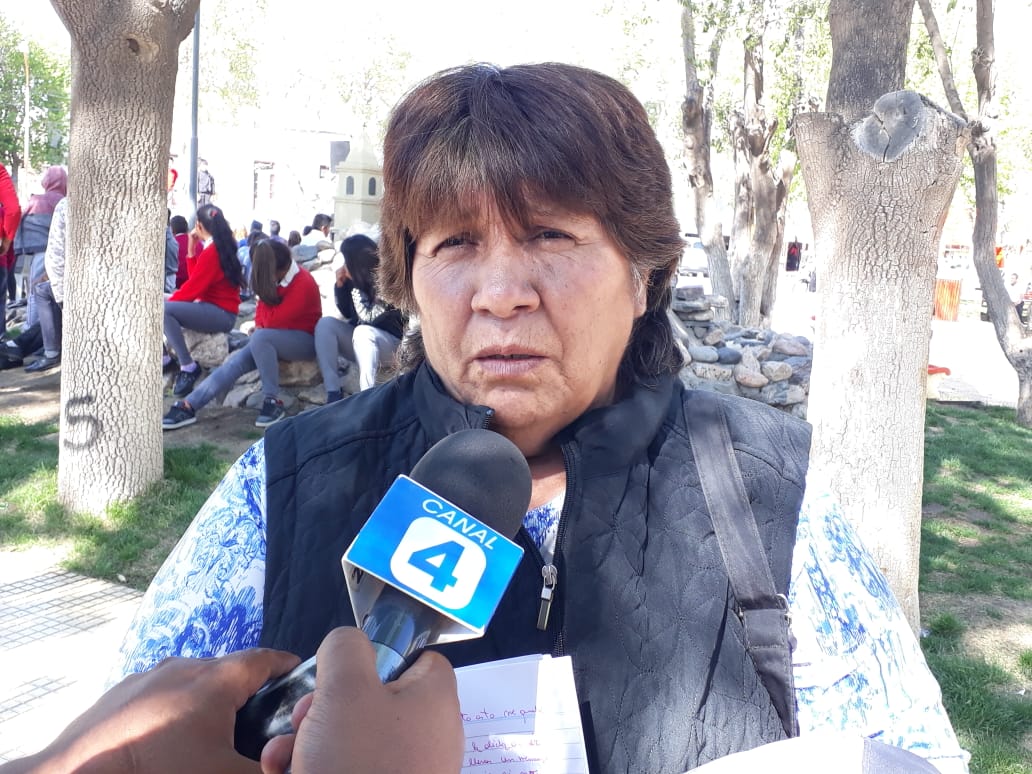 “There is no peace without justice and there is no justice without peace,” affirmed Mariela Martin Domenichelli, the co ordinator of the Latin American branch of the federation. “It’s important to listen to the women describing the situations in which they live so they can transform their ideas into political action that benefits the entire community.” The meeting wanted to showcase the positive contribution made by women in various fields of action. After the federation visited her area, Margarita was chosen as the person who symbolises the complete integration of women and the entire Aboriginal community to which they belong. Margarita – who now has seven children – said that it had not been easy to convince women in her area to work in spinning mills once again because they had suffered discrimination for so long. In addition, they had to walk long distances, crossing rivers to reach the mill because there was no transport. However, they gradually began to share the little they had: a bobbin, some wool or their skills in traditional crafts.
“There is no peace without justice and there is no justice without peace,” affirmed Mariela Martin Domenichelli, the co ordinator of the Latin American branch of the federation. “It’s important to listen to the women describing the situations in which they live so they can transform their ideas into political action that benefits the entire community.” The meeting wanted to showcase the positive contribution made by women in various fields of action. After the federation visited her area, Margarita was chosen as the person who symbolises the complete integration of women and the entire Aboriginal community to which they belong. Margarita – who now has seven children – said that it had not been easy to convince women in her area to work in spinning mills once again because they had suffered discrimination for so long. In addition, they had to walk long distances, crossing rivers to reach the mill because there was no transport. However, they gradually began to share the little they had: a bobbin, some wool or their skills in traditional crafts.  “The cost of machinery was a big problem,” Margarita said. “One day I was getting a lift and I told the driver about the difficulties we had. He told me that he knew how to make spinning machines and that we could pay him later, when we had the money. There were many difficulties but there were also signs that confirmed that what we were doing was right.” Margarita continued, “One day, when we were moving some fittings in the workshop, we found a picture of Mary, the Mother of God. This made a big impact on me and I felt that we should make a pact together to always love one another each day at work. We did this and soon after we received a donation that we used to buy better fittings and machinery.” We named our workshop “Tinku Kamayu” which in the local dialect means “Gathered together to work.” “We have found our identity and with that comes hope, growth, job opportunities for ourselves and others and the richness of our cultural origins. We feel we are useful – we don’t feel humiliated any longer. Other people appreciate us and want to hear our ideas.”
“The cost of machinery was a big problem,” Margarita said. “One day I was getting a lift and I told the driver about the difficulties we had. He told me that he knew how to make spinning machines and that we could pay him later, when we had the money. There were many difficulties but there were also signs that confirmed that what we were doing was right.” Margarita continued, “One day, when we were moving some fittings in the workshop, we found a picture of Mary, the Mother of God. This made a big impact on me and I felt that we should make a pact together to always love one another each day at work. We did this and soon after we received a donation that we used to buy better fittings and machinery.” We named our workshop “Tinku Kamayu” which in the local dialect means “Gathered together to work.” “We have found our identity and with that comes hope, growth, job opportunities for ourselves and others and the richness of our cultural origins. We feel we are useful – we don’t feel humiliated any longer. Other people appreciate us and want to hear our ideas.”
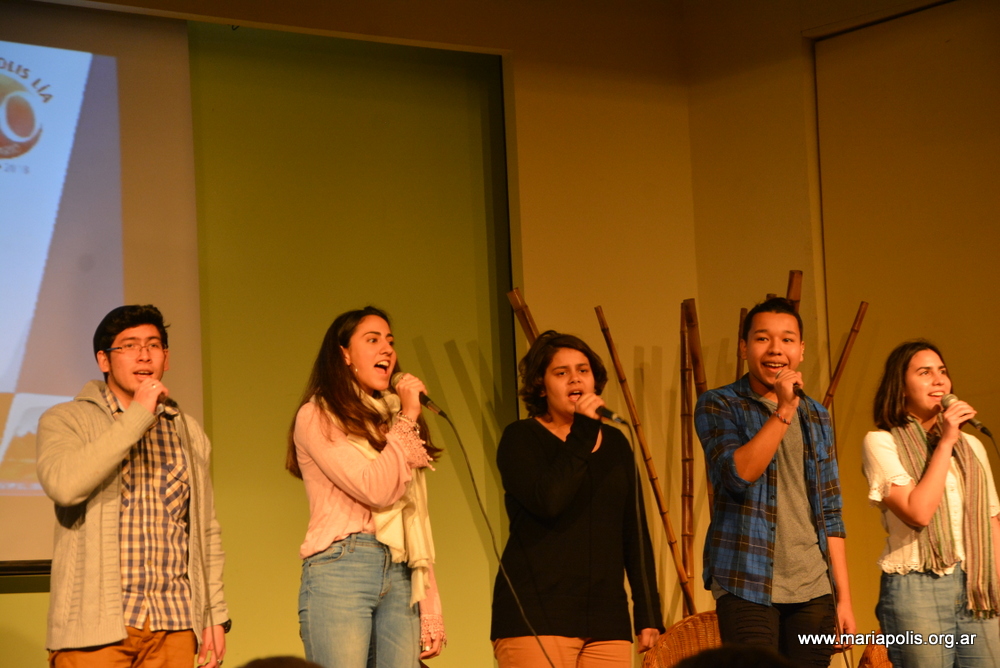
Oct 15, 2018 | Non categorizzato
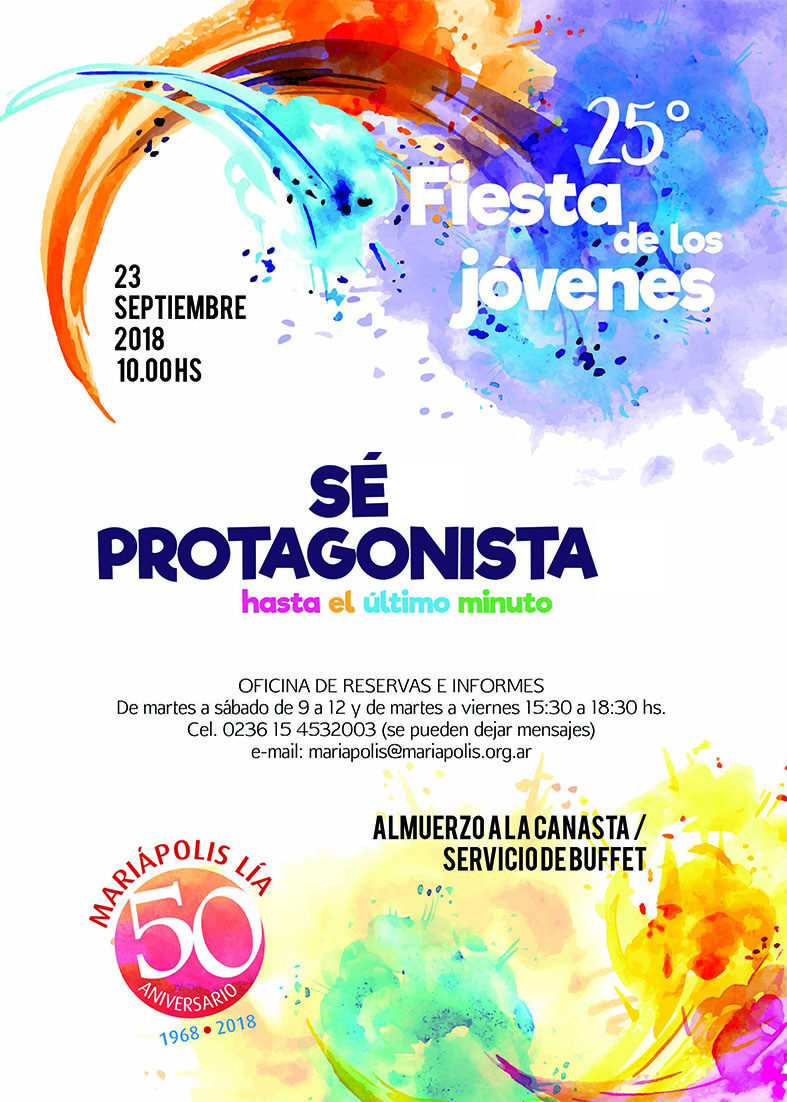 Argentina, Mariapolis Lia. 800 young people learning how to take lead roles, not only in drama but in real life. In the Argentine Pampas, the Focolare town Mariapolis Lia – named after Lia Brunet, a pioneer of the Focolare Movement in South America – is not slowing down after celebrating the 50th anniversary of its foundation in July. It launched an invitation over a spring weekend in September for young people to take the lead in their own lives “right to the last moment”. «This expression – explained a Mariapolis Lia resident – is inspired by Guillermo Curti, a Focolarino priest who died suddenly early in the year and who was for us a model of faithfulness and of love right to his last moment». The weekend of 22nd-23rd September saw the arrival of 800 young people from Paraguay, Uruguay and Argentina. «On the first day, we worked together in groups according to our countries of origin in order to prepare stands across the whole little town which showcased our own cultures and helped us all to get to know each other on a personal level. In the evening we put on a wonderful show of dance and performances reflecting our different folkloristic traditions. All of us young people found ourselves taking the lead in the preparation of the second day, Sunday, when more young people arrived from different regions of Argentina».
Argentina, Mariapolis Lia. 800 young people learning how to take lead roles, not only in drama but in real life. In the Argentine Pampas, the Focolare town Mariapolis Lia – named after Lia Brunet, a pioneer of the Focolare Movement in South America – is not slowing down after celebrating the 50th anniversary of its foundation in July. It launched an invitation over a spring weekend in September for young people to take the lead in their own lives “right to the last moment”. «This expression – explained a Mariapolis Lia resident – is inspired by Guillermo Curti, a Focolarino priest who died suddenly early in the year and who was for us a model of faithfulness and of love right to his last moment». The weekend of 22nd-23rd September saw the arrival of 800 young people from Paraguay, Uruguay and Argentina. «On the first day, we worked together in groups according to our countries of origin in order to prepare stands across the whole little town which showcased our own cultures and helped us all to get to know each other on a personal level. In the evening we put on a wonderful show of dance and performances reflecting our different folkloristic traditions. All of us young people found ourselves taking the lead in the preparation of the second day, Sunday, when more young people arrived from different regions of Argentina».  For Sunday’s programme, the Mariapolis was transformed into a cinema set, ready to start filming various movies set in five different eras (the 70s, 80s, 90s, 2000s and 2010s), in a range of genres, ranging from horror to musical, drama to science fiction. «The five decades represented the fiftieth anniversary of the Mariapolis town – they explained. Each film explored, through experiences and life stories, at least one of the challenges faced by young people today: forms of dependency, consumerism, life choices, social and mass media». To conclude, an award ceremony along with speeches in front of a live audience in the Mariapolis town, with another 200 groups following on a live link and thousands more viewing online over the following days. «What emerged as the weekend came to a close was an all pervasive sense of joy. Together we had faced up to many difficulties and shared a deep experience of unity which changed us. We experienced it as the presence of Jesus among us». As hundreds of young people travelled home in many directions, for those who remained in the Mariapolis Lia, the celebration continued with a shared supper and more singing and dancing, to express their joy at such an inspiring experience lived together.
For Sunday’s programme, the Mariapolis was transformed into a cinema set, ready to start filming various movies set in five different eras (the 70s, 80s, 90s, 2000s and 2010s), in a range of genres, ranging from horror to musical, drama to science fiction. «The five decades represented the fiftieth anniversary of the Mariapolis town – they explained. Each film explored, through experiences and life stories, at least one of the challenges faced by young people today: forms of dependency, consumerism, life choices, social and mass media». To conclude, an award ceremony along with speeches in front of a live audience in the Mariapolis town, with another 200 groups following on a live link and thousands more viewing online over the following days. «What emerged as the weekend came to a close was an all pervasive sense of joy. Together we had faced up to many difficulties and shared a deep experience of unity which changed us. We experienced it as the presence of Jesus among us». As hundreds of young people travelled home in many directions, for those who remained in the Mariapolis Lia, the celebration continued with a shared supper and more singing and dancing, to express their joy at such an inspiring experience lived together.
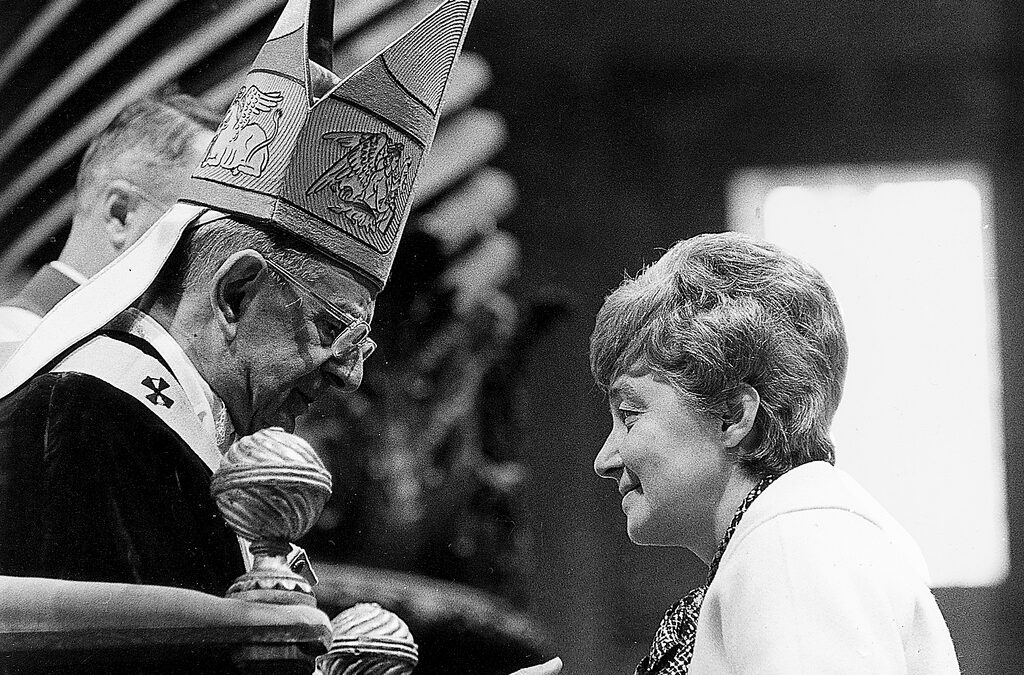
Oct 14, 2018 | Focolare Worldwide
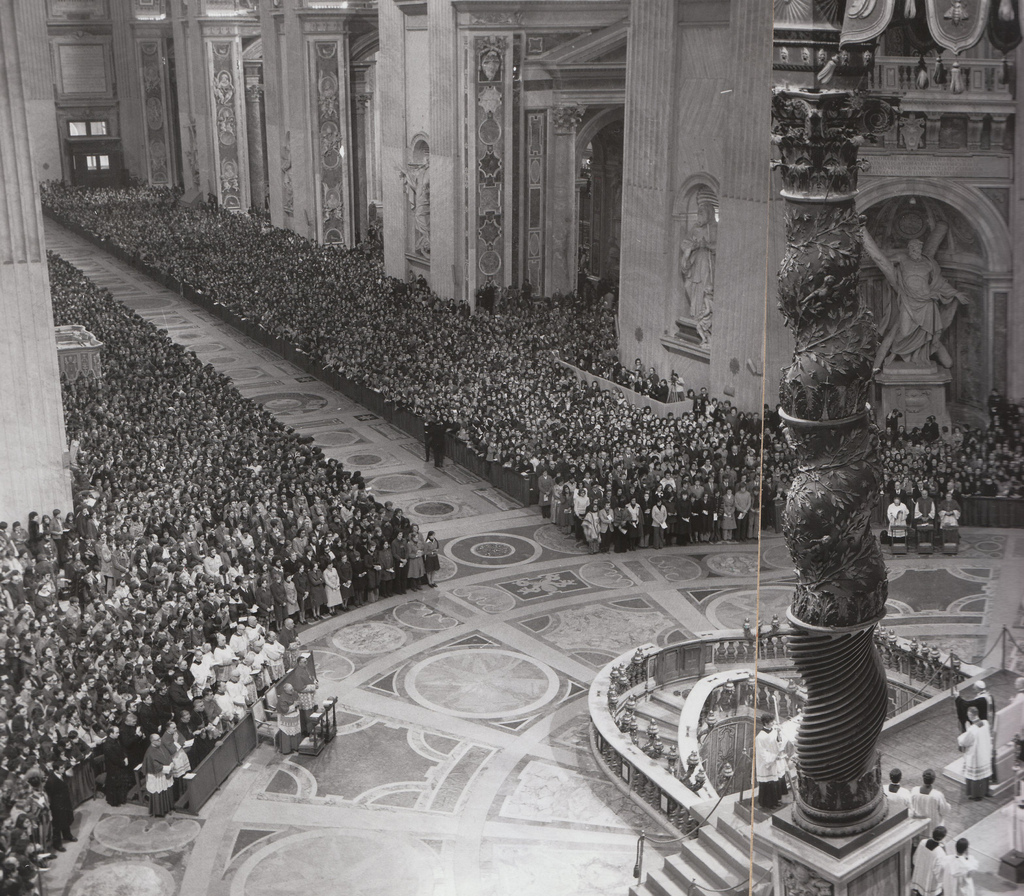 “YOUNG GEN! We welcome you with great joy as sons and daughters, brothers and sisters, friends! […] To search is really part of being a young person. Once the eyes of consciousness have opened on the world around us, curiosity is aroused in the souls of young people: they want to know, they want to try above anything else, and they want to attempt. Search, but for what? […] You, the young people of our times, you already have a negative answer, an almost rebellious answer in your hearts: we don’t want, you say, a world that presents itself to use like this! It’s a strange phenomenon: a world that offers you the most beautiful, the most perfect, the most enjoyable fruits of contemporary civilisation, doesn’t satisfy you, doesn’t please you. You benefit from the achievements, the comforts, the wonders placed at your disposal by modern progress. Yet a sense of criticism, protest and even nausea stops your search in this direction. This is a direction that takes you out of yourselves, an alienation because at the basis, it is a materialistic, hedonistic and selfish direction. It does not fully satisfy the soul. It does not completely resolve the important and personal problems of life. […] You have made a different choice. This is why you are called Gen, new generation. It is before all else a liberating choice, liberating from the passive conformism that affects so many young people of our times… At the basis of your psychology is a personal and sovereign act of free determination. The choice of Christ. […] Jesus Christ has crossed your path; and this is why you are here. Yes, the meeting with Him, Jesus Christ. But who is Jesus Christ? What an infinite question! […] Well: first, in Himself, Christ is the word of God made man; Christ is for us the Saviour of humanity. Two oceans: the Jesus Christ’s divinity, and Jesus Christ’s mission in the world. […] It seems to us that you, Focolarini, have faced this dual problem: Who is He, Christ? And Who is He, Christ, for us? And now the fire of light, enthusiasm, action, the gift of self and joy has been lit within you, and with a newfound inner fullness you have understood everything, God, yourselves, your life, people, our times, the central direction to take for the whole of your existence. Yes, this is the solution, this is the key, this is the formula, ancient and eternal, and when it is discovered, new. You have intuited it, and you have, rightfully, given your movement the definition of ‘New Generation’, Gen!
“YOUNG GEN! We welcome you with great joy as sons and daughters, brothers and sisters, friends! […] To search is really part of being a young person. Once the eyes of consciousness have opened on the world around us, curiosity is aroused in the souls of young people: they want to know, they want to try above anything else, and they want to attempt. Search, but for what? […] You, the young people of our times, you already have a negative answer, an almost rebellious answer in your hearts: we don’t want, you say, a world that presents itself to use like this! It’s a strange phenomenon: a world that offers you the most beautiful, the most perfect, the most enjoyable fruits of contemporary civilisation, doesn’t satisfy you, doesn’t please you. You benefit from the achievements, the comforts, the wonders placed at your disposal by modern progress. Yet a sense of criticism, protest and even nausea stops your search in this direction. This is a direction that takes you out of yourselves, an alienation because at the basis, it is a materialistic, hedonistic and selfish direction. It does not fully satisfy the soul. It does not completely resolve the important and personal problems of life. […] You have made a different choice. This is why you are called Gen, new generation. It is before all else a liberating choice, liberating from the passive conformism that affects so many young people of our times… At the basis of your psychology is a personal and sovereign act of free determination. The choice of Christ. […] Jesus Christ has crossed your path; and this is why you are here. Yes, the meeting with Him, Jesus Christ. But who is Jesus Christ? What an infinite question! […] Well: first, in Himself, Christ is the word of God made man; Christ is for us the Saviour of humanity. Two oceans: the Jesus Christ’s divinity, and Jesus Christ’s mission in the world. […] It seems to us that you, Focolarini, have faced this dual problem: Who is He, Christ? And Who is He, Christ, for us? And now the fire of light, enthusiasm, action, the gift of self and joy has been lit within you, and with a newfound inner fullness you have understood everything, God, yourselves, your life, people, our times, the central direction to take for the whole of your existence. Yes, this is the solution, this is the key, this is the formula, ancient and eternal, and when it is discovered, new. You have intuited it, and you have, rightfully, given your movement the definition of ‘New Generation’, Gen! 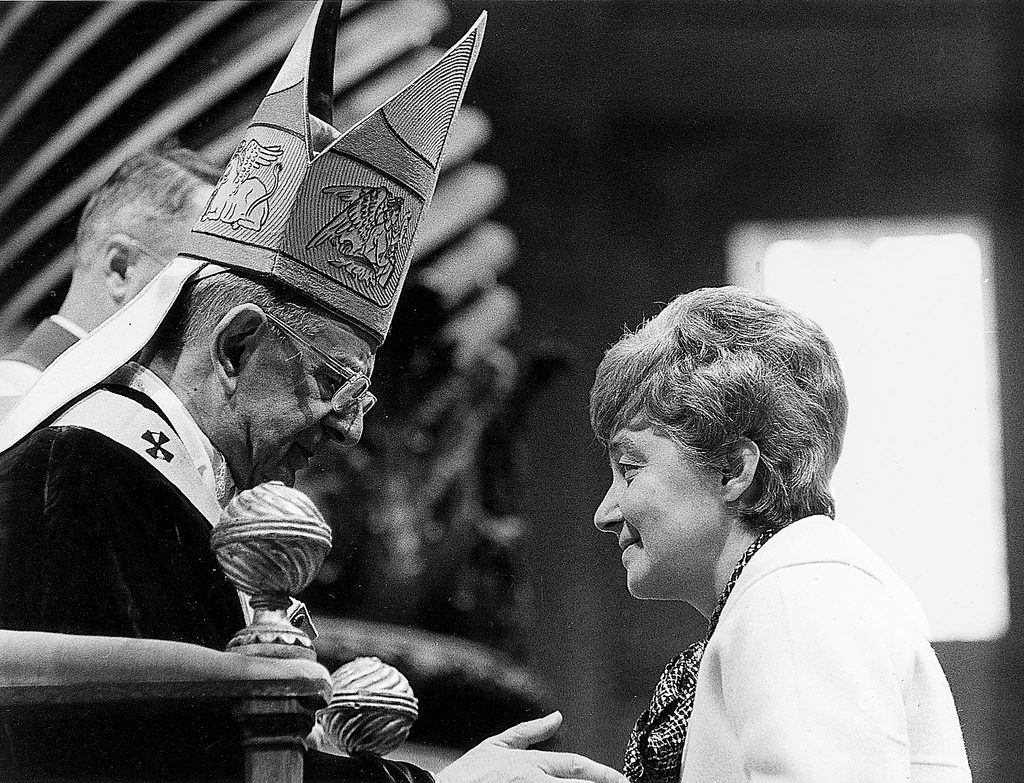 So, dear Young Gen! Encounter, know, love, follow Jesus Christ! This is your program. This is the synthesis of your spirituality which you, by celebrating the Jubilee of the Holy Year, wish to reaffirm in your consciences and translate into life. With two conclusions. The first, in order to condense the secret of your Movement in a central and mature thought try always to have Jesus as Teacher. And then the second conclusion, that we likewise listen to the words spoken by Jesus the Teacher: ‘You are all brothers and sisters’. Have the wisdom and courage to reach this conclusion which is the root of Christian social teaching. It is often disconcerting to observe how many claiming to be those who follow the Gospel are incapable of deducing from the Gospel itself a social teaching based on love. […] You, the new Generation, are faithful and coherent. If you have chosen Christ as your Master, have faith in Him and in the Church which leads and presents Him to you. Demonstrate with actions the realizing force of charity and social love, established by the Master. It will be an experience, yes, a new one, one which generates a better and more just world. It will be a strong experience; demanding resistance, sacrifice, maybe even heroism; it will demand that you too are the robust and willing Cyrenians who offer their own backs to support the Cross of Jesus. Yes, you should also suffer with Him, as Him, for Him! But do not be afraid, Gen! Be sure! You will have operated your salvation and that of our modern world. And just as you are today, you will always be good and happy!”
So, dear Young Gen! Encounter, know, love, follow Jesus Christ! This is your program. This is the synthesis of your spirituality which you, by celebrating the Jubilee of the Holy Year, wish to reaffirm in your consciences and translate into life. With two conclusions. The first, in order to condense the secret of your Movement in a central and mature thought try always to have Jesus as Teacher. And then the second conclusion, that we likewise listen to the words spoken by Jesus the Teacher: ‘You are all brothers and sisters’. Have the wisdom and courage to reach this conclusion which is the root of Christian social teaching. It is often disconcerting to observe how many claiming to be those who follow the Gospel are incapable of deducing from the Gospel itself a social teaching based on love. […] You, the new Generation, are faithful and coherent. If you have chosen Christ as your Master, have faith in Him and in the Church which leads and presents Him to you. Demonstrate with actions the realizing force of charity and social love, established by the Master. It will be an experience, yes, a new one, one which generates a better and more just world. It will be a strong experience; demanding resistance, sacrifice, maybe even heroism; it will demand that you too are the robust and willing Cyrenians who offer their own backs to support the Cross of Jesus. Yes, you should also suffer with Him, as Him, for Him! But do not be afraid, Gen! Be sure! You will have operated your salvation and that of our modern world. And just as you are today, you will always be good and happy!”
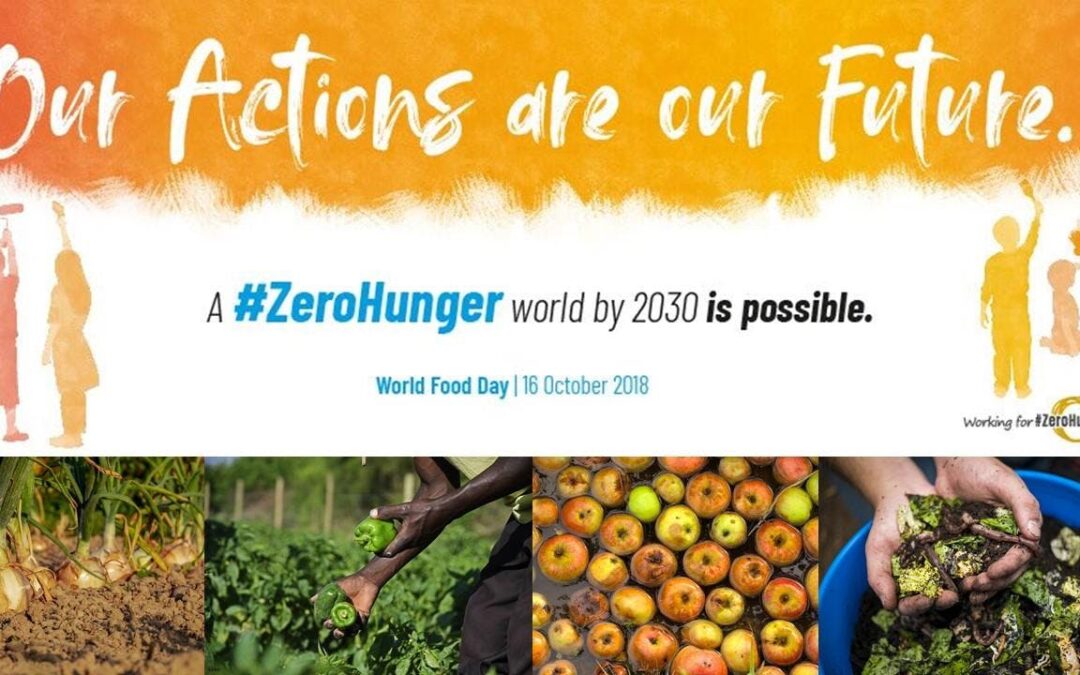
Oct 14, 2018 | Non categorizzato
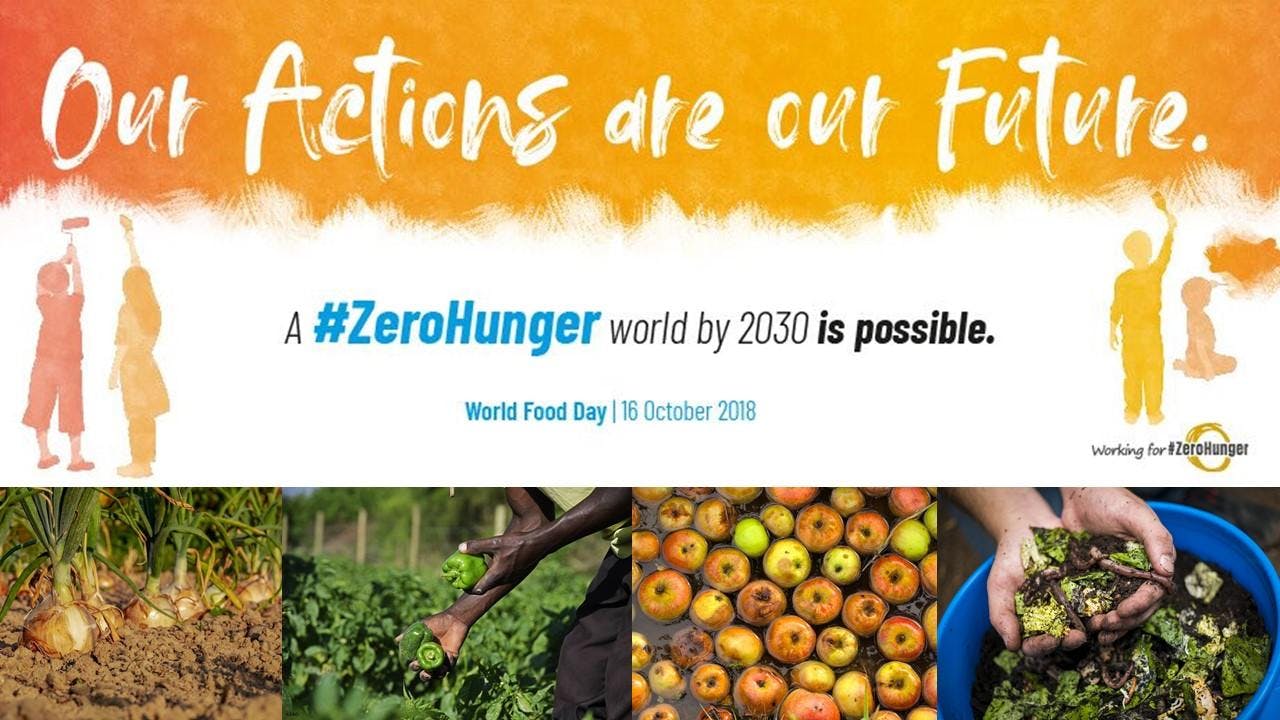 The theme of this year’s World Food Day is “Our actions are our future.” The event is held every year on October 16 by the Food and Agriculture Organisation (FAO). The day involves international organisations along with civil institutes, schools, businesses, media, research organisations and institutions in a rich program of events and public demonstrations to sensitize public opinion on topics such as poverty, hunger and malnutrition in favour of arriving at Zero Hunger, which is included among the objectives for the United Nations 2030 agenda. The teenagers of the Focolare Movement included it as one of the central points of their training and action during the whole year. Last June, a delegation of teenagers took part in a discussion at the International Headquarters of the FAO of Rome, Italy and received a “Zero Hunger Citizen” passport. The held projects around the world to raise awareness among peers and adults and dedicated the 2/2018 edition of the bi-monthly magazine “Teens” (Citta Nuova).
The theme of this year’s World Food Day is “Our actions are our future.” The event is held every year on October 16 by the Food and Agriculture Organisation (FAO). The day involves international organisations along with civil institutes, schools, businesses, media, research organisations and institutions in a rich program of events and public demonstrations to sensitize public opinion on topics such as poverty, hunger and malnutrition in favour of arriving at Zero Hunger, which is included among the objectives for the United Nations 2030 agenda. The teenagers of the Focolare Movement included it as one of the central points of their training and action during the whole year. Last June, a delegation of teenagers took part in a discussion at the International Headquarters of the FAO of Rome, Italy and received a “Zero Hunger Citizen” passport. The held projects around the world to raise awareness among peers and adults and dedicated the 2/2018 edition of the bi-monthly magazine “Teens” (Citta Nuova).
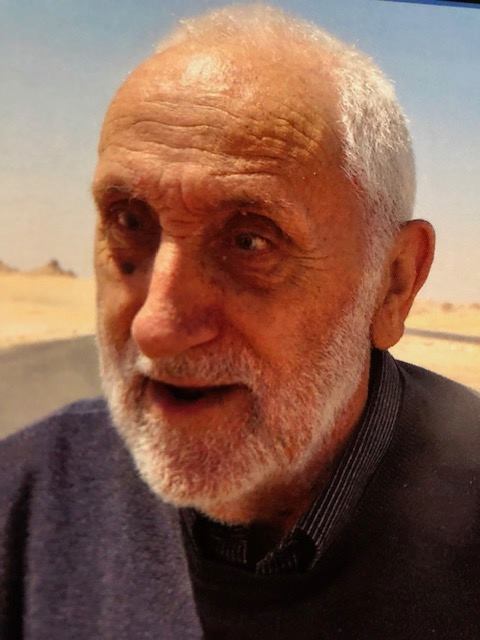
Oct 14, 2018 | Non categorizzato
 On 13 October, Ruggero Badano, father of Chiara Luce passed away at the age of 83. A good man with a simple and strong faith, together with his wife, Maria Teresa, he had witnessed the extraordinary human and spiritual experience which had led their daughter to be declared “Blessed” on 25 September 2010. “I thank Jesus for having sent you in our midst in this Journey which shall never end,” she had written on her 18th birthday. The Focolare Movement conveys its solidarity with Maria Teresa, the members of the Chiara Badano Foundation and all the friends of Blessed Chiara Badano, with immense gratitude for Ruggero’s exemplary life. For info: www.chiarabadano.org
On 13 October, Ruggero Badano, father of Chiara Luce passed away at the age of 83. A good man with a simple and strong faith, together with his wife, Maria Teresa, he had witnessed the extraordinary human and spiritual experience which had led their daughter to be declared “Blessed” on 25 September 2010. “I thank Jesus for having sent you in our midst in this Journey which shall never end,” she had written on her 18th birthday. The Focolare Movement conveys its solidarity with Maria Teresa, the members of the Chiara Badano Foundation and all the friends of Blessed Chiara Badano, with immense gratitude for Ruggero’s exemplary life. For info: www.chiarabadano.org
Oct 12, 2018 | Non categorizzato
Women can symbolize today’s civilization. In magazines and movie screens, in advertising and art, they reign like queens. Yet it is easy to see their royalty as artificial: divas who hold court today are forgotten tomorrow. In contrast, from this perspective the biographies of Christianity’s greatest female saints and their teachings once again become current. Teresa, the reformer of Carmel during the Protestant revolution, under the suspicious gaze of the kings and lords of Spain, faced with the threat of the Inquisition in her country, achieved her freedom through poverty. It is the unique freedom of God’s children. She remade her existence into an eminent adventure to overcome human with divine. She brought beauty, the poetry of holiness, back to the center of our individual and social existence. At the time there was a form of self-righteousness that you might just as well have called misogyny. Catherine of Siena had already suffered it and had been silenced because she was a woman – she who never stopped urging men, including the high and mighty, to not behave like little girls. St. Teresa gave herself entirely to God and inspired other women to do so. The obsession of our modern days lies in a continuous, frenetic demand for recognition and riches. Teresa taught us to free ourselves from this slavery and recover our serenity and peace. In her writings she explains her reasons with evidence, a light that enchants souls – even those of men today who are in the clutches of business. She is a strong woman who speaks only to serve God with energy and perseverance. She knew of the influence that a woman consecrated to God can have on society. Her life and writings demonstrate the essence of the Gospel revolution, in our hearts and in the people, uncovering yet again the essentials of love that, through our neighbors, opens access to God. It puts God in the spirit, in the law, in institutions, in customs. Teresa, with the grace of a mother and teacher, taught to speak continuously with God, a conversation that everyone can carry out within the temple of their souls, even while on the road, even surrounded by noise. I believe that day after day the number of women and men who are guided by Teresa’s wisdom will increase. They will rediscover their reason for being, going back with her to the source. Action will blossom more and more from contemplation. Yet here – we could say with the saint – Martha and Mary almost always align, since the interior works on the exterior … When exterior works come from these roots, there are admirable, sweetly scented flowers that blossom from the tree of divine love. Teresa was a courageous astronaut of the divine, as well as also a practical woman who knew the world. And because she knew the world, she stood out in heaven. If her teachings were to expand even to our own homes, unions, politics, factories and the world, it would become a sort of Carmel, where Teresa took on the feminine royalty of she who was blessed among women. Igino Giordani, Fides, n.7–12, 1962, pp.185–187.
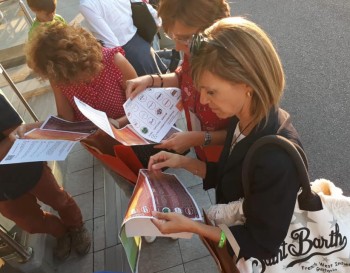
Oct 11, 2018 | Focolare Worldwide
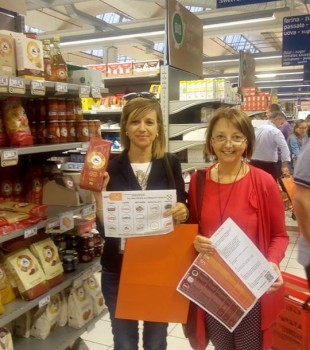 Put the heads of a group of teenagers together having taken part in the recent annual workshop in Loppiano, and one keyword emerges: “participation.” In view of this, the Youth Section of the Economy of Communion (EoC) launched on the social network and among their friends a workshop called “Inside the LABel.” At the conclusion of the day which the Bonfanti Industrial Park had dedicated to the topics of economy and work, the participants left the meeting hall and the filled cars that were waiting to take them to the nearby Coop Supermarket in the town of Figline. A table was set up at the entrance of the superstore along with ballot boxes. Then, an innovative experiment began that lasted for two hours, a genuine voting campaign. The five candidates were: pasta, coffee, chocolate, canned tuna and oranges. “But what does democracy have to do with a supermarket?” someone asked. “It does, it has a lot to do…” said one of the organizers named Chiara. “Using our wallets, we exert our “buying power.” The “vote with our wallet” is just one example of civil responsibility. Whenever we buy a product we express a preference, we support the work of a business that produces the product, a particular business model, a mission, a series of internal processes, a certain type of managing of relationships with employees and providers, a certain type of impact on the environment.” “After a meeting with Luigino Buni on the relationship between democracy and market,” says Stefania, “we worked for nearly three months examining the ‘vision’ and ‘mission’ of small and large brands at around 20 businesses. Following indicators such as transparency, production chain, respect for the environment, social responsibility, corporate form and legal record, we gathered data and information that were published on the web.”
Put the heads of a group of teenagers together having taken part in the recent annual workshop in Loppiano, and one keyword emerges: “participation.” In view of this, the Youth Section of the Economy of Communion (EoC) launched on the social network and among their friends a workshop called “Inside the LABel.” At the conclusion of the day which the Bonfanti Industrial Park had dedicated to the topics of economy and work, the participants left the meeting hall and the filled cars that were waiting to take them to the nearby Coop Supermarket in the town of Figline. A table was set up at the entrance of the superstore along with ballot boxes. Then, an innovative experiment began that lasted for two hours, a genuine voting campaign. The five candidates were: pasta, coffee, chocolate, canned tuna and oranges. “But what does democracy have to do with a supermarket?” someone asked. “It does, it has a lot to do…” said one of the organizers named Chiara. “Using our wallets, we exert our “buying power.” The “vote with our wallet” is just one example of civil responsibility. Whenever we buy a product we express a preference, we support the work of a business that produces the product, a particular business model, a mission, a series of internal processes, a certain type of managing of relationships with employees and providers, a certain type of impact on the environment.” “After a meeting with Luigino Buni on the relationship between democracy and market,” says Stefania, “we worked for nearly three months examining the ‘vision’ and ‘mission’ of small and large brands at around 20 businesses. Following indicators such as transparency, production chain, respect for the environment, social responsibility, corporate form and legal record, we gathered data and information that were published on the web.” 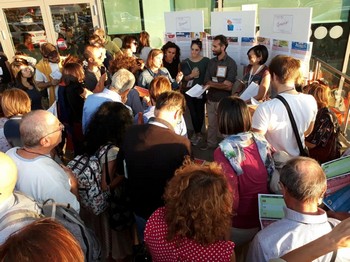 “It was an interesting and enriching challenge,” continues Francesca, “which revealed a complexity of ethics, values and conventions that influence our daily purchases. As we moved ahead and our awareness increased, we came up with a project that we could share. The role of civil responsibility, being critical consumers and becoming aware that one’s own purchases, can influence the behaviour of large and small businesses. This is why we came up with a project that we call “Inside the Label.” This year’s LoppianoLab seemed like the opportunity to present it.” Andrea interrupts: “Based on the materials that were collected, we chose three products from different brands for each category, trying to highlight the nuances in terms of transparency, pricing, commitment and quality. We left it to the participants to choose the products they would buy, after having shared with them the tools for reading the labels also for “moral calories” and “ethical sugars.” It was a project that took nothing for granted, but stuck to reality.
“It was an interesting and enriching challenge,” continues Francesca, “which revealed a complexity of ethics, values and conventions that influence our daily purchases. As we moved ahead and our awareness increased, we came up with a project that we could share. The role of civil responsibility, being critical consumers and becoming aware that one’s own purchases, can influence the behaviour of large and small businesses. This is why we came up with a project that we call “Inside the Label.” This year’s LoppianoLab seemed like the opportunity to present it.” Andrea interrupts: “Based on the materials that were collected, we chose three products from different brands for each category, trying to highlight the nuances in terms of transparency, pricing, commitment and quality. We left it to the participants to choose the products they would buy, after having shared with them the tools for reading the labels also for “moral calories” and “ethical sugars.” It was a project that took nothing for granted, but stuck to reality.  Like every respectable voting campaign, the votes are anticipated by a talk show prepared and broadcast by the organizers at the entrance of the Coop. Each of them presents his or her own candidate, along with comments from a citizen-consumer. Then, the participants are provided with a shopping sack, a voting card and the addresses of a web site which was created for the occasion. The aisles of the Co-op, with its usual Saturday family shoppers, were also filled with shoppers who were carefully re-reading labels. After paying the cashier, the final democratic duty of political responsibility was to mark an “X” beside the products one had chosen and to drop it into the ballot box. Then there were interviews, photos, surveys and data collection. There were more than a hundred voters, but far many more things to think about. In the meantime, the Italian Constituent of the EoC is already planning a second “Inside the LABel” event at Castel Gandolfo, Italy, on the occasion of the International Prophetic Economy Event (November 2-4). Deep down, we’re all change-makers. Source: EdC online
Like every respectable voting campaign, the votes are anticipated by a talk show prepared and broadcast by the organizers at the entrance of the Coop. Each of them presents his or her own candidate, along with comments from a citizen-consumer. Then, the participants are provided with a shopping sack, a voting card and the addresses of a web site which was created for the occasion. The aisles of the Co-op, with its usual Saturday family shoppers, were also filled with shoppers who were carefully re-reading labels. After paying the cashier, the final democratic duty of political responsibility was to mark an “X” beside the products one had chosen and to drop it into the ballot box. Then there were interviews, photos, surveys and data collection. There were more than a hundred voters, but far many more things to think about. In the meantime, the Italian Constituent of the EoC is already planning a second “Inside the LABel” event at Castel Gandolfo, Italy, on the occasion of the International Prophetic Economy Event (November 2-4). Deep down, we’re all change-makers. Source: EdC online
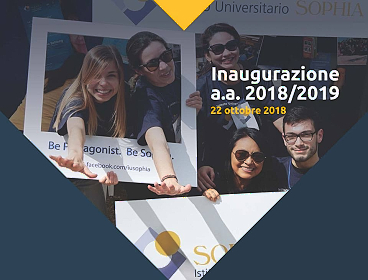
Oct 11, 2018 | Focolare Worldwide
 Sophia University Institute of Loppiano will celebrate the opening of the 11th academic year on October 22, 2018, at 17:00 in the Auditorium. Following the greetings from the Grand Chancellor, Cardinal Giuseppe Betori, Archbishop of Florence, Italy; Vice-Grand Chancellor Dr Maria Voce, president of the Work of Mary; and Dr Egidio Sgulloni, president of the Foundation for Sophia, there will be a panel discussion “On the net: Sophia and the University of Perugia,” with interventions by Dr Piero Coda, president of Sophia University Institute, Dr Franco Moriconi, Grand Rector of the Universty of Perugia Studies, and of Dr Mary Elisabeth Trini, double graduate with a double title IU Sophia-University of Perugia. It will conclude with a roundtable titled “The Challenge of Fraternity In Politics and Law,” with a presentation by the “Sophia Center for Researcih on Politics and Human Rights.” Professors Antonio Maria Baggio (IUS), Adriana Cosseddu (University of Sassari) and Antonio Marques Prieto (University of Malaga) will also make presentations.
Sophia University Institute of Loppiano will celebrate the opening of the 11th academic year on October 22, 2018, at 17:00 in the Auditorium. Following the greetings from the Grand Chancellor, Cardinal Giuseppe Betori, Archbishop of Florence, Italy; Vice-Grand Chancellor Dr Maria Voce, president of the Work of Mary; and Dr Egidio Sgulloni, president of the Foundation for Sophia, there will be a panel discussion “On the net: Sophia and the University of Perugia,” with interventions by Dr Piero Coda, president of Sophia University Institute, Dr Franco Moriconi, Grand Rector of the Universty of Perugia Studies, and of Dr Mary Elisabeth Trini, double graduate with a double title IU Sophia-University of Perugia. It will conclude with a roundtable titled “The Challenge of Fraternity In Politics and Law,” with a presentation by the “Sophia Center for Researcih on Politics and Human Rights.” Professors Antonio Maria Baggio (IUS), Adriana Cosseddu (University of Sassari) and Antonio Marques Prieto (University of Malaga) will also make presentations.
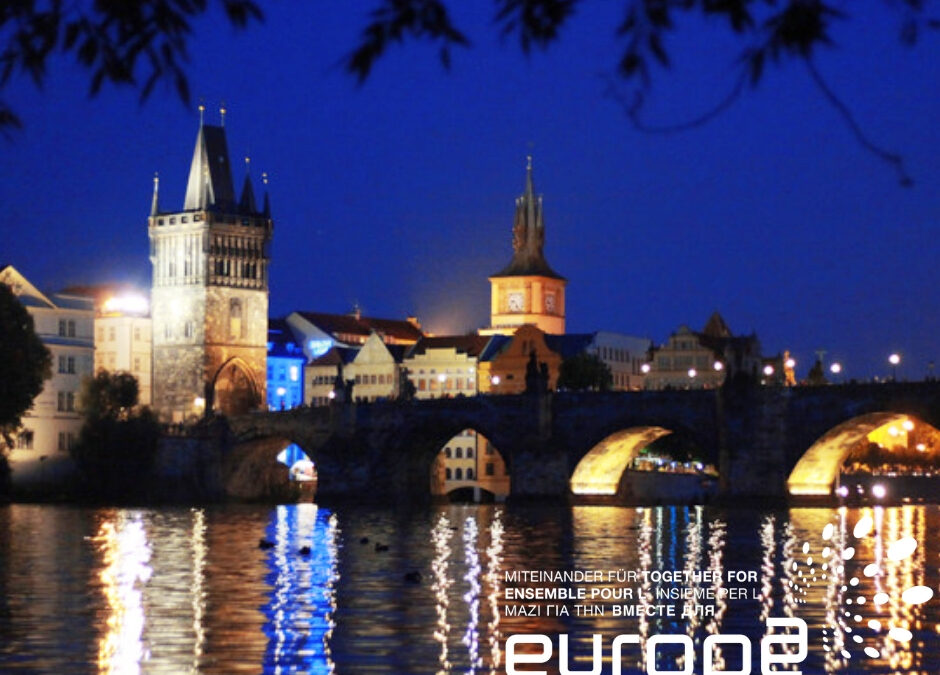
Oct 10, 2018 | Focolare Worldwide
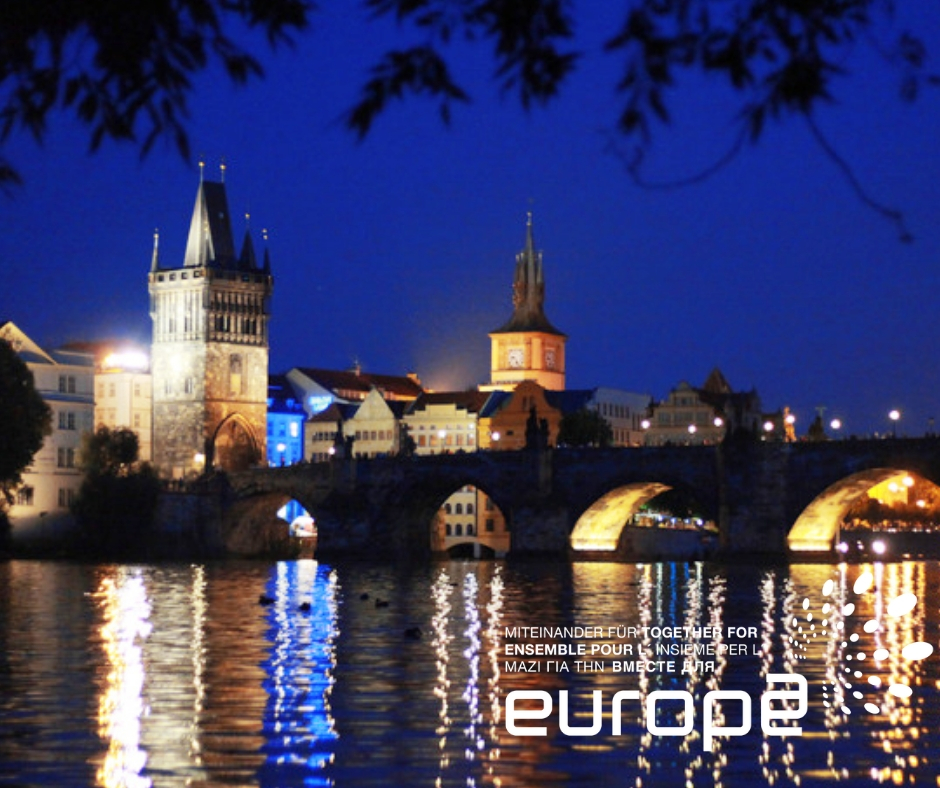 The great history of Central Europe, in particular of the Czech nation will serve as a backdrop for a new stage in the journey of Together for Europe, which promotes dialogue between divergent cultural and political identities. In November 2017 the European meeting of Friends of Together for Europe took place in Vienna, a bridge between Eastern and Western Europe. This year, we will have the opportunity to take another step to the very heart of Central Eastern Europe – Prague, with a singular desire to face challenges, prejudices and fears which weigh on the collective conscience of EU member states and beyond. Through the life of the Gospel, nourished and enlightened by the presence of Christ in the Christian communities, we wish to witness to the fact that the path towards Europe as a House of Nations and a Family of Peoples is not a utopia. The enduring legacy of the “Velvet Revolution” On 17th November, the Czech Republic commemorates the anniversary of the “Velvet Revolution” (so called due to its peaceful nature) which transformed the Czech Republic into a co-protagonist for the ongoing process of European reunification. The presence of the Friends of Together for Europe in Prague on this very day, urges us to renew our shared commitment: to bring to a post-secular culture the spirit of Christian Humanism, and in so doing contribute to building a more united Europe. The renowned Czech Philosopher and Theologian Tomas Halik, friend of the late Vaclav Havel, Jaroslav Sebek of the Historical Czech Academy of Science, and Pavel Fischer an emerging Czech politician, together with leaders and representatives of different Movements, Communities and Associations will be present. Their contributions will reinforce the daring objective of this meeting: to recall a Europe of hope and promise, a Europe which stems from a rich heritage of ethnic, social and cultural diversity and calls out for communion and dialogue. In this way, the Prague event will become a fundamental phase of Together for Europe which continues its commitment for a more united, brotherly and just Europe. It will also be a unique opportunity to prepare together for the upcoming elections for the European Parliament. The meeting will conclude with an open evening, in which Movements and Communities from different churches and which are present in the Czech Republic will be represented. Address: Mariapolis Centre, Mladoboleslavská 667, 190 17 Prague 9 – Vinoř, Czech Republic – Tel. +420 286 007 711; Email: cmpraha@espol.cz; www.centrummariapoli.cz Source: Together for Europe Foto: Canva
The great history of Central Europe, in particular of the Czech nation will serve as a backdrop for a new stage in the journey of Together for Europe, which promotes dialogue between divergent cultural and political identities. In November 2017 the European meeting of Friends of Together for Europe took place in Vienna, a bridge between Eastern and Western Europe. This year, we will have the opportunity to take another step to the very heart of Central Eastern Europe – Prague, with a singular desire to face challenges, prejudices and fears which weigh on the collective conscience of EU member states and beyond. Through the life of the Gospel, nourished and enlightened by the presence of Christ in the Christian communities, we wish to witness to the fact that the path towards Europe as a House of Nations and a Family of Peoples is not a utopia. The enduring legacy of the “Velvet Revolution” On 17th November, the Czech Republic commemorates the anniversary of the “Velvet Revolution” (so called due to its peaceful nature) which transformed the Czech Republic into a co-protagonist for the ongoing process of European reunification. The presence of the Friends of Together for Europe in Prague on this very day, urges us to renew our shared commitment: to bring to a post-secular culture the spirit of Christian Humanism, and in so doing contribute to building a more united Europe. The renowned Czech Philosopher and Theologian Tomas Halik, friend of the late Vaclav Havel, Jaroslav Sebek of the Historical Czech Academy of Science, and Pavel Fischer an emerging Czech politician, together with leaders and representatives of different Movements, Communities and Associations will be present. Their contributions will reinforce the daring objective of this meeting: to recall a Europe of hope and promise, a Europe which stems from a rich heritage of ethnic, social and cultural diversity and calls out for communion and dialogue. In this way, the Prague event will become a fundamental phase of Together for Europe which continues its commitment for a more united, brotherly and just Europe. It will also be a unique opportunity to prepare together for the upcoming elections for the European Parliament. The meeting will conclude with an open evening, in which Movements and Communities from different churches and which are present in the Czech Republic will be represented. Address: Mariapolis Centre, Mladoboleslavská 667, 190 17 Prague 9 – Vinoř, Czech Republic – Tel. +420 286 007 711; Email: cmpraha@espol.cz; www.centrummariapoli.cz Source: Together for Europe Foto: Canva
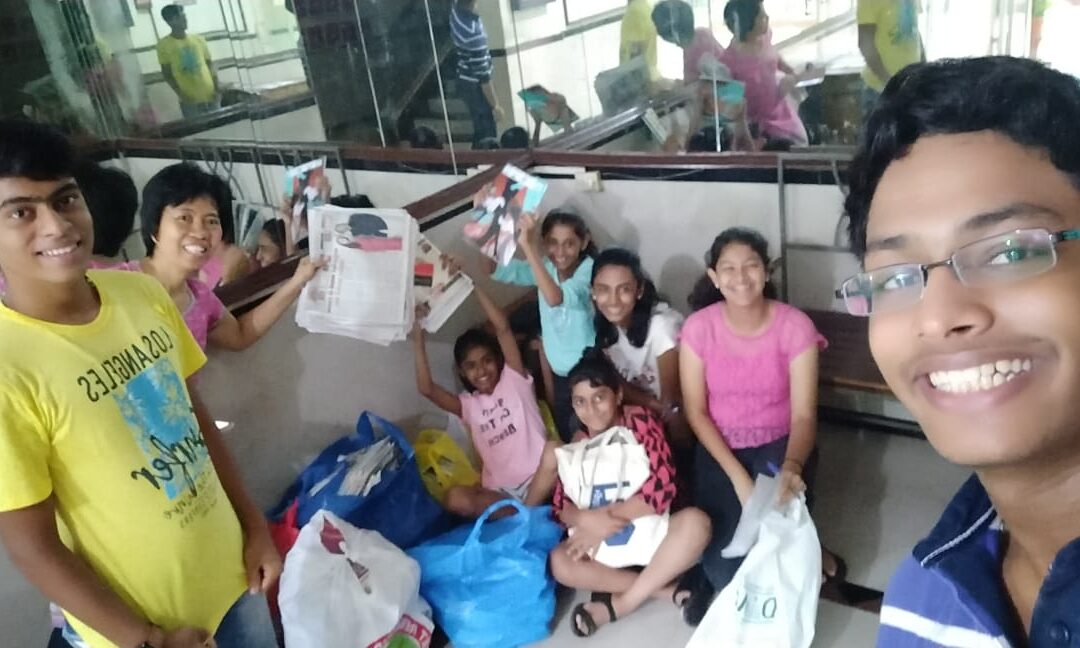
Oct 9, 2018 | Focolare Worldwide
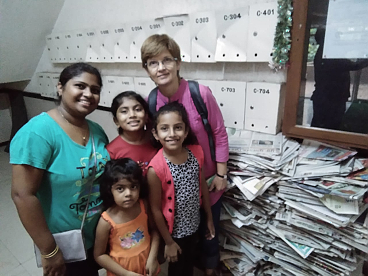 Last September, Mayur and his friends visited the slums in Bhandup and a school in Kanjur (Mumbai). They met with around 110 children. With his group, the Mayur’s Dance Academy, Mayur organised dance workshops for children at a town school in the Bhandup school district. At the conclusion, there was the long awaited distribution of nutritious food like milk, fruit, etc. to the joy of all! Despite the strong rains over the last months, we, Young Ones for Unity of Andheri (Mumbai), went door to door to ask for old newspapers to sell as paper to over 50 families in our neighbourhood. We also handed out letters addressing all the residents of the neighbourhood, with the same request. Many gave us their newspapers willingly, others who did not have any wanted to give something just the same, like cereals, and notebooks for school, and lastly, others gave us money to buy school material. Some parents and friends joined us, supporting the initiative also in the more concrete aspects. And so 383 kilos of paper were collected! The man who bought them gave us a good price, and moreover, also gave us some cash “since it was for a good cause,” he said.
Last September, Mayur and his friends visited the slums in Bhandup and a school in Kanjur (Mumbai). They met with around 110 children. With his group, the Mayur’s Dance Academy, Mayur organised dance workshops for children at a town school in the Bhandup school district. At the conclusion, there was the long awaited distribution of nutritious food like milk, fruit, etc. to the joy of all! Despite the strong rains over the last months, we, Young Ones for Unity of Andheri (Mumbai), went door to door to ask for old newspapers to sell as paper to over 50 families in our neighbourhood. We also handed out letters addressing all the residents of the neighbourhood, with the same request. Many gave us their newspapers willingly, others who did not have any wanted to give something just the same, like cereals, and notebooks for school, and lastly, others gave us money to buy school material. Some parents and friends joined us, supporting the initiative also in the more concrete aspects. And so 383 kilos of paper were collected! The man who bought them gave us a good price, and moreover, also gave us some cash “since it was for a good cause,” he said. 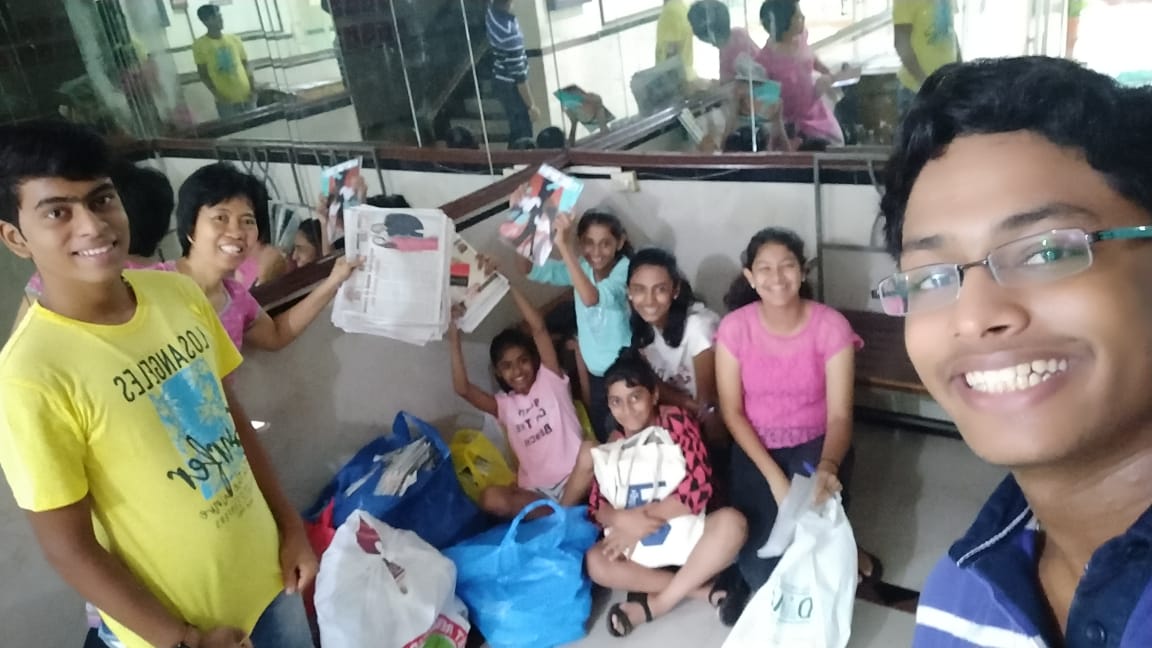 With the sum collected, we bought a lot of cereals which we donated to the Ursuline nuns who take care of children affected by AIDS and their families. Though it was tiring, the happiness for having done something concrete was greater. Our efforts, though modest, were a small step ahead in contributing to the “Zero Hunger Project.” launched by the FAO (Food and Agriculture Organization of the United Nations – http://www.fao.org/home/en/) and to which we, the Young Ones for Unity all over the world, are committed to. We’re so happy that all went well – concluded Anu and Alvin, the Young Ones for Unity of Andheri – but now we want to continue and do something more to build a better world, eliminating hunger, starting from our own neighbourhood.“
With the sum collected, we bought a lot of cereals which we donated to the Ursuline nuns who take care of children affected by AIDS and their families. Though it was tiring, the happiness for having done something concrete was greater. Our efforts, though modest, were a small step ahead in contributing to the “Zero Hunger Project.” launched by the FAO (Food and Agriculture Organization of the United Nations – http://www.fao.org/home/en/) and to which we, the Young Ones for Unity all over the world, are committed to. We’re so happy that all went well – concluded Anu and Alvin, the Young Ones for Unity of Andheri – but now we want to continue and do something more to build a better world, eliminating hunger, starting from our own neighbourhood.“
Watch video of Mayur Jayram Mandavkar https://vimeo.com/275110601
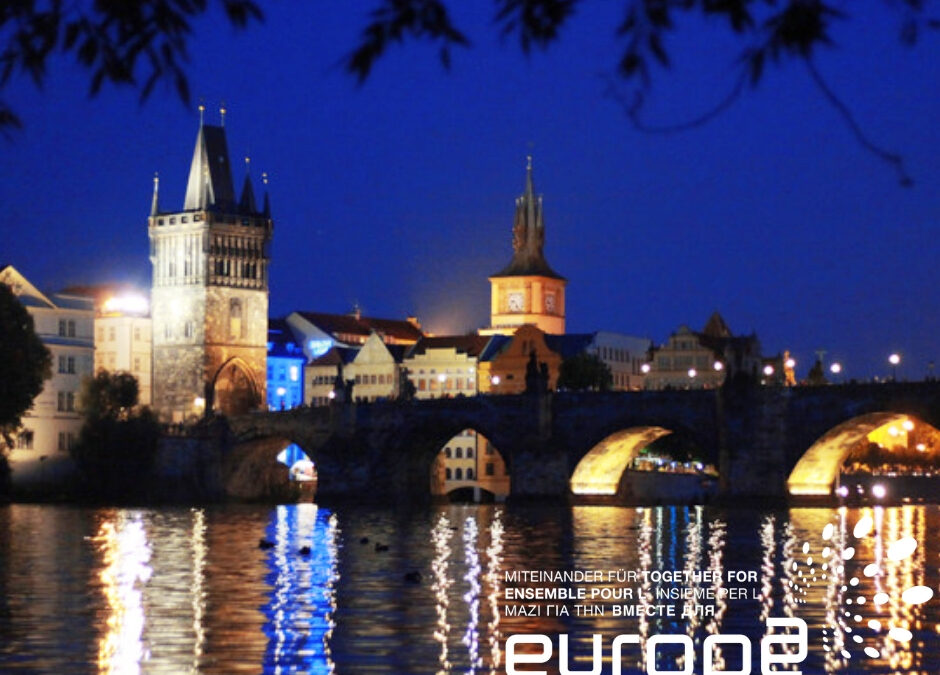
Oct 9, 2018 | Non categorizzato
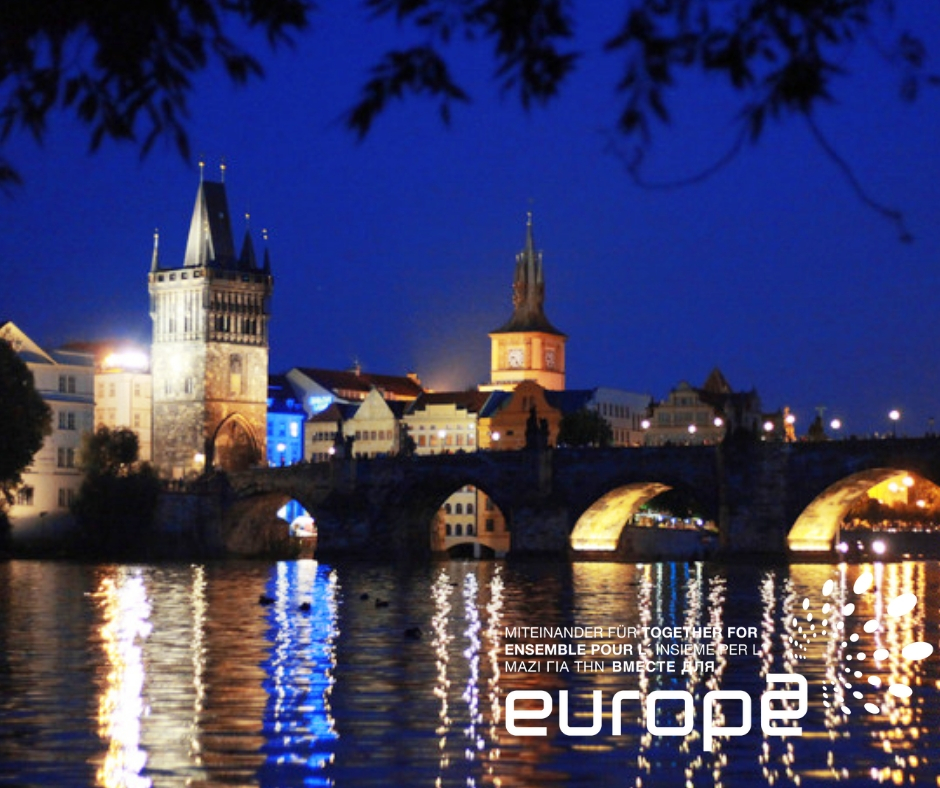 The great history of Central Europe, in particular of the Czech nation will serve as a backdrop for a new stage in the journey of Together for Europe, which promotes dialogue between divergent cultural and political identities. In November 2017 the European meeting of Friends of Together for Europe took place in Vienna, a bridge between Eastern and Western Europe. This year, we will have the opportunity to take another step to the very heart of Central Eastern Europe – Prague, with a singular desire to face challenges, prejudices and fears which weigh on the collective conscience of EU member states and beyond. Through the life of the Gospel, nourished and enlightened by the presence of Christ in the Christian communities, we wish to witness to the fact that the path towards Europe as a House of Nations and a Family of Peoples is not a utopia. The enduring legacy of the “Velvet Revolution” On 17th November, the Czech Republic commemorates the anniversary of the “Velvet Revolution” (so called due to its peaceful nature) which transformed the Czech Republic into a co-protagonist for the ongoing process of European reunification. The presence of the Friends of Together for Europe in Prague on this very day, urges us to renew our shared commitment: to bring to a post-secular culture the spirit of Christian Humanism, and in so doing contribute to building a more united Europe. The renowned Czech Philosopher and Theologian Tomas Halik, friend of the late Vaclav Havel, Jaroslav Sebek of the Historical Czech Academy of Science, and Pavel Fischer an emerging Czech politician, together with leaders and representatives of different Movements, Communities and Associations will be present. Their contributions will reinforce the daring objective of this meeting: to recall a Europe of hope and promise, a Europe which stems from a rich heritage of ethnic, social and cultural diversity and calls out for communion and dialogue. In this way, the Prague event will become a fundamental phase of Together for Europe which continues its commitment for a more united, brotherly and just Europe. It will also be a unique opportunity to prepare together for the upcoming elections for the European Parliament. The meeting will conclude with an open evening, in which Movements and Communities from different churches and which are present in the Czech Republic will be represented. Address: Mariapolis Centre, Mladoboleslavská 667, 190 17 Prague 9 – Vinoř, Czech Republic – Tel. +420 286 007 711; Email: cmpraha@espol.cz; www.centrummariapoli.cz Beatriz Lauenroth
The great history of Central Europe, in particular of the Czech nation will serve as a backdrop for a new stage in the journey of Together for Europe, which promotes dialogue between divergent cultural and political identities. In November 2017 the European meeting of Friends of Together for Europe took place in Vienna, a bridge between Eastern and Western Europe. This year, we will have the opportunity to take another step to the very heart of Central Eastern Europe – Prague, with a singular desire to face challenges, prejudices and fears which weigh on the collective conscience of EU member states and beyond. Through the life of the Gospel, nourished and enlightened by the presence of Christ in the Christian communities, we wish to witness to the fact that the path towards Europe as a House of Nations and a Family of Peoples is not a utopia. The enduring legacy of the “Velvet Revolution” On 17th November, the Czech Republic commemorates the anniversary of the “Velvet Revolution” (so called due to its peaceful nature) which transformed the Czech Republic into a co-protagonist for the ongoing process of European reunification. The presence of the Friends of Together for Europe in Prague on this very day, urges us to renew our shared commitment: to bring to a post-secular culture the spirit of Christian Humanism, and in so doing contribute to building a more united Europe. The renowned Czech Philosopher and Theologian Tomas Halik, friend of the late Vaclav Havel, Jaroslav Sebek of the Historical Czech Academy of Science, and Pavel Fischer an emerging Czech politician, together with leaders and representatives of different Movements, Communities and Associations will be present. Their contributions will reinforce the daring objective of this meeting: to recall a Europe of hope and promise, a Europe which stems from a rich heritage of ethnic, social and cultural diversity and calls out for communion and dialogue. In this way, the Prague event will become a fundamental phase of Together for Europe which continues its commitment for a more united, brotherly and just Europe. It will also be a unique opportunity to prepare together for the upcoming elections for the European Parliament. The meeting will conclude with an open evening, in which Movements and Communities from different churches and which are present in the Czech Republic will be represented. Address: Mariapolis Centre, Mladoboleslavská 667, 190 17 Prague 9 – Vinoř, Czech Republic – Tel. +420 286 007 711; Email: cmpraha@espol.cz; www.centrummariapoli.cz Beatriz Lauenroth
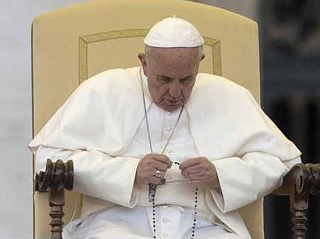
Oct 9, 2018 | Non categorizzato
 In the month of October, Pope Francis explicitly invites all the members of the Catholic Church worldwide to pray and fast in penance, together as the people of God, to ask the Holy Mother of God and St. Michael Archangel to protect the Church from the devil, the main architect of division among men and with God, and make it also more conscious of the faults, errors and abuse committed in the past and present. He invited all to conclude the recital of the Rosary with the ancient invocation “Sub Tuum Praesidium” – which says: “We fly to thy protection O holy Mother of God. Do not despise our petitions in our necessities but deliver us always from all dangers O Glorious and Blessed Virgin” – and with the prayer to St. Michael Archangel, composed by Pope Leo XIII, which says: “St. Michael Archangel, defend us in battle, be our protection against the wickedness and snares of the devil.”
In the month of October, Pope Francis explicitly invites all the members of the Catholic Church worldwide to pray and fast in penance, together as the people of God, to ask the Holy Mother of God and St. Michael Archangel to protect the Church from the devil, the main architect of division among men and with God, and make it also more conscious of the faults, errors and abuse committed in the past and present. He invited all to conclude the recital of the Rosary with the ancient invocation “Sub Tuum Praesidium” – which says: “We fly to thy protection O holy Mother of God. Do not despise our petitions in our necessities but deliver us always from all dangers O Glorious and Blessed Virgin” – and with the prayer to St. Michael Archangel, composed by Pope Leo XIII, which says: “St. Michael Archangel, defend us in battle, be our protection against the wickedness and snares of the devil.”
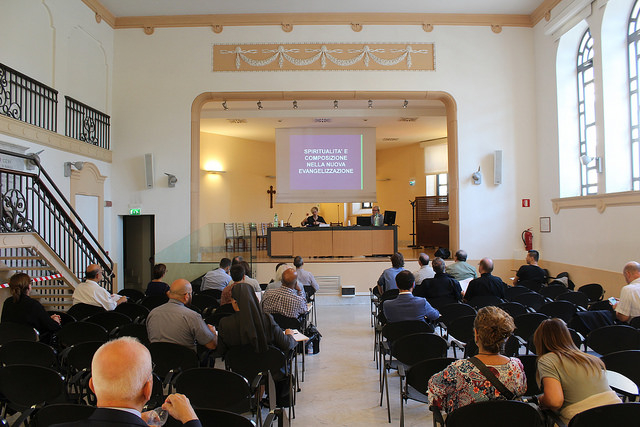
Oct 8, 2018 | Focolare Worldwide
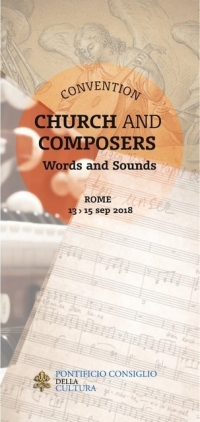 “We strongly feel the urgency of evangelization, and we realize that music can have a great impact in this regard,” says singer and songwriter, Nancy Uelmen from the Gen Verde International Performing Arts Group. She was one of the participants at the convention from the Focolare Movement. The convention lasted three days and was promoted by the Pontifical Council of Culture under the guidance of Cardinal Gianfranco Ravasi. The convention was named “Church and Composers: Word and Sounds.” Besides the speakers, there were also 110 representatives from different Bishops Conferences and academic institutions from many countries, including several composers. The reflection began with “Music and Word”, which focused on memory, intelligibility and meaning. Then came “Music and Gospel”, which allowed for a presentation of several personal and communitarian experiences of life and the impact of different musical and compositional styles. Finally, “Music and Instruments” was more technical and focused on diverse sounds that culminate in the human voice. “We also discussed the great need of evangelizing with music, beyond the context of liturgy,” Uelmen recalls. “It’s the time for courageous expressiveness,” commented Msgr Marco Frisina, composer and director of the Diocesan Choir of Rome, Italy.
“We strongly feel the urgency of evangelization, and we realize that music can have a great impact in this regard,” says singer and songwriter, Nancy Uelmen from the Gen Verde International Performing Arts Group. She was one of the participants at the convention from the Focolare Movement. The convention lasted three days and was promoted by the Pontifical Council of Culture under the guidance of Cardinal Gianfranco Ravasi. The convention was named “Church and Composers: Word and Sounds.” Besides the speakers, there were also 110 representatives from different Bishops Conferences and academic institutions from many countries, including several composers. The reflection began with “Music and Word”, which focused on memory, intelligibility and meaning. Then came “Music and Gospel”, which allowed for a presentation of several personal and communitarian experiences of life and the impact of different musical and compositional styles. Finally, “Music and Instruments” was more technical and focused on diverse sounds that culminate in the human voice. “We also discussed the great need of evangelizing with music, beyond the context of liturgy,” Uelmen recalls. “It’s the time for courageous expressiveness,” commented Msgr Marco Frisina, composer and director of the Diocesan Choir of Rome, Italy.
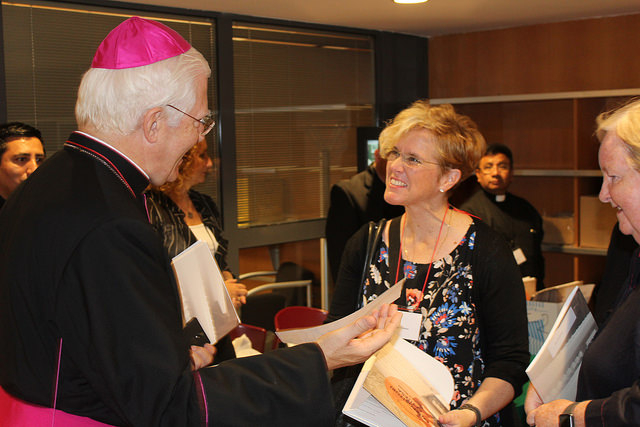
Photo credit: Pontifical Council for Culture

Photo credit: Pontifical Council for Culture
Oct 7, 2018 | Focolare Worldwide
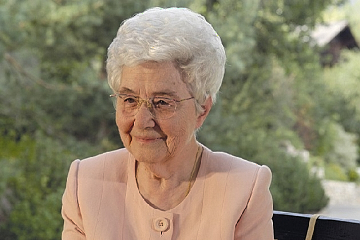
Oct 5, 2018 | Non categorizzato
 “Seeing what the Holy Spirit has done with us and with many other spiritual and social “enterprises” that are at work the Church today, I cannot but hope that He will continue to act now and always with the same generosity and magnanimity. And this holds true not only for brand new works that will arise from his love, but also for the development of those that already exist, like our own. Meanwhile, I dream that the atmosphere in our Church will be more suited to her identity as the Bride of Christ; a Church which can be seen by the world as being more beautiful, more one, more holy, more charismatic, more akin to Christ her Spouse. I dream of her being a beacon for humanity. And I dream of seeing in her a holiness of the people, never seen before. I dream that the lived siblinghood, that is gaining momentum today in the consciences of millions of people, will be practised more widely across the globe, so that in the third millennium it will be a general, universal reality. Consequently, I dream of fewer wars and conflicts, less hunger, and the reduction of the thousand other evils in the world. I dream of an ever more intense dialogue of love among the Churches so that the formation of the one Church is seen to be close at hand. I dream of a more living and active dialogue among people of the most varied religions linked to one another by love, by “the Golden Rule” present in all their sacred texts. I dream of greater encounter and mutual enrichment among the various cultures in the world, so that they may give rise to a world culture that highlights those values which have always been the true wealth of individual peoples, and I dream that these values will be seen by all as global wisdom. I dream that the Holy Spirit will continue to enrich the Churches and strengthen the “seeds of the Word” beyond them, so that the world may continually receive new light, life, and works which He alone can is able to give. So that ever-greater numbers of men and women may set out towards straight paths, converging on their Creator, and putting their hearts and souls at his disposal. I dream of Gospel-based relationships not only among individuals, but also among groups, movements, religious and lay associations; among peoples and among States, so that it becomes logical to love other people’s countries as our own; and logical to tend towards a universal communion of goods, at least as a goal to reach. [..] In a word, I dream of already witnessing the new heavens and new earth, as far as this is possible here on earth. I am dreaming of many things, but we have a millennium to see them come true.” Chiara Lubich Extract from: “Attualità. Leggere il proprio tempo”, Città Nuova, Rome 2013, pp. 102-103
“Seeing what the Holy Spirit has done with us and with many other spiritual and social “enterprises” that are at work the Church today, I cannot but hope that He will continue to act now and always with the same generosity and magnanimity. And this holds true not only for brand new works that will arise from his love, but also for the development of those that already exist, like our own. Meanwhile, I dream that the atmosphere in our Church will be more suited to her identity as the Bride of Christ; a Church which can be seen by the world as being more beautiful, more one, more holy, more charismatic, more akin to Christ her Spouse. I dream of her being a beacon for humanity. And I dream of seeing in her a holiness of the people, never seen before. I dream that the lived siblinghood, that is gaining momentum today in the consciences of millions of people, will be practised more widely across the globe, so that in the third millennium it will be a general, universal reality. Consequently, I dream of fewer wars and conflicts, less hunger, and the reduction of the thousand other evils in the world. I dream of an ever more intense dialogue of love among the Churches so that the formation of the one Church is seen to be close at hand. I dream of a more living and active dialogue among people of the most varied religions linked to one another by love, by “the Golden Rule” present in all their sacred texts. I dream of greater encounter and mutual enrichment among the various cultures in the world, so that they may give rise to a world culture that highlights those values which have always been the true wealth of individual peoples, and I dream that these values will be seen by all as global wisdom. I dream that the Holy Spirit will continue to enrich the Churches and strengthen the “seeds of the Word” beyond them, so that the world may continually receive new light, life, and works which He alone can is able to give. So that ever-greater numbers of men and women may set out towards straight paths, converging on their Creator, and putting their hearts and souls at his disposal. I dream of Gospel-based relationships not only among individuals, but also among groups, movements, religious and lay associations; among peoples and among States, so that it becomes logical to love other people’s countries as our own; and logical to tend towards a universal communion of goods, at least as a goal to reach. [..] In a word, I dream of already witnessing the new heavens and new earth, as far as this is possible here on earth. I am dreaming of many things, but we have a millennium to see them come true.” Chiara Lubich Extract from: “Attualità. Leggere il proprio tempo”, Città Nuova, Rome 2013, pp. 102-103
Oct 4, 2018 | Non categorizzato
Also the scientists say that smiling does us good. It lengthens life, reduces stress and brings people closer. At times it can also change your life. The World Smile Day created by Harvey Ball has been celebrated every first Friday of October since 1999. He was also the creator of the “smileys” that inspired the emoticon. Giving a smile is not always easy, but necessary. “I do not know of any other sign of superiority in man except that of being kind,” Beethoven affirmed. And according to Plato: “Every person you meet is fighting a battle you know nothing about. Be kind, always.” Hunter Doherty Adams called “Patch” is a doctor, activist and writer who is known worldwide for his practice of and support for clown therapy. Strongly convinced that joy and creativity are integral parts of the therapeutic process especially for children, Patch and his colleagues fight against suffering and disease by wearing a red clown’s nose, now the distinctive element of a new way of practicing the medical profession. Adams dedicated his life to the study of the human being under ever aspect and in the creation of a healthcare system within everyone’s means. His philosophy of healing starts with the mind, and the action which stimulates in the patients the construction of positive thinking that can make our lives better.
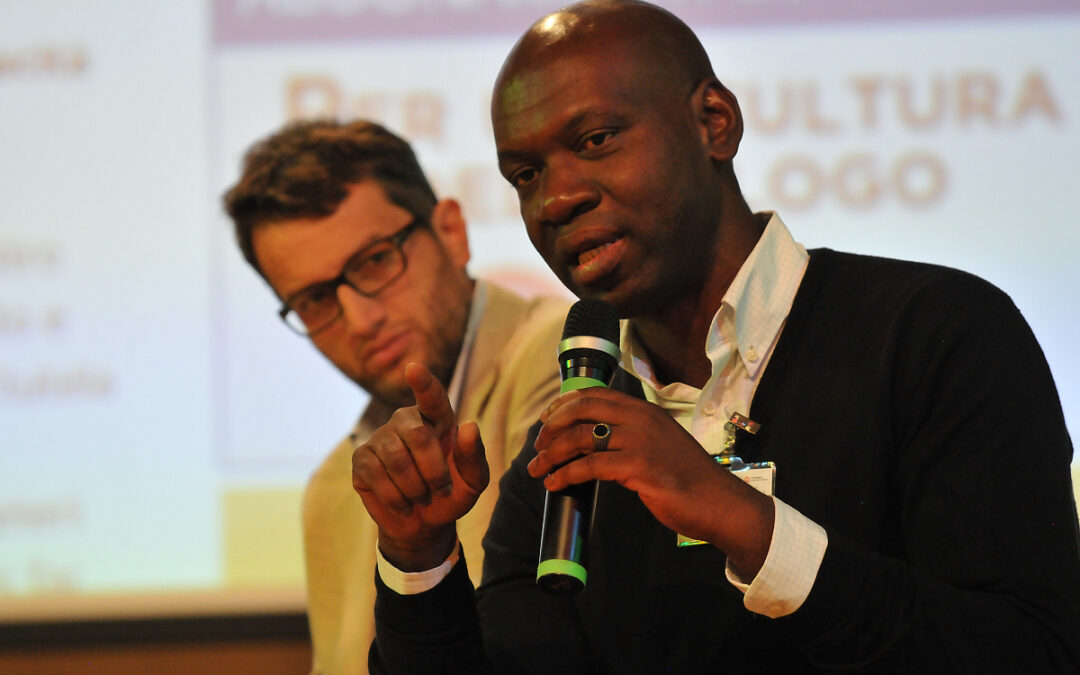
Oct 4, 2018 | Focolare Worldwide
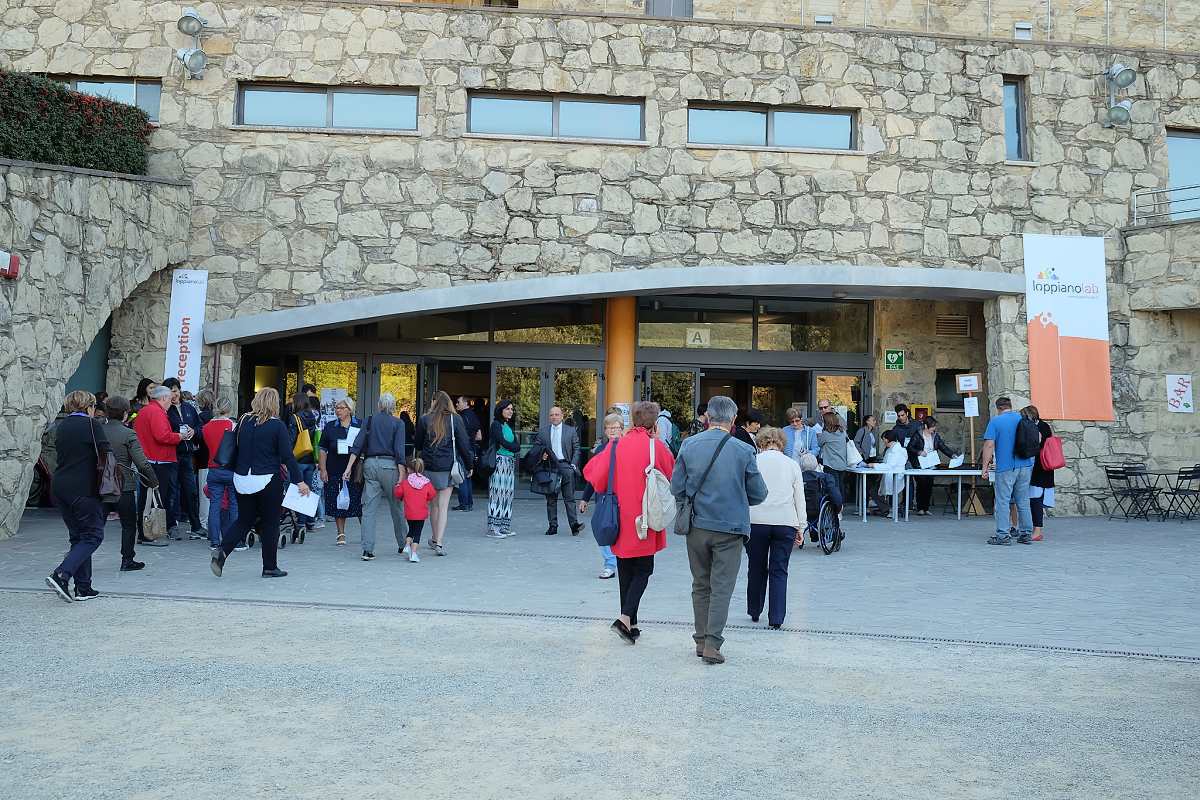 “There were more than 1,000 participants, a quarter of which belonged to the age bracket of the youth, adolescents and children; three central themes on employment, education, and participation, starting from the heritage of the 1968 youth movement; almost 50 workshops for adults and children; and around 10 speakers.” Aurora Nicosia, New City Director expressed her great satisfaction at the conclusion of the event. The title of this year’s LoppianoLab held in the International town of Loppiano recalled the anniversary of the youth protests: “From the dream to commitment, education, participation, and work fifty years after 1968.” Each of the three themes – education, participation, and employment were central to the plenary session which was followed by a series of workshops open to the contribution of everyone. The morning of Saturday, 29 September was dedicated to the theme of employment, and focused on “Why work will never end.” A dialogue was set up and participated in by Carlo Petrini, founder and soul of Slow food, Sr. Alessandra Smerilli, economist, and Fr. Antonio Loffredo of the Social Cooperative La Paranza, and was moderated by Atty. Flavia Cerino. The round table involved Mario Capanna, politician and essayist, Brunetto Salvarani, theologian, and Rosy Bind, former Congresswoman. It focused on the heritage handed down by the 1968 movement, was emceed by Marco Luppi (Historian, Sophia Univ. Inst.) and Federico Rovea (doctoral candidate in the Science of Education, Padua Univ.), and centred on the title: From the dream to commitment: beyond the revolution and the 1968 protest.
“There were more than 1,000 participants, a quarter of which belonged to the age bracket of the youth, adolescents and children; three central themes on employment, education, and participation, starting from the heritage of the 1968 youth movement; almost 50 workshops for adults and children; and around 10 speakers.” Aurora Nicosia, New City Director expressed her great satisfaction at the conclusion of the event. The title of this year’s LoppianoLab held in the International town of Loppiano recalled the anniversary of the youth protests: “From the dream to commitment, education, participation, and work fifty years after 1968.” Each of the three themes – education, participation, and employment were central to the plenary session which was followed by a series of workshops open to the contribution of everyone. The morning of Saturday, 29 September was dedicated to the theme of employment, and focused on “Why work will never end.” A dialogue was set up and participated in by Carlo Petrini, founder and soul of Slow food, Sr. Alessandra Smerilli, economist, and Fr. Antonio Loffredo of the Social Cooperative La Paranza, and was moderated by Atty. Flavia Cerino. The round table involved Mario Capanna, politician and essayist, Brunetto Salvarani, theologian, and Rosy Bind, former Congresswoman. It focused on the heritage handed down by the 1968 movement, was emceed by Marco Luppi (Historian, Sophia Univ. Inst.) and Federico Rovea (doctoral candidate in the Science of Education, Padua Univ.), and centred on the title: From the dream to commitment: beyond the revolution and the 1968 protest. 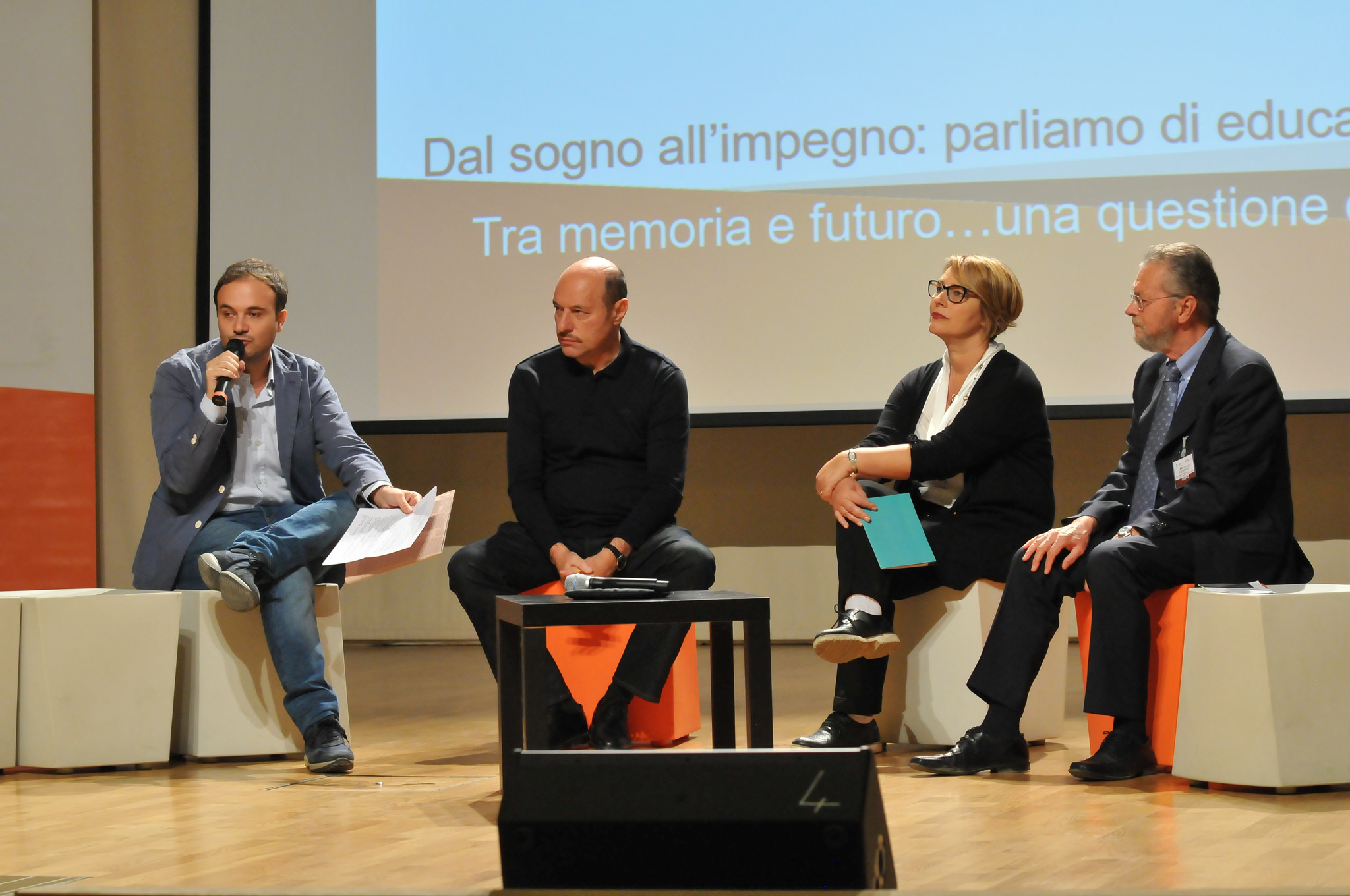 Instead, on the morning of Sunday, 30 September, the theme of education was taken up, highlighting “From the dream to commitment: let’s talk about education 4.0 Between memories and the future… a matter of sense.” The discussion was moderated by Paolo Di Paolo, writer, and involved Eraldo Affinati, teacher and writer, Emma Ciccarelli, vice president of the Family Associations Forum, and Michele De Beni, educationalist and Professor of the Sophia University. Among the themes taken up were the situation which the schooling world is undergoing today, and more extensively, the world of education. “The importance of LoppianoLab was that it re-emphasised some priorities: work, the need to participate in the many shared settings across society and politics, the central role of education …” commented Marco Luppi, Professor of History of Contemporary Politics at the Sophia University Institute. “Passing from the dream to commitment, I would like to start with ‘emphasis’ on a collective job awaiting all of us, believers and non-believers as highlighted in all the workshops, towards the construction of the common good, in not only a possible dialogue, but also an urgent one.”
Instead, on the morning of Sunday, 30 September, the theme of education was taken up, highlighting “From the dream to commitment: let’s talk about education 4.0 Between memories and the future… a matter of sense.” The discussion was moderated by Paolo Di Paolo, writer, and involved Eraldo Affinati, teacher and writer, Emma Ciccarelli, vice president of the Family Associations Forum, and Michele De Beni, educationalist and Professor of the Sophia University. Among the themes taken up were the situation which the schooling world is undergoing today, and more extensively, the world of education. “The importance of LoppianoLab was that it re-emphasised some priorities: work, the need to participate in the many shared settings across society and politics, the central role of education …” commented Marco Luppi, Professor of History of Contemporary Politics at the Sophia University Institute. “Passing from the dream to commitment, I would like to start with ‘emphasis’ on a collective job awaiting all of us, believers and non-believers as highlighted in all the workshops, towards the construction of the common good, in not only a possible dialogue, but also an urgent one.” 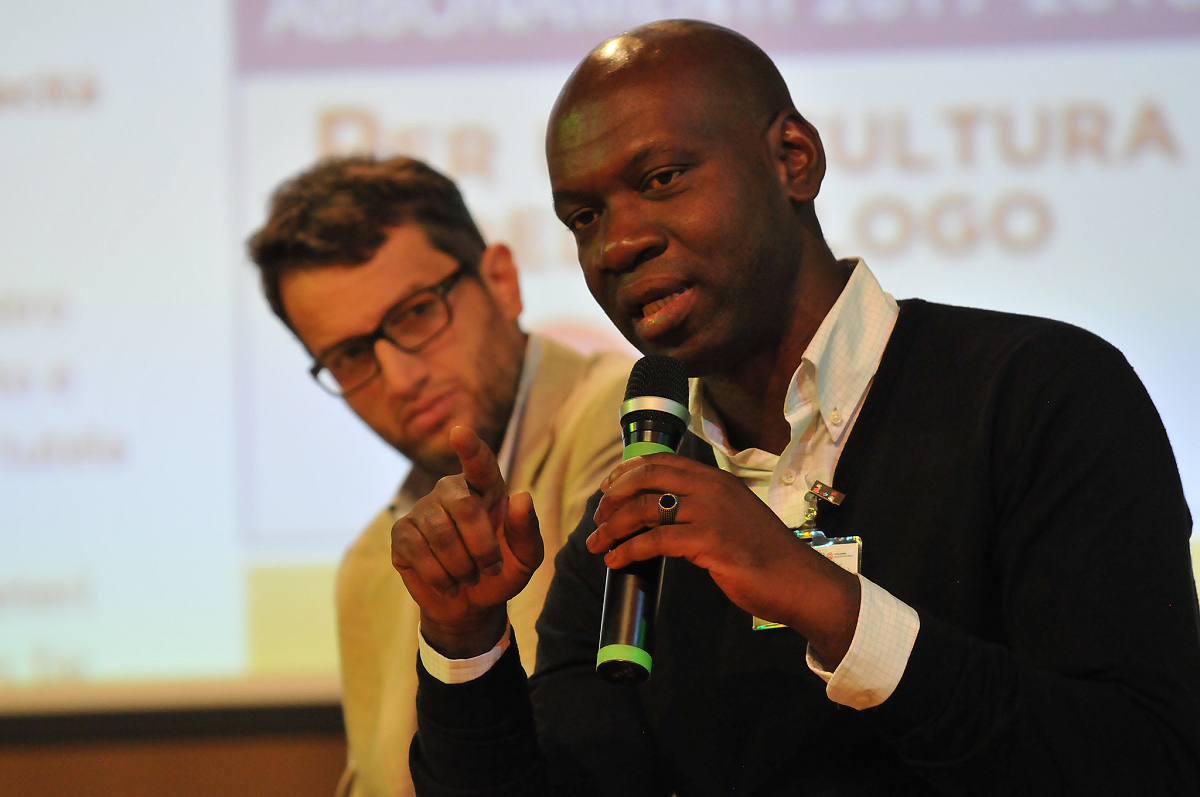 As in the last years, the laboratory formula characterising the event, set a dialogue among the citizens, entrepreneurs, communication operators, students and teachers, politicians, members of associations, youths, and intellectuals of all the Italian regions and beyond. “To conclude,” Aurora Nicosia underlined, “we can say that the title of this edition, “From the dream to commitment,” did not remain a slogan, but became something vital, a push not to give up our “dreams,” as Pope Francis often stresses, but to give concreteness to these dreams, with an individual and collective commitment.” Tamara Pastorelli
As in the last years, the laboratory formula characterising the event, set a dialogue among the citizens, entrepreneurs, communication operators, students and teachers, politicians, members of associations, youths, and intellectuals of all the Italian regions and beyond. “To conclude,” Aurora Nicosia underlined, “we can say that the title of this edition, “From the dream to commitment,” did not remain a slogan, but became something vital, a push not to give up our “dreams,” as Pope Francis often stresses, but to give concreteness to these dreams, with an individual and collective commitment.” Tamara Pastorelli
Photos on Flickr 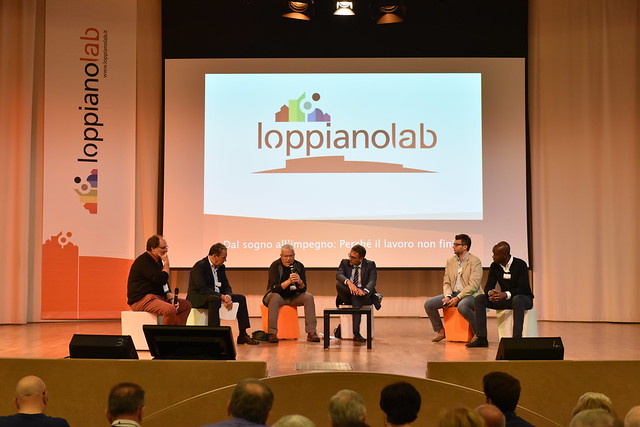
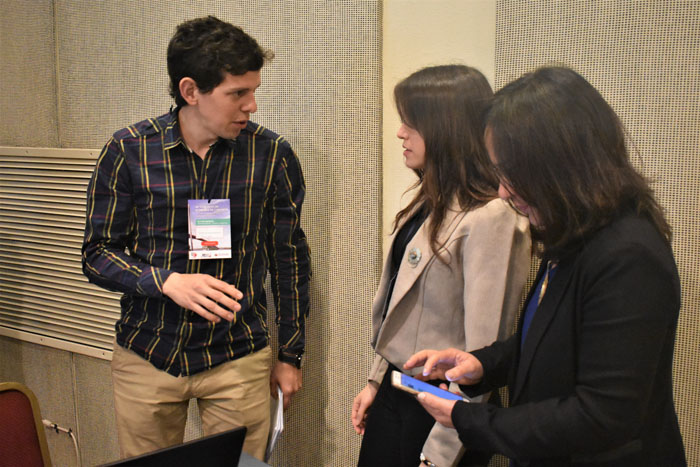
Oct 3, 2018 | Focolare Worldwide
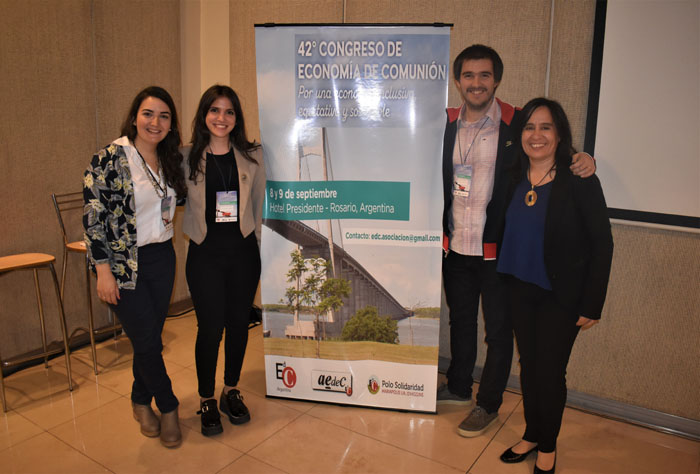 Carolina Carbonell was one of the organisers of the Economy of Communion Congress in Rosario, a populated city in the province of Santa Fe, 300 km from Buenos Aires. She defined the event as “a marathon,” maybe because it all started with a race against time. “It was February 2018. A few months earlier, we had received the proposal to organise the Congress in our city. It was very hot. Walking along the sidewalks of the city, I came across an old university friend, today the director of a series of hotels. I immediately stopped him and told him of our dream: so we found the place for the Congress. On 6 September, 70 people, “not only a few, considering that those were the days in which the faculty was the object of a student protest,’ attended the opening event, with a conference entitled, ’What’s the Economy of Communion?’”
Carolina Carbonell was one of the organisers of the Economy of Communion Congress in Rosario, a populated city in the province of Santa Fe, 300 km from Buenos Aires. She defined the event as “a marathon,” maybe because it all started with a race against time. “It was February 2018. A few months earlier, we had received the proposal to organise the Congress in our city. It was very hot. Walking along the sidewalks of the city, I came across an old university friend, today the director of a series of hotels. I immediately stopped him and told him of our dream: so we found the place for the Congress. On 6 September, 70 people, “not only a few, considering that those were the days in which the faculty was the object of a student protest,’ attended the opening event, with a conference entitled, ’What’s the Economy of Communion?’” 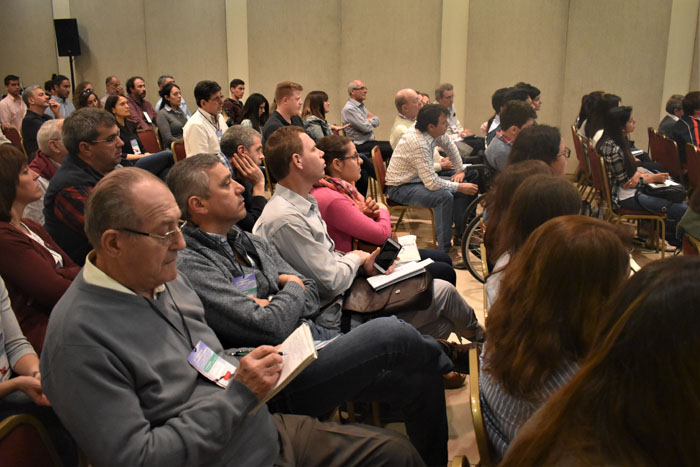 On the second day, the “marathon” continued. “The entire team” – recounted Carolina – “woke up early to meet over 300 students of the fourth and fifth year of 12 schools in Rosario, who gathered at the ‘Colegio Natividad del Señor’ to participate in a workshop. The kids put all their creativity to ‘create’ businesses and ‘make decisions’ over various situations regarding competition, crises, distribution of profits and selection of the personnel. The most important part, however, was that they subjected the EoC entrepreneurs present to a test, and who responded with their own life experiences. In the afternoon we went to the After Unplugged ‘Empresas de un solo tiempo’ session in La Maquinita Rosario. It was a co-working setting where Gonzalo Perrín, Leandro Simeoni and Lucas Longhi narrated about their own experiences as entrepreneurs for a common project. On Saturday, we welcomed the 120 participants from 30 cities of 8 provinces and 4 different countries. It was a big group, highly assorted by age and profession. The innovative presentation, tracing the present to the origins of the EoC, was followed by testimonials of the employees of some companies that were a part of the project. There were different experiences, from a family business that produces sustainable benches to a contact center with 1,200 employees, ’Nomines,’ an inclusive company which hires only disabled people.”
On the second day, the “marathon” continued. “The entire team” – recounted Carolina – “woke up early to meet over 300 students of the fourth and fifth year of 12 schools in Rosario, who gathered at the ‘Colegio Natividad del Señor’ to participate in a workshop. The kids put all their creativity to ‘create’ businesses and ‘make decisions’ over various situations regarding competition, crises, distribution of profits and selection of the personnel. The most important part, however, was that they subjected the EoC entrepreneurs present to a test, and who responded with their own life experiences. In the afternoon we went to the After Unplugged ‘Empresas de un solo tiempo’ session in La Maquinita Rosario. It was a co-working setting where Gonzalo Perrín, Leandro Simeoni and Lucas Longhi narrated about their own experiences as entrepreneurs for a common project. On Saturday, we welcomed the 120 participants from 30 cities of 8 provinces and 4 different countries. It was a big group, highly assorted by age and profession. The innovative presentation, tracing the present to the origins of the EoC, was followed by testimonials of the employees of some companies that were a part of the project. There were different experiences, from a family business that produces sustainable benches to a contact center with 1,200 employees, ’Nomines,’ an inclusive company which hires only disabled people.”  After lunch, an original game, musical chairs, was proposed but in a different and even more enjoyable version: instead of eliminating those who did not find a seat, the chairs were eliminated. “It required cunningness and balance to sit on top of the others without getting hurt. The most difficult moment was when only one chair remained, and all had to sit without letting anyone fall. This same intelligence is also needed by all those who work for the elimination of poverty.” With great depth we then presented some of the saddest realities of current society, to recall the reasons for which the EoC was created. “Lastly,” Carolina concluded, “when you think that the goal is not too far away since we are always dealing with a marathon, and that nothing else could happen at that point, the unforeseeable occurred. On Sunday, some 8-year-old children recounted their experiences: a small business to earn money to share with kids of other nations at war, or the visit to a home for the aged where they learned to appreciate them. Last was the interview of Martina, 9 years old: The questions, but above all the answers show the prophesy underlying the EoC: those who have lived the culture of giving since their childhood are those who will one day be able to change the economy.” Source: www.focolare.org/conosur
After lunch, an original game, musical chairs, was proposed but in a different and even more enjoyable version: instead of eliminating those who did not find a seat, the chairs were eliminated. “It required cunningness and balance to sit on top of the others without getting hurt. The most difficult moment was when only one chair remained, and all had to sit without letting anyone fall. This same intelligence is also needed by all those who work for the elimination of poverty.” With great depth we then presented some of the saddest realities of current society, to recall the reasons for which the EoC was created. “Lastly,” Carolina concluded, “when you think that the goal is not too far away since we are always dealing with a marathon, and that nothing else could happen at that point, the unforeseeable occurred. On Sunday, some 8-year-old children recounted their experiences: a small business to earn money to share with kids of other nations at war, or the visit to a home for the aged where they learned to appreciate them. Last was the interview of Martina, 9 years old: The questions, but above all the answers show the prophesy underlying the EoC: those who have lived the culture of giving since their childhood are those who will one day be able to change the economy.” Source: www.focolare.org/conosur
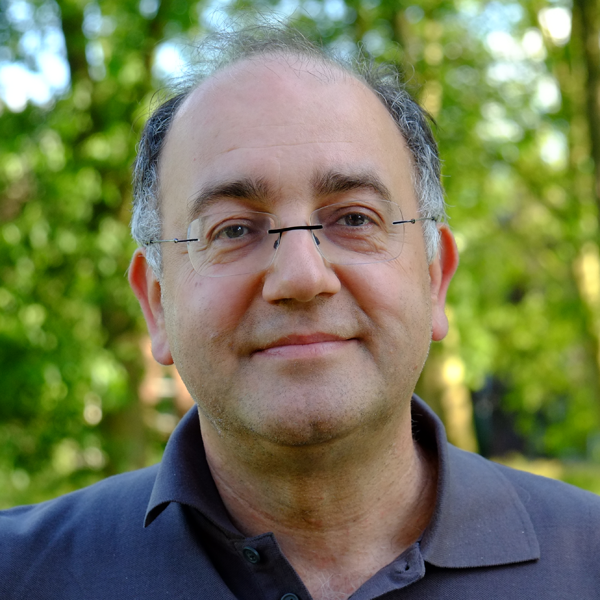
Oct 2, 2018 | Non categorizzato
 Economy is a Greek word that directly refers to the home (oikos nomos, rules for running a house), on the family. But the modern economy, especially contemporary economy, is governed by other principles, distinct and in many ways opposed to the ones that govern a family. A founding principle of the family, perhaps the primary one that underpins all the others is gratuitousness, which is the farthest from a capitalistic economy that is more familar with the surrogates of gratuitousness (discounts, philanthropy, sales). These serve the purpose of immunizing the markets against true gratuitousness. The family, in fact, is the main place where we learn from childhood on and for the rest of our lives, what Pavel Florensky calls the “art of gratuitousness”. It is especially in the family that we learn as children to work, and that no work can be done well without gratuitousness. But our culture associates gratuitousness with “for free,” the discount, the half-hour of overtime without pay, the zero price ( Saint Francis instead told us that gratuitousness is an infinite price: it can’t be sold or bought, because it’s unpayable). Gratuitousness means giving freely; it is a type of behaviour and a lifestyle that consists in approaching others, oneself, nature, God and things – not to use them in a utilitarian way for one’s own advantage, but to acknowledge their “otherness” and in their mystery, to respect them and serve them. To say gratuitousness means, therefore, to recognize that a certain way of acting done because it is good, and not because of recompense or sanction. […] If the family wishes to cultivate the art of gratuitousness as it should, it should be careful not to import into the home the logic of incentive which is rampant in today’s world. […] One of the tasks of the family is the formation of a person’s work ethic, which is precisely the result of gratuitiousness. If, instead, you begin to practice the logic and culture of incentives, and money becomes the reason for doing things, children will not be good workers when they become adults, because the work well done of tomorrow will always depend on the gratuitousness that is learned especially during the first years of life and especially in the home. The absence of gratuity in the economy also depends a lot on the absence of a feminine gaze. […] Women look at the home and at the economy and first see the connections of human relationships that that are happening. The first goods they see are the relational ones and the communal goods, and within these they also see the economic goods. It is certainly not by chance that the Economy of Communion was the result of the vision of a woman (Chiara Lubich), nor that the first theoritician of the common goods was Katherine Coman (1911), or that Elinor Ostrom was the only woman so far to receive a Nobel Prize in ecomony because of her work on common goods. And there are two women at the root of the theory on relational goods: Martha Nussbaum and Caroll Uhlaner. When the feminine gaze is missing from the economy, the only relations that can be seen are instrumental ones where it is not the relation that is the good, but where relationships with people and with nature are seen as the means used for obtaining goods. If the feminine gaze and genius of the home (oikos), had perhaps been present in the theoretical foundation of modern economy, we would have had an economy that was more attentive to the relationships, to the redistribution of revenue, to the environment and perhaps to communion. Communion is the great word that the family has to pass on to the economy. The prophetic role of the family in today’s world, to be believed, must take on the form of the children and the form of the economy and, therefore, of sharing, welcoming and communion. Because the children and the economy are nothing more than the ordinary life of each and of all, which is the only place where prophecy is nourished and grows. Source: www.avvenire.it, “Così lo sguardo femminile può cambiare l’economia”, 23 August 2018.
Economy is a Greek word that directly refers to the home (oikos nomos, rules for running a house), on the family. But the modern economy, especially contemporary economy, is governed by other principles, distinct and in many ways opposed to the ones that govern a family. A founding principle of the family, perhaps the primary one that underpins all the others is gratuitousness, which is the farthest from a capitalistic economy that is more familar with the surrogates of gratuitousness (discounts, philanthropy, sales). These serve the purpose of immunizing the markets against true gratuitousness. The family, in fact, is the main place where we learn from childhood on and for the rest of our lives, what Pavel Florensky calls the “art of gratuitousness”. It is especially in the family that we learn as children to work, and that no work can be done well without gratuitousness. But our culture associates gratuitousness with “for free,” the discount, the half-hour of overtime without pay, the zero price ( Saint Francis instead told us that gratuitousness is an infinite price: it can’t be sold or bought, because it’s unpayable). Gratuitousness means giving freely; it is a type of behaviour and a lifestyle that consists in approaching others, oneself, nature, God and things – not to use them in a utilitarian way for one’s own advantage, but to acknowledge their “otherness” and in their mystery, to respect them and serve them. To say gratuitousness means, therefore, to recognize that a certain way of acting done because it is good, and not because of recompense or sanction. […] If the family wishes to cultivate the art of gratuitousness as it should, it should be careful not to import into the home the logic of incentive which is rampant in today’s world. […] One of the tasks of the family is the formation of a person’s work ethic, which is precisely the result of gratuitiousness. If, instead, you begin to practice the logic and culture of incentives, and money becomes the reason for doing things, children will not be good workers when they become adults, because the work well done of tomorrow will always depend on the gratuitousness that is learned especially during the first years of life and especially in the home. The absence of gratuity in the economy also depends a lot on the absence of a feminine gaze. […] Women look at the home and at the economy and first see the connections of human relationships that that are happening. The first goods they see are the relational ones and the communal goods, and within these they also see the economic goods. It is certainly not by chance that the Economy of Communion was the result of the vision of a woman (Chiara Lubich), nor that the first theoritician of the common goods was Katherine Coman (1911), or that Elinor Ostrom was the only woman so far to receive a Nobel Prize in ecomony because of her work on common goods. And there are two women at the root of the theory on relational goods: Martha Nussbaum and Caroll Uhlaner. When the feminine gaze is missing from the economy, the only relations that can be seen are instrumental ones where it is not the relation that is the good, but where relationships with people and with nature are seen as the means used for obtaining goods. If the feminine gaze and genius of the home (oikos), had perhaps been present in the theoretical foundation of modern economy, we would have had an economy that was more attentive to the relationships, to the redistribution of revenue, to the environment and perhaps to communion. Communion is the great word that the family has to pass on to the economy. The prophetic role of the family in today’s world, to be believed, must take on the form of the children and the form of the economy and, therefore, of sharing, welcoming and communion. Because the children and the economy are nothing more than the ordinary life of each and of all, which is the only place where prophecy is nourished and grows. Source: www.avvenire.it, “Così lo sguardo femminile può cambiare l’economia”, 23 August 2018.
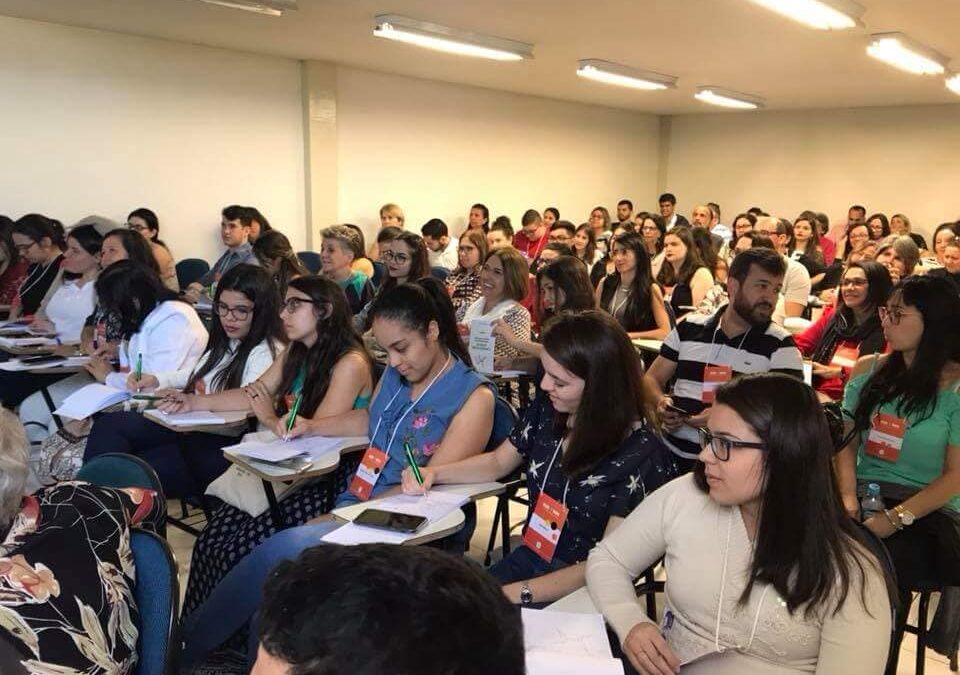
Oct 1, 2018 | Focolare Worldwide
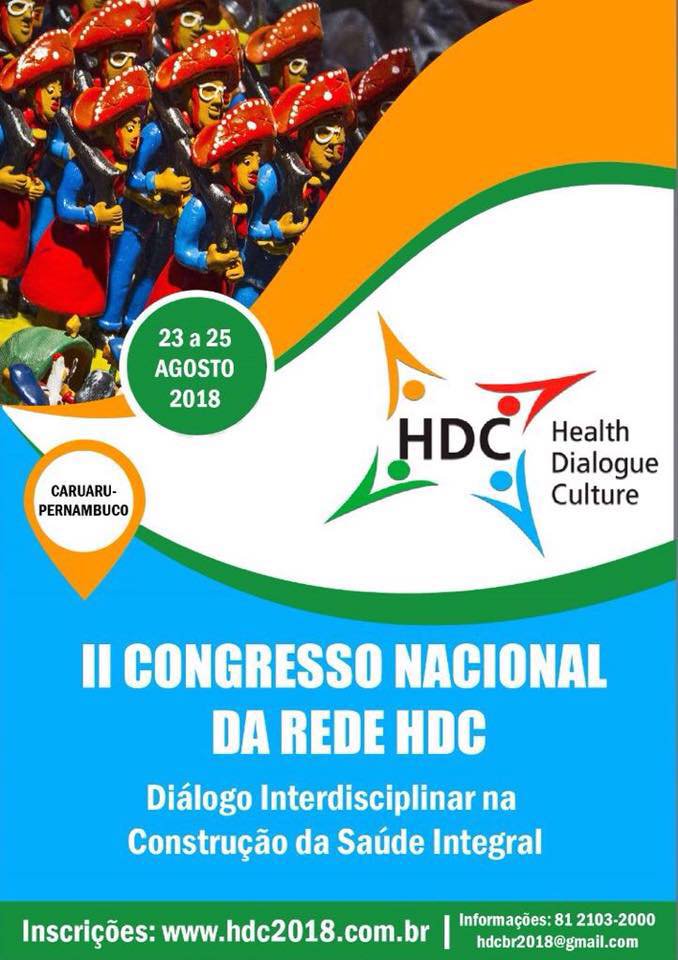 “Years ago, the doctor-patient relationship used to be called ‘a silent story.’ It was held that a good patient would follow a doctor’s orders without objection, without asking questions,” said Flavia Caretta, geriatric doctor at the A. Gemelli clinic in Rome and spokesperson for Health Dialogue Culture. She was also one of the organizers of its most recent conference at Caruaru, in the state of Pernambuco, Brazil, titled “Interdisciplinary dialogue in building holistic health” (23–25 August). Health Dialogue Culture connects medical professionals who, taking inspiration from Chiara Lubich’s spirituality of unity, started a series of reflections and knowledge sharing about curing the sick and considering them holistically. Close to 400 professionals attended the conference from every part of Brazil. “Patient dissatisfaction because of poor communication,” observes Caretta, “results higher than almost any other dissatisfaction about technical competence. Technological culture has caused those in the know to specialize, yet this often fractures the patient’s identity and the interpersonal relationships between those getting cured and those doing the curing. The risk is losing, or never even obtaining, the ability to see the infirm in their entirety… “Each call for a cure brings with it a need for relationship. To ignore this aspect means to reduce medicine to simply applying techniques or offering a service, when above all it is a meeting with a person.
“Years ago, the doctor-patient relationship used to be called ‘a silent story.’ It was held that a good patient would follow a doctor’s orders without objection, without asking questions,” said Flavia Caretta, geriatric doctor at the A. Gemelli clinic in Rome and spokesperson for Health Dialogue Culture. She was also one of the organizers of its most recent conference at Caruaru, in the state of Pernambuco, Brazil, titled “Interdisciplinary dialogue in building holistic health” (23–25 August). Health Dialogue Culture connects medical professionals who, taking inspiration from Chiara Lubich’s spirituality of unity, started a series of reflections and knowledge sharing about curing the sick and considering them holistically. Close to 400 professionals attended the conference from every part of Brazil. “Patient dissatisfaction because of poor communication,” observes Caretta, “results higher than almost any other dissatisfaction about technical competence. Technological culture has caused those in the know to specialize, yet this often fractures the patient’s identity and the interpersonal relationships between those getting cured and those doing the curing. The risk is losing, or never even obtaining, the ability to see the infirm in their entirety… “Each call for a cure brings with it a need for relationship. To ignore this aspect means to reduce medicine to simply applying techniques or offering a service, when above all it is a meeting with a person. 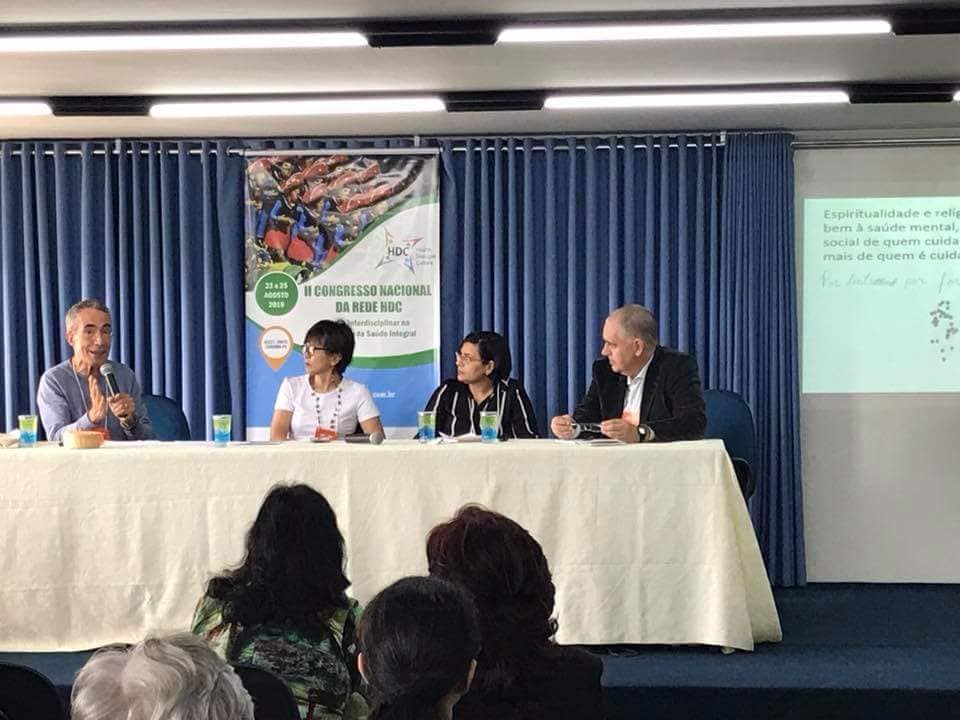 “The quality of the clinical conversation should not only depend on the application of scientific knowledge or the ‘ability’ of someone to communicate, but also their ability to enter in to what the patient is going through. The process of assisting them cannot just be considered a protocol to break down into procedures, because it implies a human dimension that is unpredictable and cannot be standardized, all mutually at play within the relationship. “No healing gesture has its complete effect without entering into relationship with the other … Among the new trends in medicine, in addition to communication and personalized cures, there is a new emphasis on lifestyle, to the role that community and society play in health, especially its spiritual side. “I would like to offer some processes that have been trialed and shared by many professionals in different fields, different places in the world and cultures. They instill their lives, as well as their professions, with the values found in the Focolare spirituality… “These strategies have been proven to be effective in relating with patients. For example listening, which requires setting aside worries, judgements, hurried diagnoses, in order to make space for what the patient wants to communicate with words, expressions, and silence. “Silence, too, is communication, and is sometimes more eloquent than anything to be understood in a conversation. There is also the commitment to succeed in identifying with the present moment, free from the hurry and conditions that could cloud the choices to make.”
“The quality of the clinical conversation should not only depend on the application of scientific knowledge or the ‘ability’ of someone to communicate, but also their ability to enter in to what the patient is going through. The process of assisting them cannot just be considered a protocol to break down into procedures, because it implies a human dimension that is unpredictable and cannot be standardized, all mutually at play within the relationship. “No healing gesture has its complete effect without entering into relationship with the other … Among the new trends in medicine, in addition to communication and personalized cures, there is a new emphasis on lifestyle, to the role that community and society play in health, especially its spiritual side. “I would like to offer some processes that have been trialed and shared by many professionals in different fields, different places in the world and cultures. They instill their lives, as well as their professions, with the values found in the Focolare spirituality… “These strategies have been proven to be effective in relating with patients. For example listening, which requires setting aside worries, judgements, hurried diagnoses, in order to make space for what the patient wants to communicate with words, expressions, and silence. “Silence, too, is communication, and is sometimes more eloquent than anything to be understood in a conversation. There is also the commitment to succeed in identifying with the present moment, free from the hurry and conditions that could cloud the choices to make.” 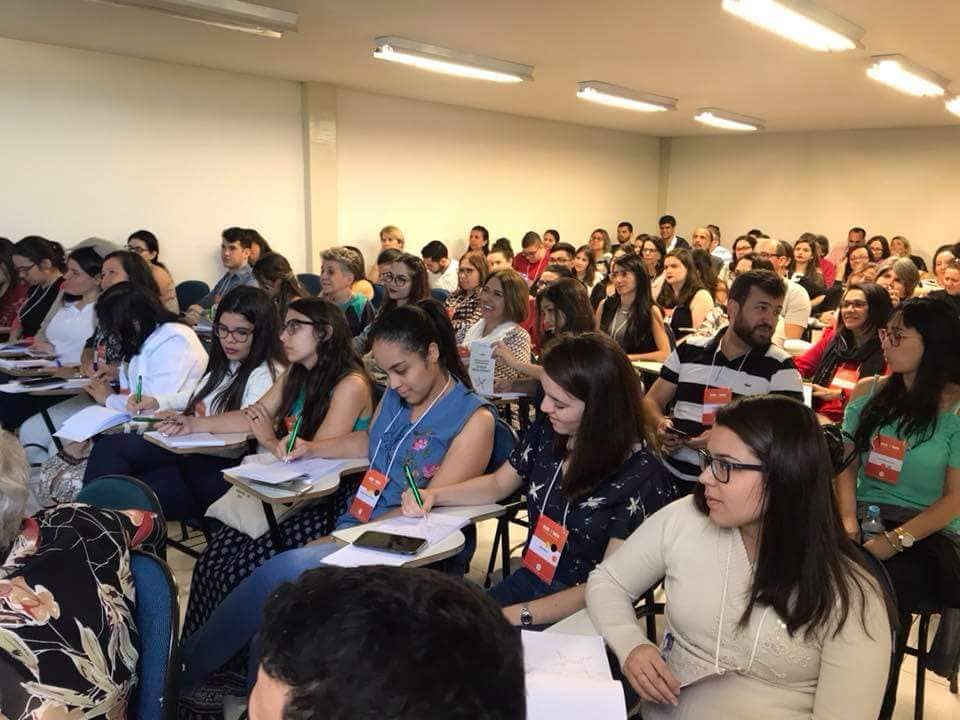 The consistency between spiritual values and applying them in a profession, highlighted Caretta, “does not only concern our rapport with patients. It is more essential than ever to act together with other disciplines. Especially in the last few years, scientific journals aimed at improving health services and the quality of care emphasize a care team, teamwork, and a multidisciplinary approach… “I remember something Vaclav Havel, poet and the first president of the Czech Republic, said: ‘Hope is not believing that things will change. Hope is believing that you can make a difference.” Reciprocity can transform every part of the health world, whether a health professional or patient, and every part of the academic world, whether student or scholar, to be agents of change.” For contacts, news and research, see healthdialogueculture.org.
The consistency between spiritual values and applying them in a profession, highlighted Caretta, “does not only concern our rapport with patients. It is more essential than ever to act together with other disciplines. Especially in the last few years, scientific journals aimed at improving health services and the quality of care emphasize a care team, teamwork, and a multidisciplinary approach… “I remember something Vaclav Havel, poet and the first president of the Czech Republic, said: ‘Hope is not believing that things will change. Hope is believing that you can make a difference.” Reciprocity can transform every part of the health world, whether a health professional or patient, and every part of the academic world, whether student or scholar, to be agents of change.” For contacts, news and research, see healthdialogueculture.org.
Oct 1, 2018 | Focolare Worldwide
More than 1,200 cadavers have been recovered following an earthquake and tsunami that hit the island of Sulawesi. The Vatican is reporting that “1, 203 bodies have been recovered, but some have not yet been found or identified,” says Insan Nurrohman, vice president of Aksi Cepat Tanggap, one of the principal Indonesian NGOs. Rescue workers are labouring around the clock. Managing to remove people who are still alive is very delicate work. “The government is sending in bulldozers to clear the areas,” says Matteo Amogoni, who is in charge of Caritas Italy for Indonesia and Philippines, “but there is also the problem of no electricity and petrol. At the Angelus, Pope Francis said: “I pray for the deceased, who are unfortunately many, for the wounded and for those who have lost home and work. May the Lord console those who have survived and provide those involved in the rescue effort with strength.”
Sep 30, 2018 | Non categorizzato
“You who have gone through so many seasons are the living testimony of constancy in adversity, but also of the gift of prophecy that reminds the young generations that the care and protection of the ones who preceded them are gratifying and appreciated by God, and that they cry out to God when they are disregarded.” When Pope Francis spoke these words last September 24th, he was speaking to the elderly audience in front of him in the Cathedral of Saint James in Riga (Republic of Latvia). But he was also speaking to the elderly of the whole world, in view of the international day dedicated to them on October 1st. “You that have spent yourselves, body and soul, that have given your life in the pursuit of freedom for your country, are now often left feeling that you have been forgotten. Although it sounds paradoxical in today’s world, in the name of freedom, free people subject the elderly to solitude, ostracism, lack of resources, esclusion and even misery. […] You that have gone through many seasons, never forget that you are the roots of a people.”
Sep 30, 2018 | Non categorizzato
Hope I never would have thought that our parents would separate. But when it happened, and we were faced with an uncertain future that was completely unknown and the fact that life would never be the same again, I began having many sad and confused thoughts. We three brothers stayed with our Mum,“Our super-Mum,” as we called her. But everything was different. Even though we never had problems at school before, now we were beginning to have them. As soon as we noticed it, we began trying to give her some joy. Living with Papa wasn’t easy, but ever since we were small, our parents and grandparents had taught us not to judge. One of our nicest times together is when we gather to pray, asking God to accomplish his plan for each one of us. J. P. L. – Colombia Difficult Student Many years ago a particularly difficult student arrived in my class, because of some family problem. Since he had violent outbursts, some of the other parents protested with the director. Faced with the possibility that he might be expelled, I obtained permiission to take him into my personal care, advising my colleagues of the situation and receiving help from the students.Simultaneously, a family of friends made contact with his parents to help them until their situation was worked out. A long time later I returned to that city, which I hadn’t been to in many years. I saw my student again, now all grown and turned into the proud father of a family. T. M. – Italy Cake One of our neighbors was opposed to the restructuring work we were doing on our little house, expressing objections that were obviously unjustified. Tired of receiving his letters and protestations, my husband consulted a lawyer with the thought of bringing a case against him. But then, as we talked abou it, we decided on another path which seemed to be suggested by our heart. We would try to create a bridge between us and him. I baked a cake and we went to see him. He asked: “How did you ever know that today was our daughter’s birthday?” The expected clash had been transformed into an encounter. A few days later they visited us and now we have some new friends. M. – Spain The Wall Seven years of marriage had not led to the desired union of our hearts. Sand and discouraged, we thought that the reason was immaturity and incomptability of character. In this atmosphere we were led to judge and the wall of non-communication between us had grown higher and higher. Moreover, we were also burdened with feelings of guilt for not having been able to convey to our children the love that a husband and wife should give witness to. When we had already given up, some friends sho live the Gospel helped us to break down that wall. Also, there were signals coming from my wife that made me very hopeful. We learned to accept one another, to say sorry when we failed, to see look upon each other as a gift and to consider our failures as an opportunity to begin again. Helped by the friendship and prayers of others, we could feel that God loved us and had kept our family going. L. – Italy
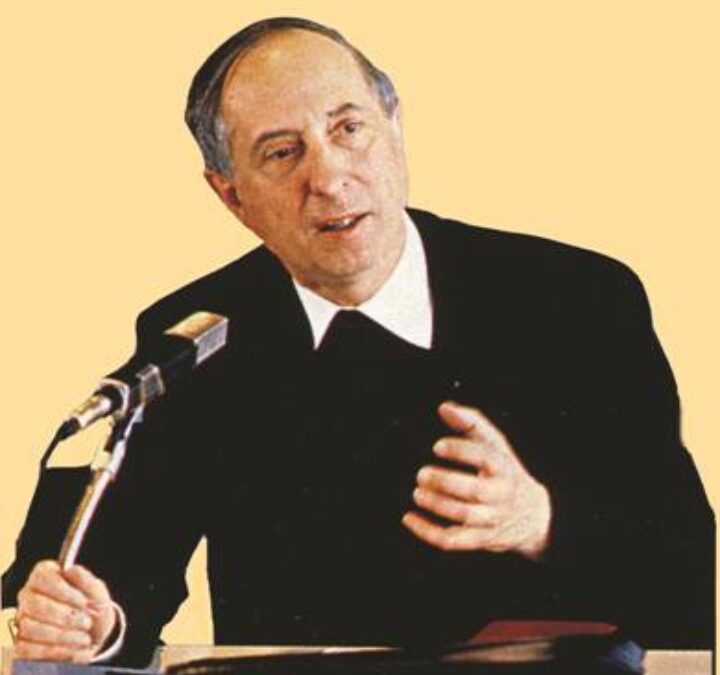
Sep 28, 2018 | Non categorizzato
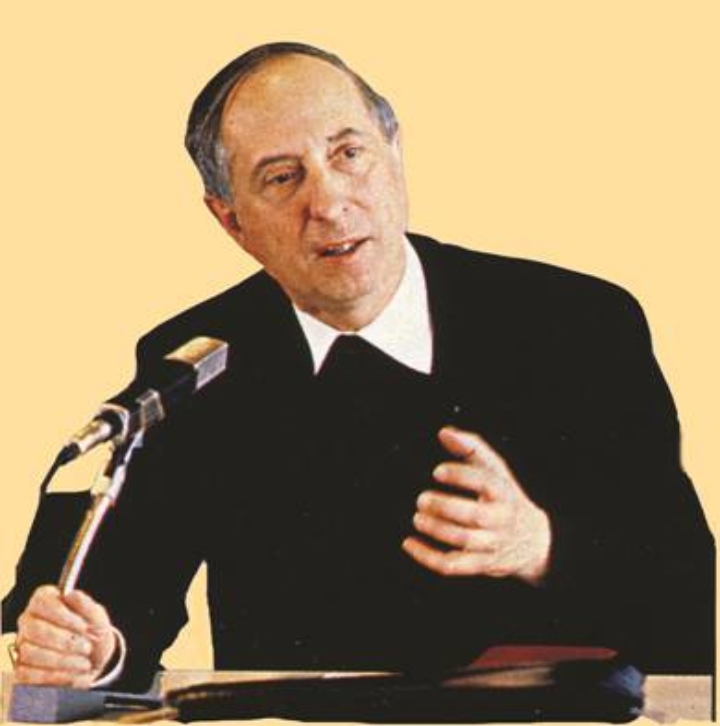 “Whatever you did to one of the least of these brothers and sisters of mine, you did it to me” (Mt 26:40). This sentence from the Gospel is the most definitive word on what a human being is. This definition is no less scandalous than Jesus declaring himself Son of God. In the name of their personal freedom, identity and uniqueness, human beings think that they have a right to contest the fact that they are so identified with Jesus Christ. Human beings want to be loved for themselves, for who they are, and not to be degraded as some sort of mask for Jesus. Human beings fear that the “bit more” of love that they receive out of love for Jesus might not take them into account, might rob them of the love they need and desire for themselves. But who could neglect their neighbours while trying to love Jesus in them (and in this way also neglect Jesus)? And who could claim that acknowledging the presence of Jesus in others means diminishing their human dignity; in that case they have not understood the presence of Jesus in their neighbours. Since Jesus has identified himself with humankind – God himself who is Love – he has also identified himself with every individual human being. But love is never an affirmation of oneself that consumes and annihilates others. It’s something that gives of itself, and, in its self-giving, provides others with the freedom to be themselves. Jesus never leaves me alone. He is on my side, he accepts me just as I am, and whatever concerns me, also concerns Him. I remain myself. Indeed, I become my fullest self precisely because I never remain alone. The mystery of Christ is the mystery of every human being. What does this mean for the people I meet, and what does it mean for me and my life? For what regards other people, it means that I am never dealing merely with a link in the chain, a cog in the wheel, or just a number in the huge numbers of people that exist. Each time I look upon a human face, I meet God in his unconditioned state, I encounter that voice that still declares over the face of every human being, what was said of Jesus during the Transfiguration on that mountaintop: “This is my beloved son!” (Mk 9:7). There are no exceptions… A human cannot rob itself of its ultimate reality. Whether he is a criminal or a scoundrel, I can never again write him off as a lost case. I encounter Christ in every person not because the person is good or deserving, not even because he or she draws upon the divine light in their personal lives, but because God has irrevocably adopted them as his own sons and daughters. Certainly the human being is immense because of the Divine life that he and she have let into their souls because of their personal choice to believe, which took place in baptism in the name of Jesus. Belonging to Jesus is something “automatic.” When a person is born, Christ has already assumed into himself that person’s living and dying, fault and self-inflicted wounds: everything is assumed into the life and death of Christ who gave his life for each one of us. This is why we encounter Jesus in every human being. And we encounter him in a particular way in the least, in those who seem to be farthest from Him, in the people in whom his face seems to be most overshadowed. Why? Because on the cross, during his abandonment by God, even becoming sin (2 Cor 5:21), Jesus identified himself with what is farthest from God, what seems most opposed to God. [It is only by] discovering Christ in our neighbours and giving to each of them that human love with which you turn towards every neighbour, with an indivisible love that is therefore directed to Christ himself, that will enable every neighbour to discover his and her own identity with Jesus, their own nearness to Jesus, being completely assumed by Him.” (From “Offene Weltformel”, by Klaus Hemmerle, Neue Stadt, 1970)
“Whatever you did to one of the least of these brothers and sisters of mine, you did it to me” (Mt 26:40). This sentence from the Gospel is the most definitive word on what a human being is. This definition is no less scandalous than Jesus declaring himself Son of God. In the name of their personal freedom, identity and uniqueness, human beings think that they have a right to contest the fact that they are so identified with Jesus Christ. Human beings want to be loved for themselves, for who they are, and not to be degraded as some sort of mask for Jesus. Human beings fear that the “bit more” of love that they receive out of love for Jesus might not take them into account, might rob them of the love they need and desire for themselves. But who could neglect their neighbours while trying to love Jesus in them (and in this way also neglect Jesus)? And who could claim that acknowledging the presence of Jesus in others means diminishing their human dignity; in that case they have not understood the presence of Jesus in their neighbours. Since Jesus has identified himself with humankind – God himself who is Love – he has also identified himself with every individual human being. But love is never an affirmation of oneself that consumes and annihilates others. It’s something that gives of itself, and, in its self-giving, provides others with the freedom to be themselves. Jesus never leaves me alone. He is on my side, he accepts me just as I am, and whatever concerns me, also concerns Him. I remain myself. Indeed, I become my fullest self precisely because I never remain alone. The mystery of Christ is the mystery of every human being. What does this mean for the people I meet, and what does it mean for me and my life? For what regards other people, it means that I am never dealing merely with a link in the chain, a cog in the wheel, or just a number in the huge numbers of people that exist. Each time I look upon a human face, I meet God in his unconditioned state, I encounter that voice that still declares over the face of every human being, what was said of Jesus during the Transfiguration on that mountaintop: “This is my beloved son!” (Mk 9:7). There are no exceptions… A human cannot rob itself of its ultimate reality. Whether he is a criminal or a scoundrel, I can never again write him off as a lost case. I encounter Christ in every person not because the person is good or deserving, not even because he or she draws upon the divine light in their personal lives, but because God has irrevocably adopted them as his own sons and daughters. Certainly the human being is immense because of the Divine life that he and she have let into their souls because of their personal choice to believe, which took place in baptism in the name of Jesus. Belonging to Jesus is something “automatic.” When a person is born, Christ has already assumed into himself that person’s living and dying, fault and self-inflicted wounds: everything is assumed into the life and death of Christ who gave his life for each one of us. This is why we encounter Jesus in every human being. And we encounter him in a particular way in the least, in those who seem to be farthest from Him, in the people in whom his face seems to be most overshadowed. Why? Because on the cross, during his abandonment by God, even becoming sin (2 Cor 5:21), Jesus identified himself with what is farthest from God, what seems most opposed to God. [It is only by] discovering Christ in our neighbours and giving to each of them that human love with which you turn towards every neighbour, with an indivisible love that is therefore directed to Christ himself, that will enable every neighbour to discover his and her own identity with Jesus, their own nearness to Jesus, being completely assumed by Him.” (From “Offene Weltformel”, by Klaus Hemmerle, Neue Stadt, 1970)
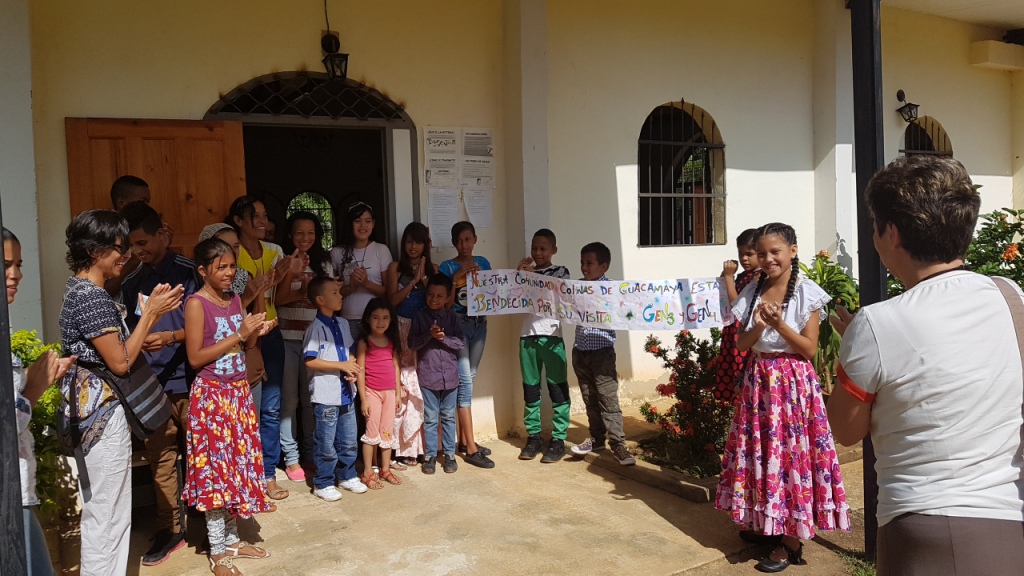
Sep 27, 2018 | Focolare Worldwide
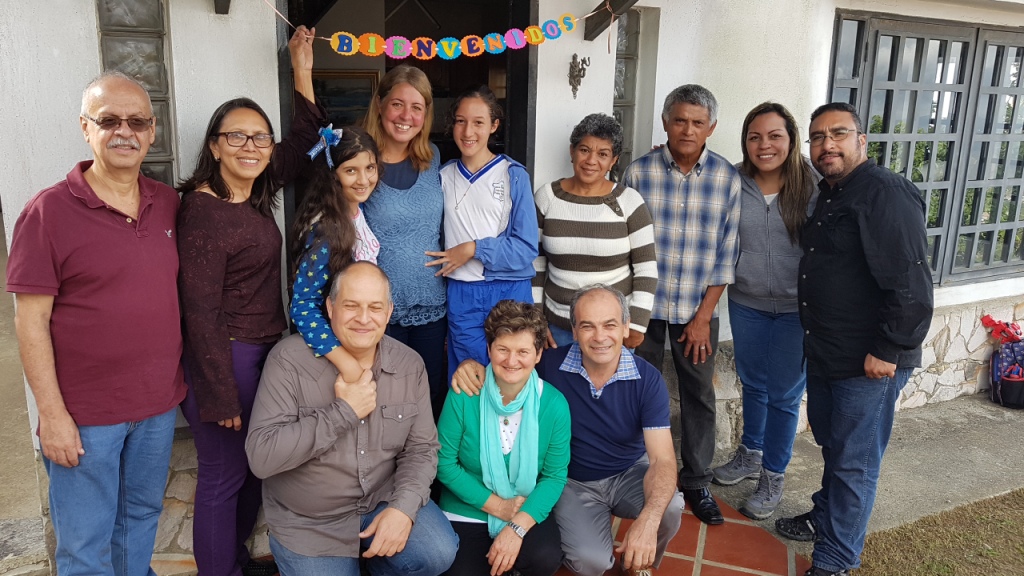 Families scattered, poverty, extreme insecurity, rising costs, lack of food, public transport, electricity and running water…an entire country in crisis that seemed to be expressed in the prayer of Grace before the first supper that Agostino and Marisa shared in the land of Venezuela: “Lord, thank you that we were able to find this food to share.” “We had planned a meeting with families, first at the Mariapolis Centre near Caracas and, then, in Valencia and Maracaibo. Emeris and Oscar accompanied us and allowed us to participate in their life.” Agostino and Marisa had lived for many years in Santo Domingo, and now they find themselves re-living their experience of poverty, suffering and separation from relatives that forced them to emigrate. It was the same experience of thousands and thousands of Italians who had fled in the aftermath of the Second World War. They had boarded ships with luggage made of cardboard. “For decades the Venezuelan people have welcomed immigrants and now finds itself also forced to emigrate. From wealth and security to extreme insecurity. They said: ‘We were well-off, surrounded by abundance, but we never knew until now how precious it all was. The crisis is the greatest blessing for people and nations, because it leads to progress. Creativity is born from despair as day is born from a dark night, said Albert Einstein in 1931.’ “It took courage to hear those words,” that were spoken in a video produced by the Focolare’s New Families Movement. The families asked to see it again the next day. They told us: ‘You had lived in Santo Domingo and in Cuba so that you could help us here today.’ This economic crisis opened our eyes to the needs of our neighbors.”
Families scattered, poverty, extreme insecurity, rising costs, lack of food, public transport, electricity and running water…an entire country in crisis that seemed to be expressed in the prayer of Grace before the first supper that Agostino and Marisa shared in the land of Venezuela: “Lord, thank you that we were able to find this food to share.” “We had planned a meeting with families, first at the Mariapolis Centre near Caracas and, then, in Valencia and Maracaibo. Emeris and Oscar accompanied us and allowed us to participate in their life.” Agostino and Marisa had lived for many years in Santo Domingo, and now they find themselves re-living their experience of poverty, suffering and separation from relatives that forced them to emigrate. It was the same experience of thousands and thousands of Italians who had fled in the aftermath of the Second World War. They had boarded ships with luggage made of cardboard. “For decades the Venezuelan people have welcomed immigrants and now finds itself also forced to emigrate. From wealth and security to extreme insecurity. They said: ‘We were well-off, surrounded by abundance, but we never knew until now how precious it all was. The crisis is the greatest blessing for people and nations, because it leads to progress. Creativity is born from despair as day is born from a dark night, said Albert Einstein in 1931.’ “It took courage to hear those words,” that were spoken in a video produced by the Focolare’s New Families Movement. The families asked to see it again the next day. They told us: ‘You had lived in Santo Domingo and in Cuba so that you could help us here today.’ This economic crisis opened our eyes to the needs of our neighbors.” 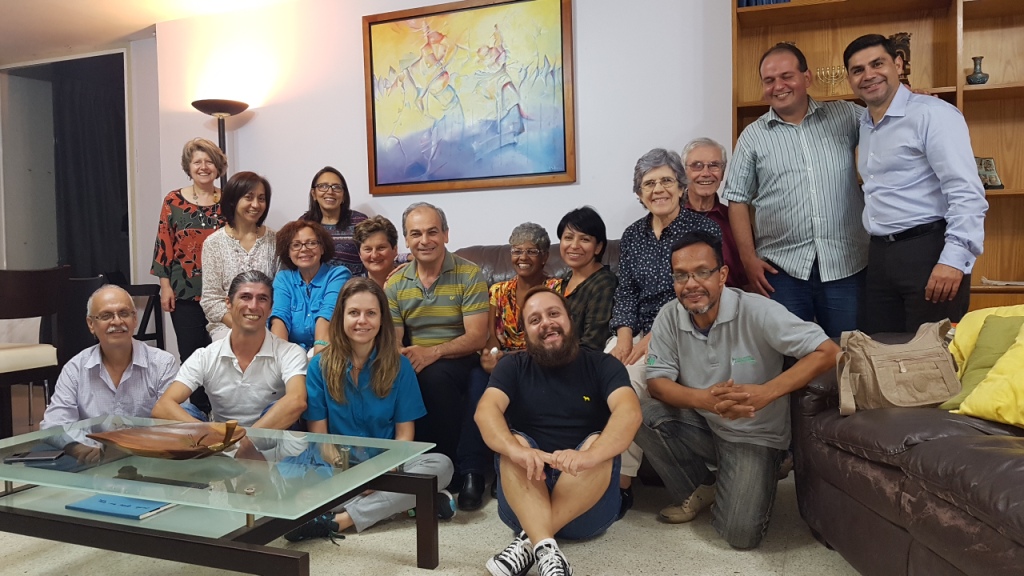 We had a tight schedule in Caracas as the visit went on: “conversations, lunches and dinners with families. They took turns coming to Emeris’ and Oscar’s home. We shared an experience with them that had proven fundamental for us. Having to decide where to live and having completely different ways of thinking, one night, we made a pact to embrace the other’s desires as our own. It suddenly appeared as an unexpected solution that contained all the elements that were important for each of us, but it was novel, a fruit of mutual love.” They recounted: “Many families have a car, but it’s becoming more and more difficult to repair maintain them, both because of the cost and the lack of professional mechanics who are fleeing the country. And the worn out tires are a big problem. A few days later we bought two of the four tires, using the money we had saved for groceries. We put them on the car and were able to keep travelling.”
We had a tight schedule in Caracas as the visit went on: “conversations, lunches and dinners with families. They took turns coming to Emeris’ and Oscar’s home. We shared an experience with them that had proven fundamental for us. Having to decide where to live and having completely different ways of thinking, one night, we made a pact to embrace the other’s desires as our own. It suddenly appeared as an unexpected solution that contained all the elements that were important for each of us, but it was novel, a fruit of mutual love.” They recounted: “Many families have a car, but it’s becoming more and more difficult to repair maintain them, both because of the cost and the lack of professional mechanics who are fleeing the country. And the worn out tires are a big problem. A few days later we bought two of the four tires, using the money we had saved for groceries. We put them on the car and were able to keep travelling.”  Two hours from Caracas the people of Valencia were suffering lack of water and the difficulty in transport. “In a rural town, Guacamaya, we met the community that had first been in touch with Ofelia who was forced to leave. They decided to find a way to carry on without having to leave their home” There were also quite a few young people “like sponges absorbing everything.” Two days later the trip to Maracaibo was in jeopardy because of the inspection stops on the roadway. But everything went well. Without electric current everything was more difficult: the terrible heat and the impossibility of turning on the air-conditioners, the lack of internet and entire programmes that just had to be cancelled. The night we were supposed to return to the city, so a supper was awaiting us with two families, that night at another family and breakfast with still another family in order not to be a financial burden on anyone. On the way, the road was blocked by a group of demonstrators which forced us to turn around. The family that took us in didn’t have anything for supper. We took some pasta out of our suitcases and cooked ourselves. It was a very beautiful evening. Incredibly, there was electric power that allowed us to sleep that night. The next day, arriving in Maracaibo, we learned that there was no electricity and the change in programme came as quite a relief for everyone.” They also recounted: “”On the morning of the meeting with the community, public transport was scarce and there were long queues for refuelling. The family that had organized everything arrived after quite a long adventure. Their daughter had proposed that they pray for a vehicle that would take them the rest of the way and, shortly afterwards, a car stopped and offered them a ride.” This too is Venezuela.
Two hours from Caracas the people of Valencia were suffering lack of water and the difficulty in transport. “In a rural town, Guacamaya, we met the community that had first been in touch with Ofelia who was forced to leave. They decided to find a way to carry on without having to leave their home” There were also quite a few young people “like sponges absorbing everything.” Two days later the trip to Maracaibo was in jeopardy because of the inspection stops on the roadway. But everything went well. Without electric current everything was more difficult: the terrible heat and the impossibility of turning on the air-conditioners, the lack of internet and entire programmes that just had to be cancelled. The night we were supposed to return to the city, so a supper was awaiting us with two families, that night at another family and breakfast with still another family in order not to be a financial burden on anyone. On the way, the road was blocked by a group of demonstrators which forced us to turn around. The family that took us in didn’t have anything for supper. We took some pasta out of our suitcases and cooked ourselves. It was a very beautiful evening. Incredibly, there was electric power that allowed us to sleep that night. The next day, arriving in Maracaibo, we learned that there was no electricity and the change in programme came as quite a relief for everyone.” They also recounted: “”On the morning of the meeting with the community, public transport was scarce and there were long queues for refuelling. The family that had organized everything arrived after quite a long adventure. Their daughter had proposed that they pray for a vehicle that would take them the rest of the way and, shortly afterwards, a car stopped and offered them a ride.” This too is Venezuela.
Sep 27, 2018 | Focolare Worldwide
The Holy See diffused a new message, with the invitation to “proceed with confidence, courage and foresight, with the dialogue long pursued” with the People’s Republic of China, “in order to grow in authentic friendship.” The recent agreement between the Holy See and the People’s Republic of China, signed a few days ago in Beijing– an agreement that unlocked the nomination of bishops and ratified the “readmission” to full communion with Rome of eight “official” bishops – is opening a new page of friendship which has now resolved the conflicts of the past. China and the Apostolic See – Pope Francis said in his message – “are called upon by history to an arduous but challenging task, so they may act more positively for the orderly and harmonic growth of the Catholic community in China and promote the integral development of society, ensuring greater respect for the human being also in the religious field,” and lastly, that “they shall work concretely to protect the environment in which we live and edify a future of peace and brotherhood between peoples.”

Sep 27, 2018 | Non categorizzato
 Dates: 27, 28 and 29 October: workshop with young people 30 october: Concert From the Inside Outside – Conservatoire de la Ville de Luxembourg 31 october: Feedback GenVerde Tours
Dates: 27, 28 and 29 October: workshop with young people 30 october: Concert From the Inside Outside – Conservatoire de la Ville de Luxembourg 31 october: Feedback GenVerde Tours
![Politics as a vocation]()
Sep 26, 2018 | Non categorizzato
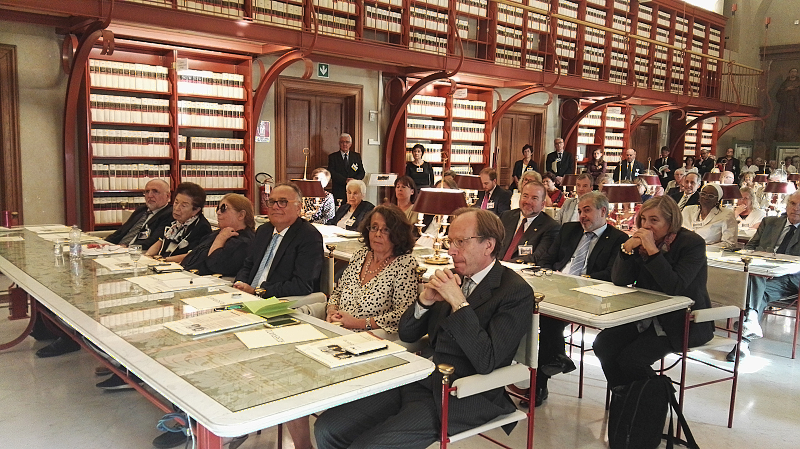 The event saw the participation of members of the Italian parliament and the European Parliament, ambassadors, teachers, academics and many people who knew Giordani also through his writings. Promoted by the Focolare Movement with the Chiara Lubich Center, Igino Giordani Center and the political Movement for unity, for years now universities of the five continents, associations and local entities, have been supporting and sharing the fundaments of the cultural, social and political project, which are based on the vital encounter between Chiara Lubich and Giordani. We can thus say that the meeting in Rome was the expression of a long partnership and synergy amongst many. Upon opening the convention, Donato Falmi, Co-Director of the Focolare in Rome, read the greeting and message of the President of the Italian Republic to the Focolare President, Maria Voce: “…in expressing my appreciation for this initiative, aimed at nurturing the example of men and women who worked to promote the universal values of peace, brotherhood and solidarity, President Mattarella is conveying to you and the entire Focolare Movement, his best regards and greetings.” “I had the fortune of meeting Igino Giordani because in my youth,” affirmed Steni Di Piazza, Senator of Palermo. “I met the young people of the Focolare, and attended educational congresses with them. In July 1979, I met Igino Giordani and he told me that when he met Chiara, he felt something new. After many years I understood that with that phrase, Giordani was referring to politics in the fraternal cooperation and dignity of all the members. And maybe the vocation to politics began to grow in me after that meeting with Igino.” “This is a good moment to discuss and commemorate that 18 September of 70 years ago, in order to try to highlight those values that marked such an occasion,” underlined Stefano Fassina, Congressman of Rome. “Politics as a vocation should be felt and lived by every citizen, since every citizen is called to be responsible for the public good.”
The event saw the participation of members of the Italian parliament and the European Parliament, ambassadors, teachers, academics and many people who knew Giordani also through his writings. Promoted by the Focolare Movement with the Chiara Lubich Center, Igino Giordani Center and the political Movement for unity, for years now universities of the five continents, associations and local entities, have been supporting and sharing the fundaments of the cultural, social and political project, which are based on the vital encounter between Chiara Lubich and Giordani. We can thus say that the meeting in Rome was the expression of a long partnership and synergy amongst many. Upon opening the convention, Donato Falmi, Co-Director of the Focolare in Rome, read the greeting and message of the President of the Italian Republic to the Focolare President, Maria Voce: “…in expressing my appreciation for this initiative, aimed at nurturing the example of men and women who worked to promote the universal values of peace, brotherhood and solidarity, President Mattarella is conveying to you and the entire Focolare Movement, his best regards and greetings.” “I had the fortune of meeting Igino Giordani because in my youth,” affirmed Steni Di Piazza, Senator of Palermo. “I met the young people of the Focolare, and attended educational congresses with them. In July 1979, I met Igino Giordani and he told me that when he met Chiara, he felt something new. After many years I understood that with that phrase, Giordani was referring to politics in the fraternal cooperation and dignity of all the members. And maybe the vocation to politics began to grow in me after that meeting with Igino.” “This is a good moment to discuss and commemorate that 18 September of 70 years ago, in order to try to highlight those values that marked such an occasion,” underlined Stefano Fassina, Congressman of Rome. “Politics as a vocation should be felt and lived by every citizen, since every citizen is called to be responsible for the public good.” 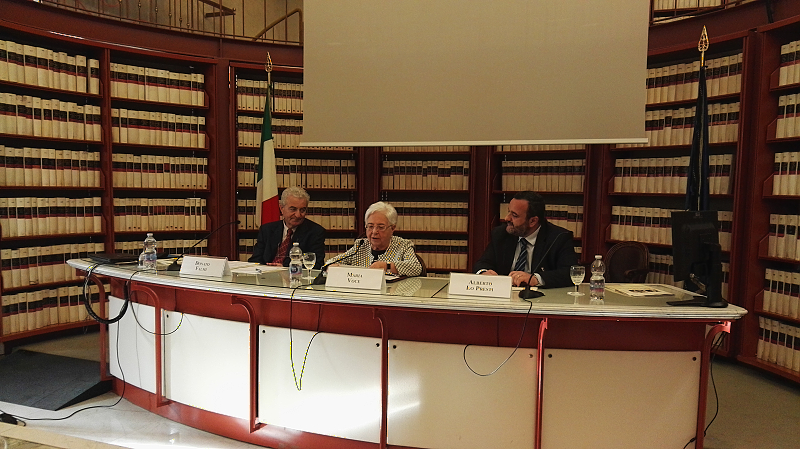 Going back to 18 September 1948, Giordani recounts the meeting with Chiara in his Memoirs: “I felt something new in the first words of that young lady. There was a note of deep and secure conviction which arose from a supernatural sentiment. So suddenly my curiosity was aroused and a fire inside me started to burn…” In that encounter Chiara brought with her the Ideal of unity. “She simply spoke about the divine adventure that had started a few years earlier in Trent, which already triggered the birth of a new Christian community,” Maria Voce affirmed in her speech. “From the beginning, the first focolare women and then the men, nurtured themselves on the Light of this Ideal, as also Igino Giordani, who Chiara spiritually fed through a prolific correspondence.” In the era of Catholic politics, Giordani was a leader. He not only worked in the Parliament but also in the Vatican. But the meeting with Chiara transformed him deeply. “He discovered unity in a new way, as the principle and value of human relationships, especially in politics,” stated the political scientist, Alberto Lo Presti. “That is, he understood that all the partial truths he had believed were decisive in doing good politics, were fulfilled in unity. (…) Unity is the banner of his political vocation.” Rocco Pezzimenti, Professor of the History of political doctrines in the Lumsa University of Rome reminds us of Giordani’s two publications: the first, published in 1949 entitled Dehumanism and the second, published in the 1960s, entitled The Two Cities, both of rare and also prophetic depth. Giordani clearly says that from St. Augustine, he acquired a fundamental characteristic: politics is not an improvised event. What occurs in politics is first developed interiorly.” “If there is a theme we should reflect on today, starting from that encounter between Igino and Chiara,” recalled Marina Sereni, former vice president of the House of Representatives – “it is precisely unity in politics today. And politics is a vocation if it centers on the Common Good, with those values which are not the property of one party, but which target unity.” Her words were shared by Beatrice Lorenzin, former Minister for Health, who affirmed how “Igino and Chiara were two masters in the history of the Italian Republic and who initiated something extraordinary. We need these reference points to help us make a dynamic and not hypocritical analysis.” Lastly, four testimonials. “The first time I heard about Giordani was in the summer of 1946,”recalls Congresswoman, Rosa Russo Iervolino, “when my parents were elected in the constituent assembly. Giordani’s interventions in the chamber were always respectful of the others but at the same time harsh in making the truth emerge. Giordani was so humble that his humility almost hid his intelligence which was dynamic and always popped up in other ways.”
Going back to 18 September 1948, Giordani recounts the meeting with Chiara in his Memoirs: “I felt something new in the first words of that young lady. There was a note of deep and secure conviction which arose from a supernatural sentiment. So suddenly my curiosity was aroused and a fire inside me started to burn…” In that encounter Chiara brought with her the Ideal of unity. “She simply spoke about the divine adventure that had started a few years earlier in Trent, which already triggered the birth of a new Christian community,” Maria Voce affirmed in her speech. “From the beginning, the first focolare women and then the men, nurtured themselves on the Light of this Ideal, as also Igino Giordani, who Chiara spiritually fed through a prolific correspondence.” In the era of Catholic politics, Giordani was a leader. He not only worked in the Parliament but also in the Vatican. But the meeting with Chiara transformed him deeply. “He discovered unity in a new way, as the principle and value of human relationships, especially in politics,” stated the political scientist, Alberto Lo Presti. “That is, he understood that all the partial truths he had believed were decisive in doing good politics, were fulfilled in unity. (…) Unity is the banner of his political vocation.” Rocco Pezzimenti, Professor of the History of political doctrines in the Lumsa University of Rome reminds us of Giordani’s two publications: the first, published in 1949 entitled Dehumanism and the second, published in the 1960s, entitled The Two Cities, both of rare and also prophetic depth. Giordani clearly says that from St. Augustine, he acquired a fundamental characteristic: politics is not an improvised event. What occurs in politics is first developed interiorly.” “If there is a theme we should reflect on today, starting from that encounter between Igino and Chiara,” recalled Marina Sereni, former vice president of the House of Representatives – “it is precisely unity in politics today. And politics is a vocation if it centers on the Common Good, with those values which are not the property of one party, but which target unity.” Her words were shared by Beatrice Lorenzin, former Minister for Health, who affirmed how “Igino and Chiara were two masters in the history of the Italian Republic and who initiated something extraordinary. We need these reference points to help us make a dynamic and not hypocritical analysis.” Lastly, four testimonials. “The first time I heard about Giordani was in the summer of 1946,”recalls Congresswoman, Rosa Russo Iervolino, “when my parents were elected in the constituent assembly. Giordani’s interventions in the chamber were always respectful of the others but at the same time harsh in making the truth emerge. Giordani was so humble that his humility almost hid his intelligence which was dynamic and always popped up in other ways.” 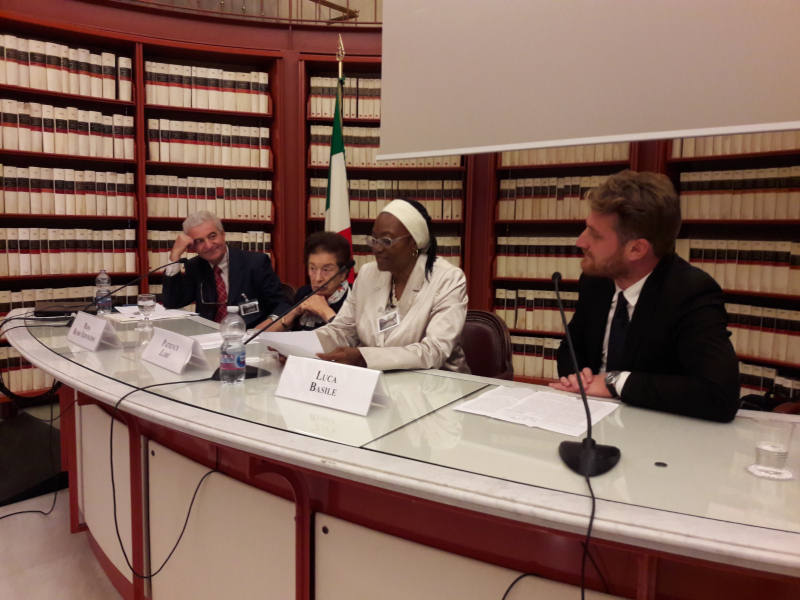 The following intervention was by Patience Lobe, first Cameroon woman to have been appointed in the Ministry as the Director of Public Works: “From the Focolare spirituality I learned coherence between life and words, and the importance of loving and serving the others. Having Chiara, a woman, as a model, gave me strength and courage, without ever making compromises. Chiara has opened my soul and intelligence to the Gospel.” To conclude, Luca Basile, President of the Town Council of Arzano in the province of Naples: “Thanks to the Focolare, I was able to live important experiences like cultural exchange and using it as a stimulus to my political commitment in the territory. My two predecessors resigned because the town council was dissolved due to mafia infiltration. You can fully understand how difficult it is to operate in such a territory, but we cannot lose hope when we have Chiara and Igino as our models.” “To implement what was generated from the encounter between Chiara Lubich and Giordani, we need to take upon us what the Country and humanity are going through,” affirmed Letizia De Torre, international coordinator of the Movement for Unity in Politics (MPPU). “May our commitment, imbued with the charism of Chiara Lubich, offer in a complex world, amazing possibilities for unity.” Lorenzo Russo
The following intervention was by Patience Lobe, first Cameroon woman to have been appointed in the Ministry as the Director of Public Works: “From the Focolare spirituality I learned coherence between life and words, and the importance of loving and serving the others. Having Chiara, a woman, as a model, gave me strength and courage, without ever making compromises. Chiara has opened my soul and intelligence to the Gospel.” To conclude, Luca Basile, President of the Town Council of Arzano in the province of Naples: “Thanks to the Focolare, I was able to live important experiences like cultural exchange and using it as a stimulus to my political commitment in the territory. My two predecessors resigned because the town council was dissolved due to mafia infiltration. You can fully understand how difficult it is to operate in such a territory, but we cannot lose hope when we have Chiara and Igino as our models.” “To implement what was generated from the encounter between Chiara Lubich and Giordani, we need to take upon us what the Country and humanity are going through,” affirmed Letizia De Torre, international coordinator of the Movement for Unity in Politics (MPPU). “May our commitment, imbued with the charism of Chiara Lubich, offer in a complex world, amazing possibilities for unity.” Lorenzo Russo
Sep 26, 2018 | Non categorizzato
The International Day established by the UN in 2013 reminds us of the necessity to totally eliminate nuclear weapons, to achieve the fundamental objective of peace and security. Atomic weapons, in fact, continue to represent an unacceptable menace to the world population. The date chosen by the UN recalls the evening of 26 September 1983, when the Soviet Colonel, Stanislav Petrov decided correctly, to retain as an error, the missile alarms from the Unites States that appeared on the screens, despite the contrary opinion of the technicians. Petrov chose, in the span of a few minutes, to not follow the procedure that would have led to the reaction of the Soviet Union with the launching of its own atomic bombs. The man who saved the world from a real nuclear holocaust, died in absolute anonymity in 2017, in a town not far from Moscow.
Sep 25, 2018 | Non categorizzato
A cloudy and humid day, and a sensation of emptiness. Only the day before I had celebrated my birthday, and made an ambitious wish: do all I can to make the new year shine as never before, imbuing each thing with love. I knew I would have had to start over again a thousand times, but I wanted to give my utmost. It was a sign of gratitude to Jesus for the gift of life. Not an isolated gift, but an intention valid for the entire year. He himself would have helped me. And yet, while going to an appointment, I felt that the cloudy sky was also inside me. I had allowed to silently creep into my heart a judgment of a brother who had once again disappointed me. It didn’t matter whether I was right or not. Inside me, charity was missing. I felt it with pain and I asked myself how I had gotten to that point. I came across a boy I often met. Dirty, stinky, with the usual bottle in hand. He was barefoot and shivering from the cold. He looked at me without a word. I greeted him courteously, thinking that in that way I was doing all I could, and continued my path. In that moment the Parable of the Good Samaritan came to mind. “Am I also like that Pharisee? Or do I let myself be challenged by that boy’s countenance of abandonment? I took off my sweater and went back. “Do you feel cold? “Yes, very” he answered. “Try on my sweater, let’s see if it fits.” He was so bewildered, but I almost didn’t dare touch him, since his hands really needed a good wash. “C’mon, try it on.” The size was perfect and his face seemed like that of a child on Christmas Eve. I greeted him and continued along my way, certainly feeling a bit cold, but happy. While waiting to meet my friend, a subtle voice spoke inside me. “What you did was nice, but what about that judgment you have?” “But Jesus – I answered – that person may not even have noticed it….” “But I did notice, I was in him.” One by one the arguments and excuses that came to mind were erased. Going home I decided to call him. A serene conversation, without any hard feeling on his part. Full unity was re-established, even if, to tell the truth, something inside me had snapped. A great, unmistakable peace invaded me. Two hours later, the doorbell rang. It was a dear friend, returning from his hometown with a gift for my birthday: a sweater! It was Jesus who was saying: “Raise the stakes!” From: “La vida se hace camino”, Urs Kerber, Ciudad Nueva Ed., Buenos Aires 2016, pp 41-42
Sep 24, 2018 | Focolare Worldwide
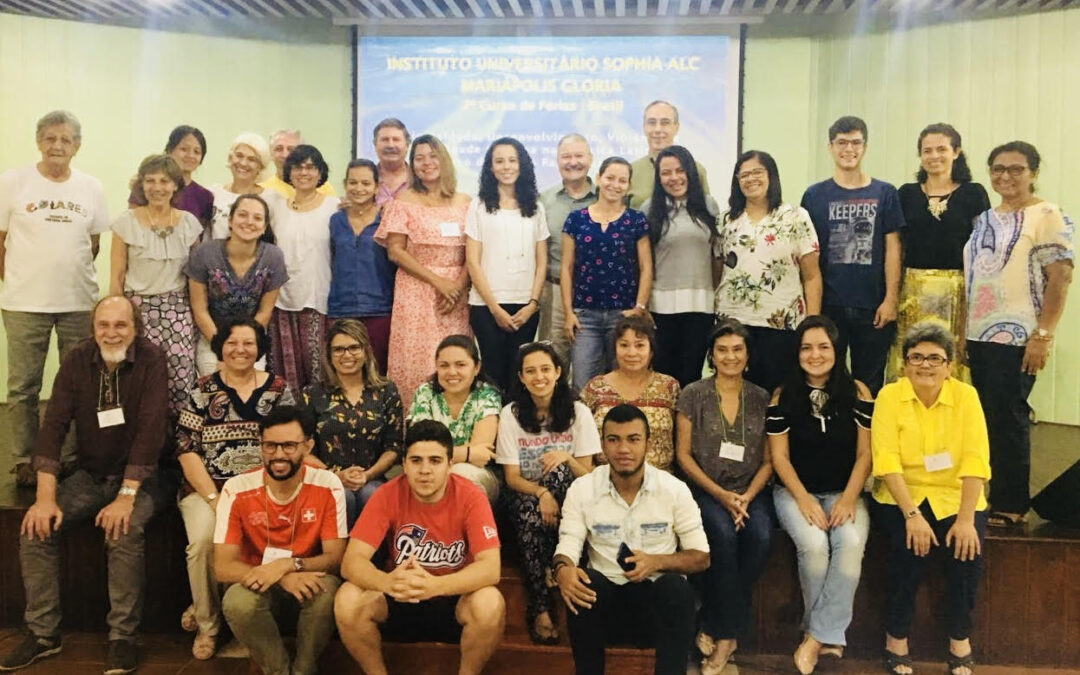
Sep 23, 2018 | Focolare Worldwide
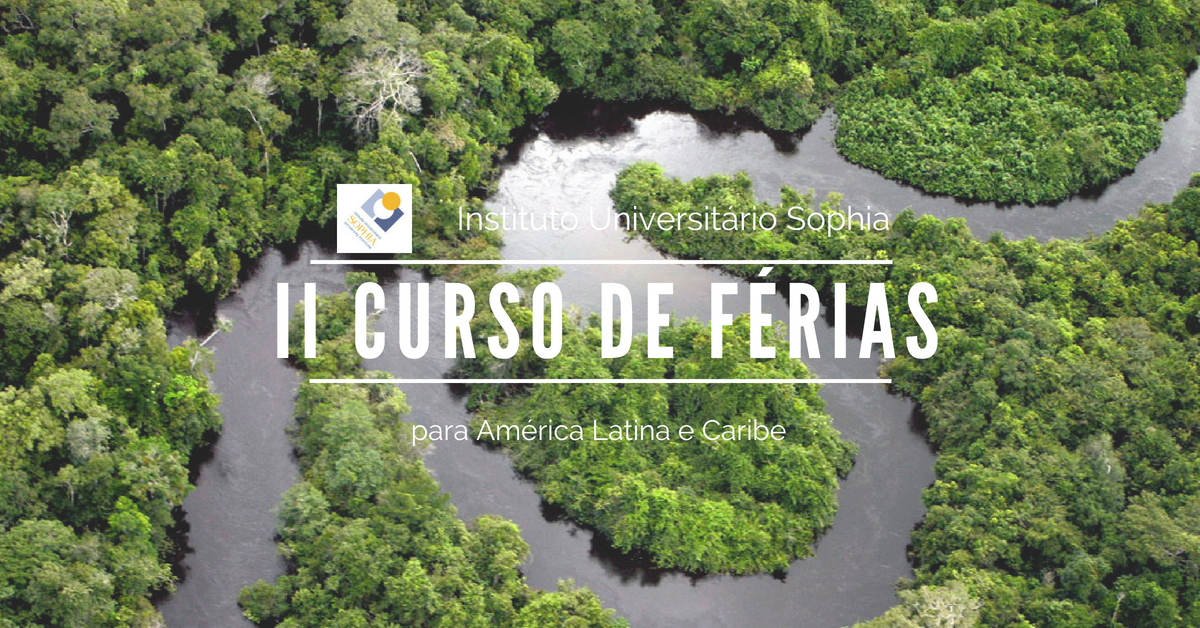 It is an immense territory that many describe with superlatives. It includes eight countries, from the Andes mountain chain, to the Atlantic Ocean, to the highlands of Brazil. It is the planet’s largest rain forest, unique in its dense, impenetrable vegetation that holds countless animal species. Thousands of miles of rivers cross it, including the immense Amazon River (which is around 6,400 kilometers long). Many cities have sprung up alongside it, such as Manaus and Belem in Brazil and Iquitos and Puerto Maldonado in Peru. When you hear Amazon Forest you think of the “lungs of the world,” although today it is a lung that is seriously threatened by deforestation and urbanization, which year after year shrink its borders and contaminate its purity. This symbolic and cultural image that the Amazon region is usually known by, as well as its traditional character linked to its exotic nature and rich natural resources, seemed far away this summer. The “Curso de Férias” (holiday course), promoted by Sophia University Institute and ALC (the promotion agency for the institute in Latin America and the Caribbean), was held July 22–28. It was entitled “Diversity, development, violence and human mobility in Latin America: the case of the Amazon region.” The course mostly emphasized an interdisciplinary approach. It included subjects such as biodiversity, socio-diversity, the lives of local populations (indigenous, those of African origin, “ribeirinhos” who live along the river, and many others), sustainable methods in agriculture, the meeting of various forms of religion, as well as the challenges of urbanization, violence and vested interests in agribusiness.
It is an immense territory that many describe with superlatives. It includes eight countries, from the Andes mountain chain, to the Atlantic Ocean, to the highlands of Brazil. It is the planet’s largest rain forest, unique in its dense, impenetrable vegetation that holds countless animal species. Thousands of miles of rivers cross it, including the immense Amazon River (which is around 6,400 kilometers long). Many cities have sprung up alongside it, such as Manaus and Belem in Brazil and Iquitos and Puerto Maldonado in Peru. When you hear Amazon Forest you think of the “lungs of the world,” although today it is a lung that is seriously threatened by deforestation and urbanization, which year after year shrink its borders and contaminate its purity. This symbolic and cultural image that the Amazon region is usually known by, as well as its traditional character linked to its exotic nature and rich natural resources, seemed far away this summer. The “Curso de Férias” (holiday course), promoted by Sophia University Institute and ALC (the promotion agency for the institute in Latin America and the Caribbean), was held July 22–28. It was entitled “Diversity, development, violence and human mobility in Latin America: the case of the Amazon region.” The course mostly emphasized an interdisciplinary approach. It included subjects such as biodiversity, socio-diversity, the lives of local populations (indigenous, those of African origin, “ribeirinhos” who live along the river, and many others), sustainable methods in agriculture, the meeting of various forms of religion, as well as the challenges of urbanization, violence and vested interests in agribusiness. 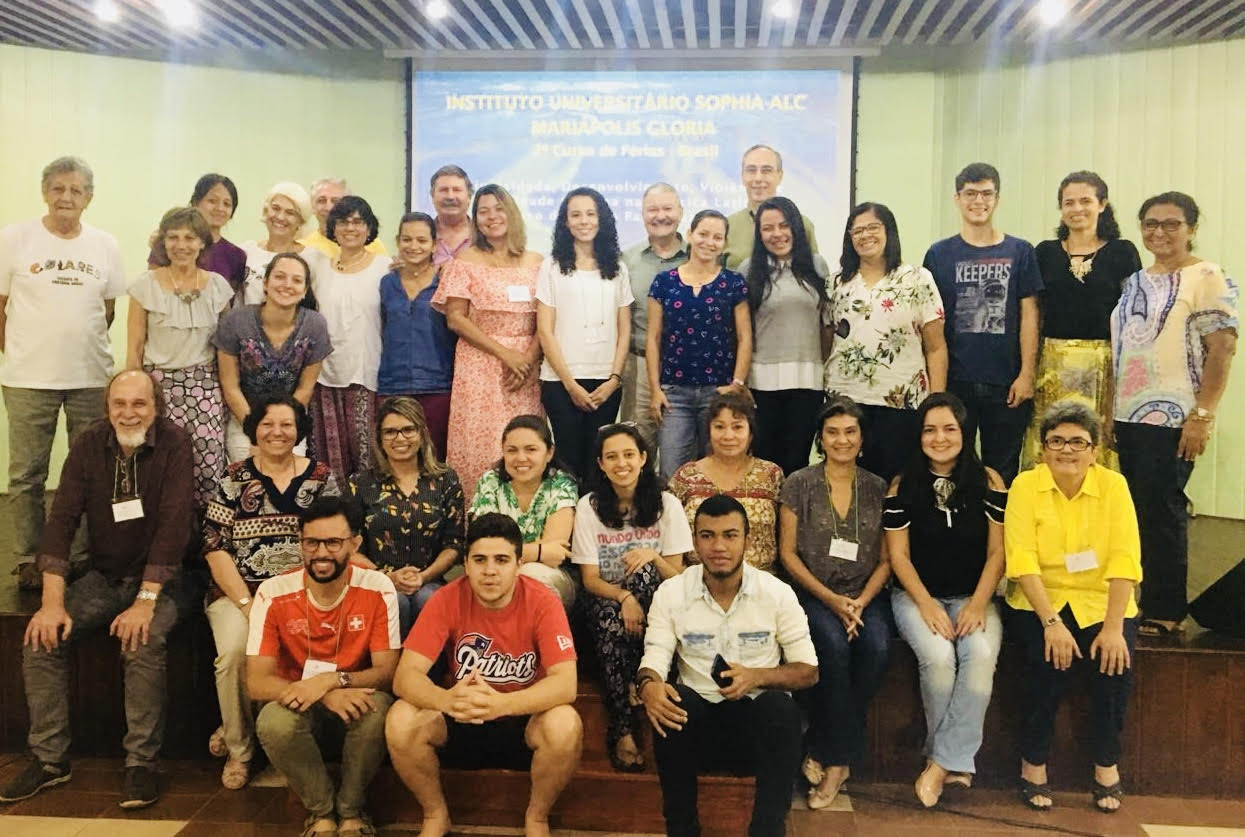 “We don’t speak of the forest; we are the forest. We don’t speak of the Amazon; we are the Amazon,” said Marcia Wayna Kambeba, from India, who was among those participating. Fifty students signed up: university students from various programs as well as teachers. The aim of the course was to invite those present to raise their knowledge of the history of the Amazon, and the responsibility of us all to face the complex reality of the region, and the cultural and historical trajectories that have been woven together there. And the importance of a respectful dialogue between the vision as the world sees it and the various religions present. “The Amazon should not only be seen only through the lens of economic interests and for its rich natural resources,” declared Belisa Amaral, a journalism student in Belem. “The world needs to explore its culture, beauty and people – rich and wise people who love this region, who defend its language, customs and identity despite being threatened widely.” “It was a real and true laboratory of humanity, researching alternatives to resolve – or at least reduce – the social and environmental problems that exist,” says Marcelo Rizzo, from Sao Paulo, an expert in human rights. For him the course was a chance to lift his knowledge and a “greater empathy for indigenous people and their culture, on questions about the Amazon, and about the environment in general.”
“We don’t speak of the forest; we are the forest. We don’t speak of the Amazon; we are the Amazon,” said Marcia Wayna Kambeba, from India, who was among those participating. Fifty students signed up: university students from various programs as well as teachers. The aim of the course was to invite those present to raise their knowledge of the history of the Amazon, and the responsibility of us all to face the complex reality of the region, and the cultural and historical trajectories that have been woven together there. And the importance of a respectful dialogue between the vision as the world sees it and the various religions present. “The Amazon should not only be seen only through the lens of economic interests and for its rich natural resources,” declared Belisa Amaral, a journalism student in Belem. “The world needs to explore its culture, beauty and people – rich and wise people who love this region, who defend its language, customs and identity despite being threatened widely.” “It was a real and true laboratory of humanity, researching alternatives to resolve – or at least reduce – the social and environmental problems that exist,” says Marcelo Rizzo, from Sao Paulo, an expert in human rights. For him the course was a chance to lift his knowledge and a “greater empathy for indigenous people and their culture, on questions about the Amazon, and about the environment in general.”
Sep 21, 2018 | Non categorizzato
Sep 20, 2018 | Non categorizzato
A Hidden Letter The wife of a friend of mine, Sandra, had fallen into such a depression that she didn’t want to talk to anyone. The family was feeling it. I didn’t know how to help her. One morning I asked God to give me an opportunity to do somethin. That afternoon I received a very fancy gift, a ceramic plate with fine chocolates. Thinking that this would be something that Sandra would appreciate, I sent it to her. After a while, Sandra telephone me laughing: “You send me a recycled present: in the middle of the dish I found a note addressed to you.” I starte to laugh too and the telephone call went on for a long time with hearts open wide. Sandra confided he fear to me and I encouraged her to share it with her family. A few days later my friend said that Sand had begun a new dialogue with the mother and sisters, and something melted away in her. T. M. – Slovak Republic Quality Pots I had come to know of a young married couple, just arrived from Candada. They didn’t have anything to live on and were working for work. On day asked myself what I could give them, which would be useful to them. Opening the kitchen cabinet I saw my favorite pot that cooks so well because of its fine quality. I felt Jesus inviting me to detach myself and, after polishing it, I invited the couple over for supper and gave the pot to them. They were both very happy. A few days later my father dropped by to see me. In the back of his car there was a gift for me. He had no idea what it was, becausse it was from my sister. Opening it, I saw a set of three fine quality pots, and the bigger one was the same exact size as the one I had given away. C. K. – Australia Hope I was a woman of the street. The hardest times to put up with were the holidays. That’s when I felt the most solitude that no one could fill. On day, as I was rushing to thte bus stop, the winow of car went down and a young man asked me if I needed a ride. He assured me that he hadn’t stopped with any alternative motives. That gesture overwhelmed me and I accepted. In the car, I asked him why he had done it and he replied by giving me a small copy of the Gospels. When I got home, I felt urged to read it and, the more I read it, the more I felt a new hop growing in me. Then, I went to ask a priest if I could talk with him. That’s how I began my ascent. N. N. – Italy Rent Not having the money to pay for the rent, my husband and I began to pray with faith. That same night our landlord came looking for the money. It was Thursday. When I asked him to come back on Saturday – becuase I wasn’t sure we’d get paid that day – he agreed. We prayed some more, together with our six children. Friday morning, a friend came to visit us, our fellow-countryman. As he said goodbye, he handed us an envelope. It contained four thousand shillings. We were thrilled and overwhelmed: besides the money for the rent, we were also able to buy something to eat. F. P. – Kenya
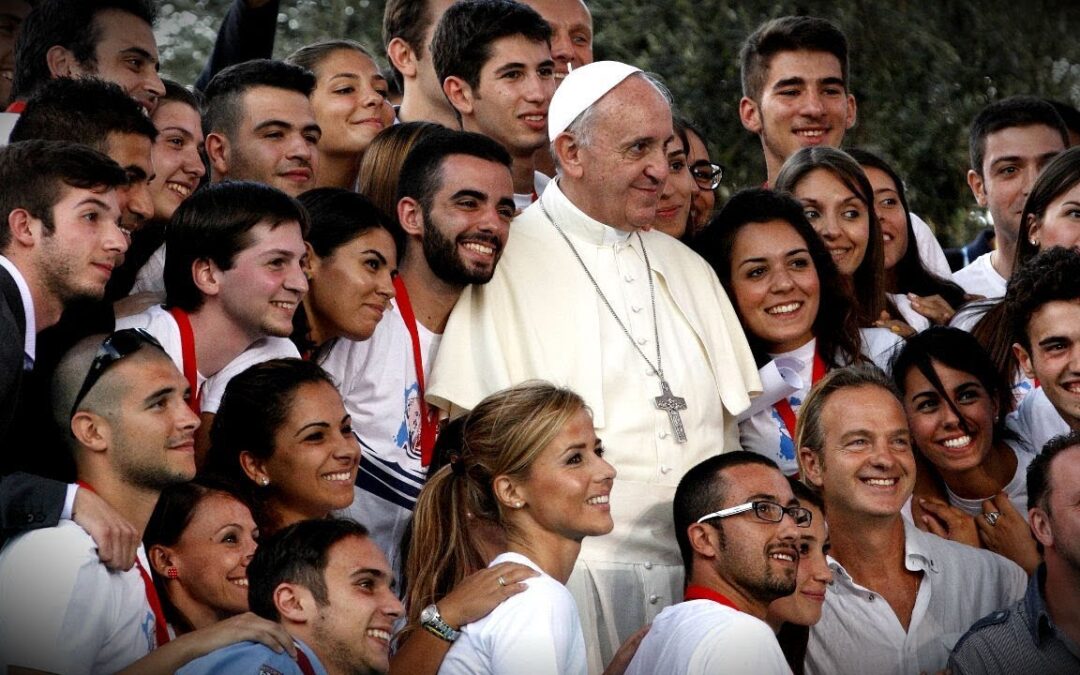
Sep 20, 2018 | Non categorizzato
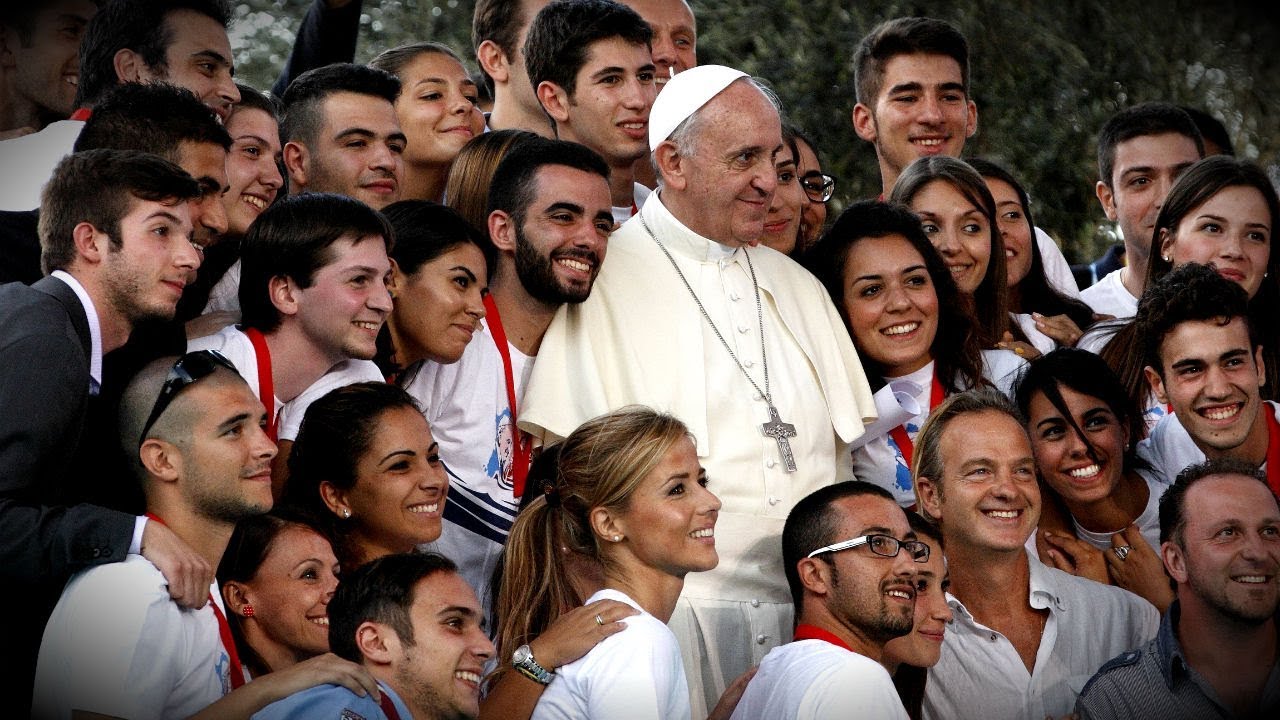 During the press release for the presentation of the Apostolic Constitution “Episcopalis Communio,” on 18 September, a new encounter of the Pope with the youth was announced, to be held at the start of the next Synod. “Once again the Pope wishes to meet the youth together with the synodal Fathers – affirmed Cardinal Lorenzo Baldisseri, secretary general of the Bishops’ Synod – to listen to them and receive their proposals to be used in the Synod’s final document.” The meeting will take place on 6 October, at 5 pm in the Paolo VI Hall.
During the press release for the presentation of the Apostolic Constitution “Episcopalis Communio,” on 18 September, a new encounter of the Pope with the youth was announced, to be held at the start of the next Synod. “Once again the Pope wishes to meet the youth together with the synodal Fathers – affirmed Cardinal Lorenzo Baldisseri, secretary general of the Bishops’ Synod – to listen to them and receive their proposals to be used in the Synod’s final document.” The meeting will take place on 6 October, at 5 pm in the Paolo VI Hall.
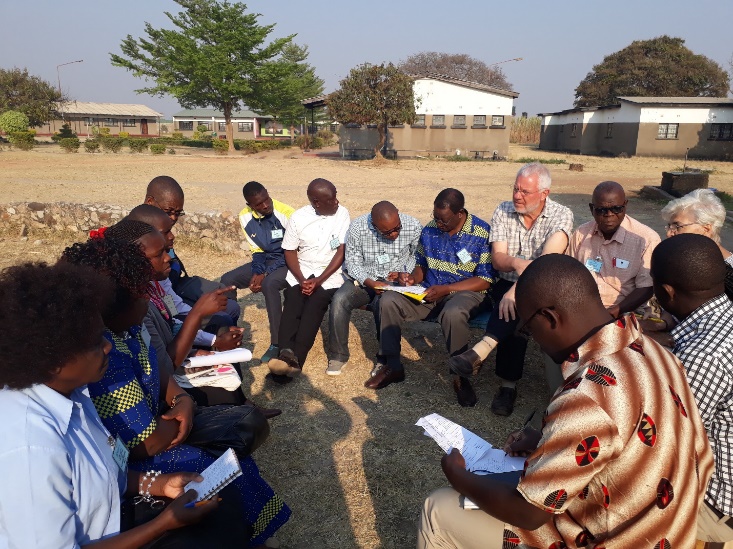
Sep 19, 2018 | Focolare Worldwide
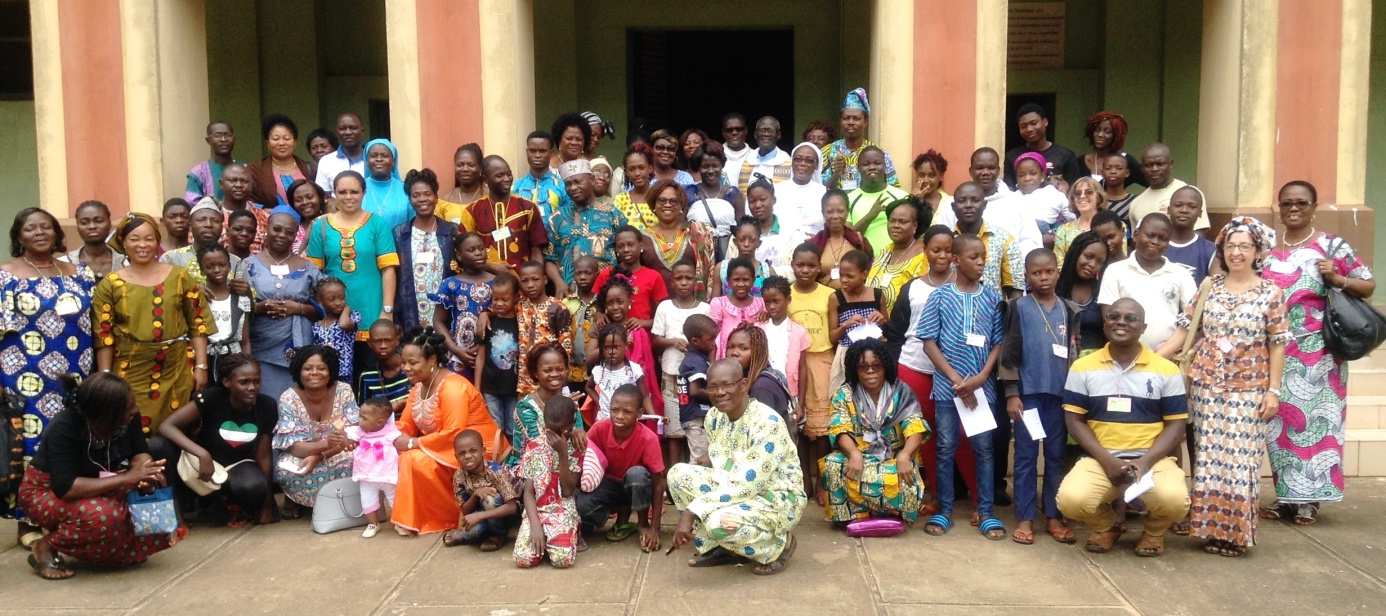 Ghana, Togo and Benin are situated alongside one another in a vertical line along the Gulf of Guinea. They are well known for their rich variety of landscape and for their ancient culture and historical ruins. In Ghana, for example, there are many colonial style buildings which remain from the time of slavery, in Bazar in Togo there are many clay settlements and in Abomey, Benin, there are the remains of the royal palace which is now a museum. The Mariapolis for this area was held in Benin. The report of this event prepared by Bernadette, Mariluz and Flora states, “Most of the people from Benin and Togo arrived wearing clothes made from the same cloth. This is what usually happens at big celebrations but what was striking was that the cloth was white.”
Ghana, Togo and Benin are situated alongside one another in a vertical line along the Gulf of Guinea. They are well known for their rich variety of landscape and for their ancient culture and historical ruins. In Ghana, for example, there are many colonial style buildings which remain from the time of slavery, in Bazar in Togo there are many clay settlements and in Abomey, Benin, there are the remains of the royal palace which is now a museum. The Mariapolis for this area was held in Benin. The report of this event prepared by Bernadette, Mariluz and Flora states, “Most of the people from Benin and Togo arrived wearing clothes made from the same cloth. This is what usually happens at big celebrations but what was striking was that the cloth was white.” 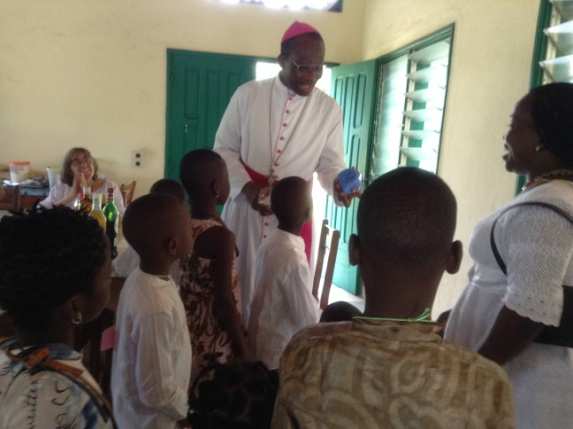 A warm welcome was given to the Archbishop of Cotonou, Roger Houngbedji, who was taking part in a Focolare gathering for the first time. There were 120 participants in total, including many teenagers and children. The programme included workshops on topics related to the practice of the ideal of unity in everyday life, improving one’s own life and making a positive impact upon society: for example, economy, the relationship between parents and children, affectivity and sexuality, handling stress. “The children played “living in the town” and took on different parts – in the hospital, at the market, on the sports pitch or in the restaurant. The young people spoke openly about the challenges they face. One morning was spent clearing the market place which was littered with empty plastic bags that had been thrown on the ground. The mayor had given permission for this public action which created a sense of beauty and harmony. In the past, slaves used to leave from the town of Ouidah for the ‘new world.’ Having been sold to white people, they crossed the ocean chained up in the hold of a ship. They took their last steps in their native land as they crossed the “point of no return” beyond which they were no longer considered to be human beings but merchandise. “We followed in their footsteps praying as we walked along this ‘way of the cross.’ At the ‘point’ we asked for an end to all forms of slavery and thanked God for the missionaries who later brought Christianity to Africa.”
A warm welcome was given to the Archbishop of Cotonou, Roger Houngbedji, who was taking part in a Focolare gathering for the first time. There were 120 participants in total, including many teenagers and children. The programme included workshops on topics related to the practice of the ideal of unity in everyday life, improving one’s own life and making a positive impact upon society: for example, economy, the relationship between parents and children, affectivity and sexuality, handling stress. “The children played “living in the town” and took on different parts – in the hospital, at the market, on the sports pitch or in the restaurant. The young people spoke openly about the challenges they face. One morning was spent clearing the market place which was littered with empty plastic bags that had been thrown on the ground. The mayor had given permission for this public action which created a sense of beauty and harmony. In the past, slaves used to leave from the town of Ouidah for the ‘new world.’ Having been sold to white people, they crossed the ocean chained up in the hold of a ship. They took their last steps in their native land as they crossed the “point of no return” beyond which they were no longer considered to be human beings but merchandise. “We followed in their footsteps praying as we walked along this ‘way of the cross.’ At the ‘point’ we asked for an end to all forms of slavery and thanked God for the missionaries who later brought Christianity to Africa.” 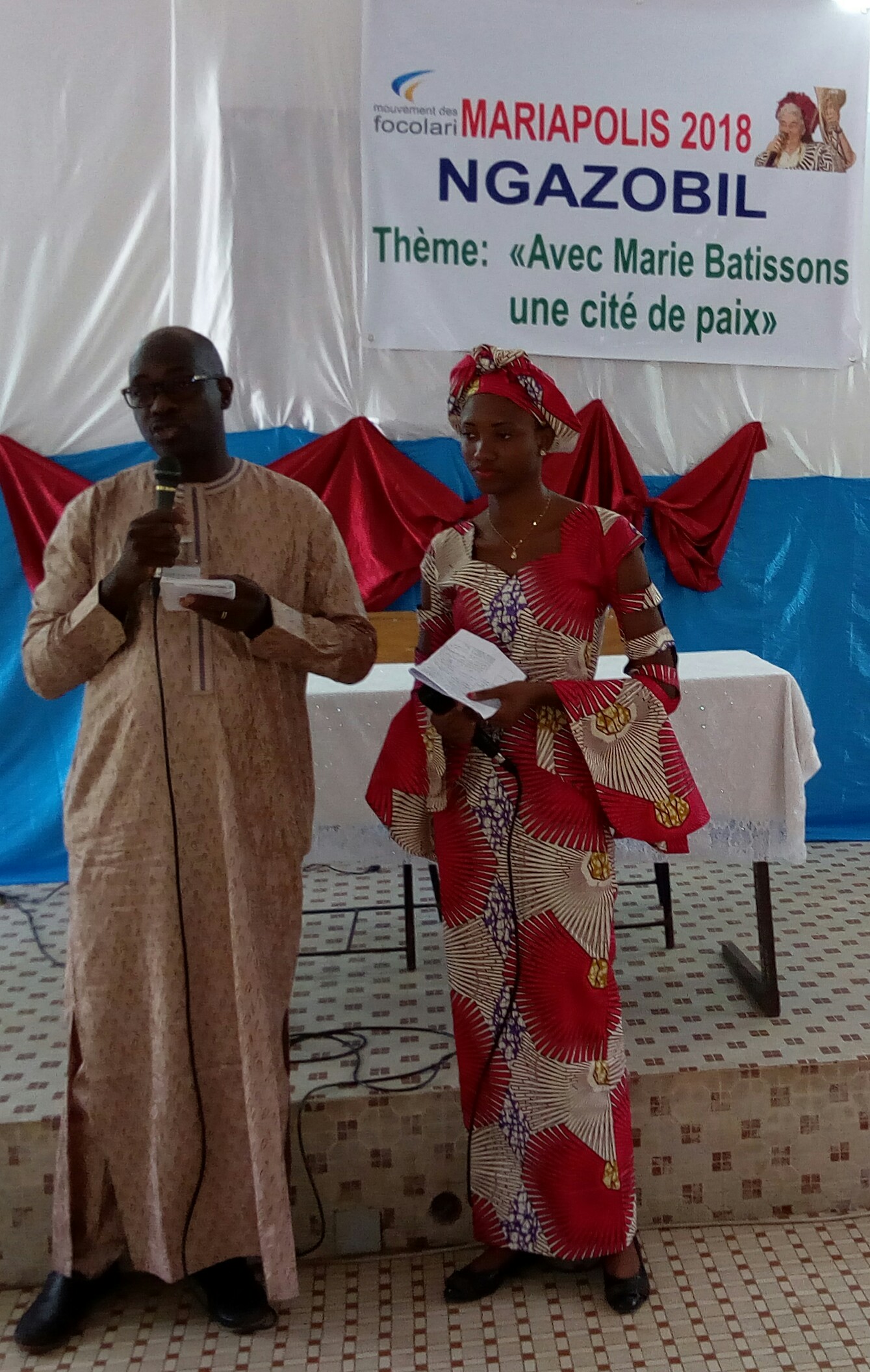 Moving west to Senegal, the Mariapolis was held in Ngazobil, 110 kilometres from the capital, Dakar. 94 people took part from Senegal, Mali and Burkina Faso: these countries lie close to the Sahel region in an area where risks to personal security are high. “It was not easy to travel to the Mariapolis. It took two days’ coach journey just to arrive for people from Mali and three days from Burkina Faso: it was really tiring for the very small children and for the older people many of whom use crutches to walk.” Aurora wrote, “The fact that people undertook such an uncomfortable journey in such difficult circumstances in order to reach a Mariapolis they called an ‘oasis’ or ‘town of peace’ is a witness to the fact that there is an enormous thirst for God in our people.” It was a beautiful experience of communion. Jean Noel Diof, emeritus bishop, attended as did Nana, a young Muslim from Burkina Faso. At the end, Nana said, “As the only Muslim, these four days have strengthened my faith and have helped me to appreciate another religion.” A Christian participant from Senegal said, “I have understood how to be with people from other Churches and with people of the Muslim faith.”
Moving west to Senegal, the Mariapolis was held in Ngazobil, 110 kilometres from the capital, Dakar. 94 people took part from Senegal, Mali and Burkina Faso: these countries lie close to the Sahel region in an area where risks to personal security are high. “It was not easy to travel to the Mariapolis. It took two days’ coach journey just to arrive for people from Mali and three days from Burkina Faso: it was really tiring for the very small children and for the older people many of whom use crutches to walk.” Aurora wrote, “The fact that people undertook such an uncomfortable journey in such difficult circumstances in order to reach a Mariapolis they called an ‘oasis’ or ‘town of peace’ is a witness to the fact that there is an enormous thirst for God in our people.” It was a beautiful experience of communion. Jean Noel Diof, emeritus bishop, attended as did Nana, a young Muslim from Burkina Faso. At the end, Nana said, “As the only Muslim, these four days have strengthened my faith and have helped me to appreciate another religion.” A Christian participant from Senegal said, “I have understood how to be with people from other Churches and with people of the Muslim faith.”  A Mariapolis also took place in Zambia, a central-southern area of the continent. Zambia has often been called the “real jewel of Africa” because of its landscape, full of features of outstanding natural beauty such as the famous Victoria Falls. The theme of the Mariapolis was “Mary, mother of unity.” Celestino wrote, “This theme was perfect because of the many divisions in our society at the moment. Such a diversity of people took part and their comments at the end reveal the importance of this meeting.” “A time for reflection and change.” “I have learnt what it means to love, to care for other people and to forgive.” “I have met brothers and sisters from my own country.”
A Mariapolis also took place in Zambia, a central-southern area of the continent. Zambia has often been called the “real jewel of Africa” because of its landscape, full of features of outstanding natural beauty such as the famous Victoria Falls. The theme of the Mariapolis was “Mary, mother of unity.” Celestino wrote, “This theme was perfect because of the many divisions in our society at the moment. Such a diversity of people took part and their comments at the end reveal the importance of this meeting.” “A time for reflection and change.” “I have learnt what it means to love, to care for other people and to forgive.” “I have met brothers and sisters from my own country.”
Sep 19, 2018 | Non categorizzato
Following a decision made last July, on 6 September, the Eritrean President Isaias Afewerki and Ethiopian Prime Minister, Abiy Ahmed Ali, signed a peace agreement called the “Gedda Pact.” The agreement which came about under the mediation of Saudi Arabia, the United Nations, the African Union and the United Arab Emirates, puts an end to a state of war between the two nations which continued also after the end of the conflict which lasted from 1998 to 2000 for territorial issues. The peace pact furthermore foresees, as per official communications, the opening of the embassies in the respective capitals, the resumption of road connections and use of Eritrean ports by Ethiopia and normal relations between the two countries “on the basis of the close geographic, historical and cultural bonds between the nations and their respective peoples.” The UN Secretary General, António Guterres, highlighted the importance of the Agreement, and defined the event as a “strong wind of hope in the Horn of Africa.” Meanwhile, a few days ago, the border between the two countries was reopened and many families, divided for twenty years were able to reunite.
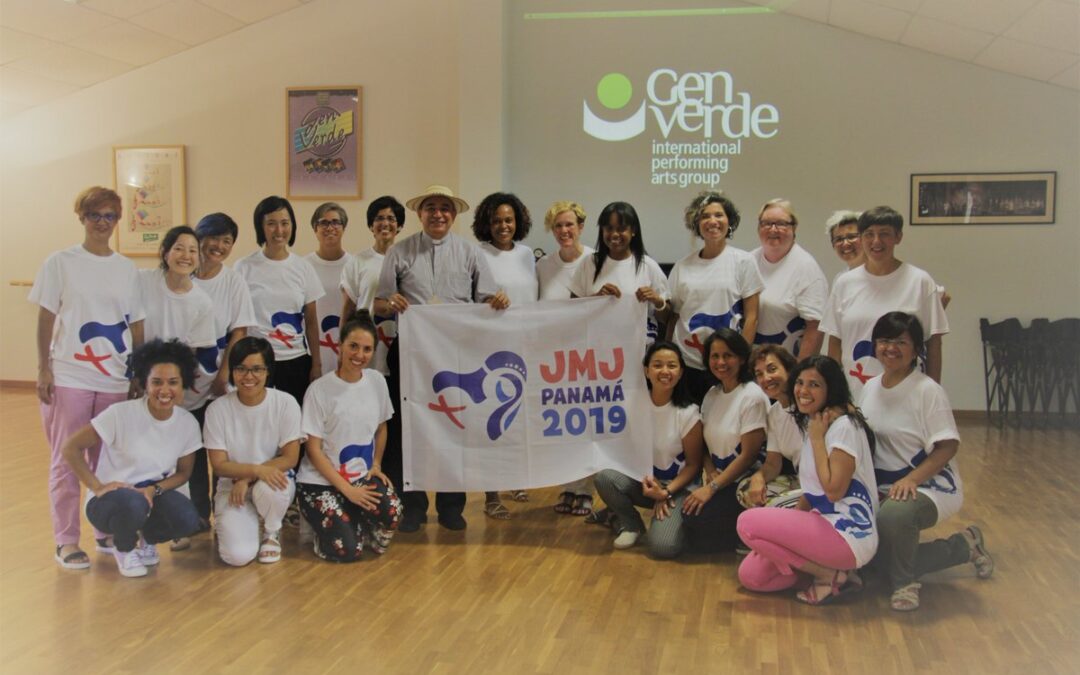
Sep 18, 2018 | Focolare Worldwide
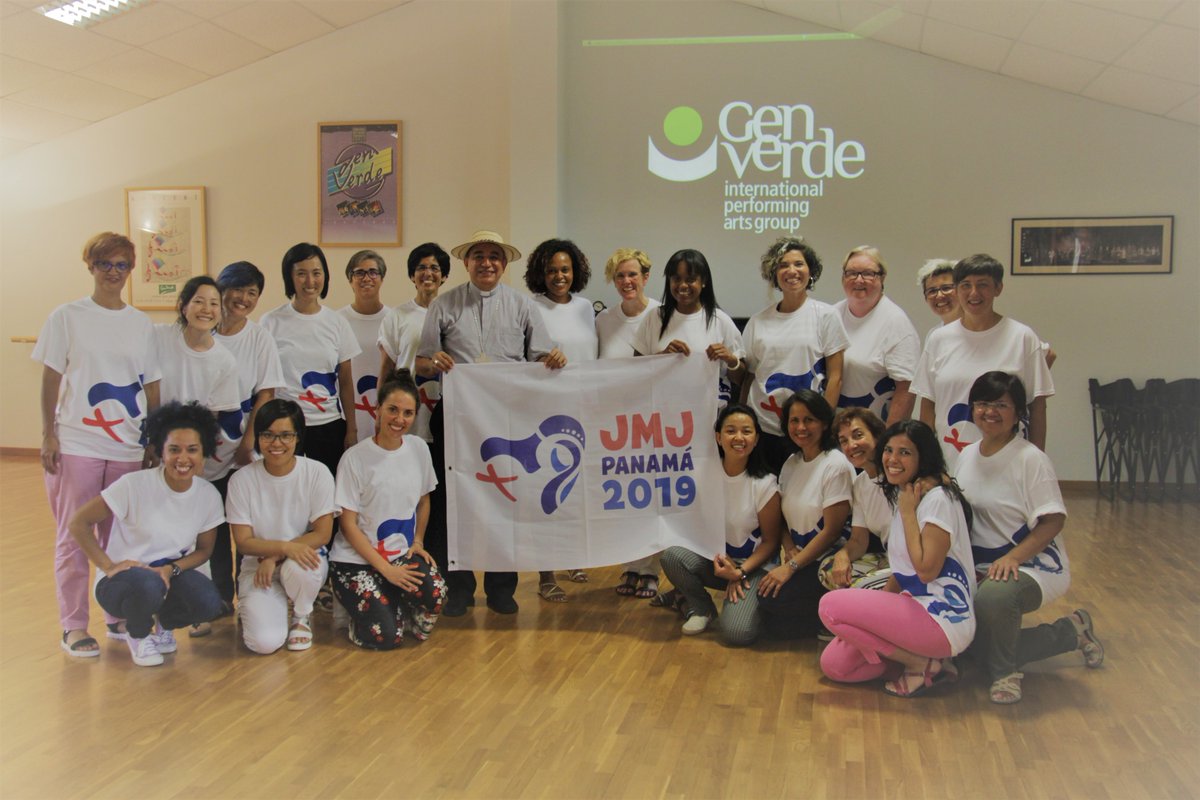 The Focolare’s international band Gen Verde is among 400 artists invited to perform during the next World Youth Day (WYD), organized by the Catholic Church, in January 2019 in Panama. “We are honoured and happy to be part of such an important moment,” explained a band member, “especially in the Panama land bridge, where the heart of the Church beats together with the heart of the youth. Latin America is well represented on ‘planet Gen Verde’ and we would not miss this event for the world.” Gen Verde’s “Start Now” show is part of the Festival which runs before and during the WYD, presenting artistic performances and exhibitions at different venues across the country from 22 to 27 January. The band will also be on stage to welcome pilgrims in the diocese of Chitré, province of Herrera on the Gulf of Panama, and for the local festival of Colón in the north of the country, at the entrance to the Panama Canal.
The Focolare’s international band Gen Verde is among 400 artists invited to perform during the next World Youth Day (WYD), organized by the Catholic Church, in January 2019 in Panama. “We are honoured and happy to be part of such an important moment,” explained a band member, “especially in the Panama land bridge, where the heart of the Church beats together with the heart of the youth. Latin America is well represented on ‘planet Gen Verde’ and we would not miss this event for the world.” Gen Verde’s “Start Now” show is part of the Festival which runs before and during the WYD, presenting artistic performances and exhibitions at different venues across the country from 22 to 27 January. The band will also be on stage to welcome pilgrims in the diocese of Chitré, province of Herrera on the Gulf of Panama, and for the local festival of Colón in the north of the country, at the entrance to the Panama Canal.
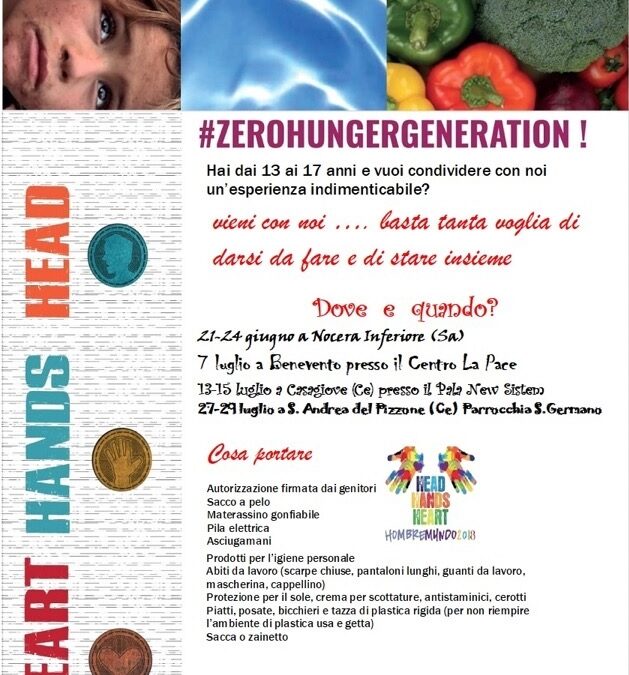
Sep 18, 2018 | Focolare Worldwide
“The Focolare community wanted to look around in the local environment for positive things that it could highlight and spread through mutual love, especially in the outlying suburbs where the poorest were waiting. We’ve listened to so many poor people. On the first day, fifty children, who had been gathered by Friar Michele Floriano, were waiting for us at St Joseph’s Parish. It was a joyous “siege” that we faced with abandonment to God’s plans.” Nocera Inferiore is an ancient town, tormented since the 1980s by criminality and unregulated building and development. In the 1980s a violent earthquake shook the whole province, sweeping away entire country-sides and causing many building collapses and victims. For almost forty years entire families of the Vescovado district have been living in pre-fabricated and unsanitary building, still waiting for more decent housing that keeps on being promised and then postponed. 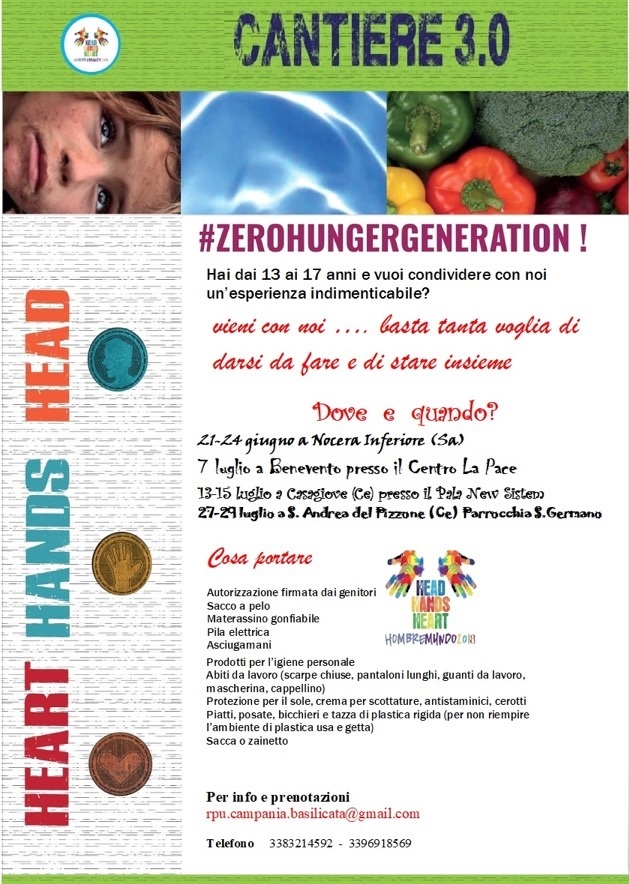 For three days (June 21-23), the Hombre mundo” worksite offered to the adult and youth volunteers who had stepped up and pitched in a true experience of a Church that reaches out in accordance with Pope Francis’s invitation. There were also the people in the background, in their own homes cooking dinners and suppers for everyone. “The neighbouring district of Calenda, which is part of the same parish,” write Felice and Romilda from the nearby town of Angri “mobilized their “Circle of Friends.” Moreover, several different associations became active in the worksite, offering their own contribution. “Hombre mundo” turned out to be the fruit of a network of people and groups that surpassed us. In these parts, marginalization threatens to make us lose our identity. We realized it when we asked a girl where she lived and she answered saying: ‘Lot 3,’ ‘Worse than Scampia, Bishop’s District’ stands in large letters on top of a gloomy rooftop, in a downward race that refers to the famous Naple’s district that is known for delinquency and drug trafficking. In front of the building is a large and open space where games are held for the children. “Mothers and sometimes grandmothers and some great-grandmothers come down to keep watch and chat with us, “unburdening themselves of some of their suffering.” “In the morning, after some prayer and reflection and tossing of the Cube of Love, the children are given free reign over the area next to the parish. The youths get involved in workshops under the guidance of artistic, musical, and environmental experts along with to the paediatric unit of the nearby hospital. More than once we have experienced the prompt intervention of God who supported us by sending people to help us out just at the right moment. For example, on the third day we were having problems organizing the games. Just then we received a telephone call. It was from an expert in conducting activities for children, who was offering to help. Everyone chipped in, also the teenagers who looked after the little ones, cleaning the quarter of weeds and planting flowers to leave touch of beauty and love in a place reduced to such poverty and suffering. The young people were especially touched by the testimony of 49 year-old Roberto who had spent a long and painful time in hospital, which he lived as “suffering transformed into love.” “Hombre mundo” concluded in Calenda where the Circle of Friends had supper prepared for everyone. It was a day of brotherhood and friendship, concluding with the final “show” by the young people who had taken part in the music workshop.
For three days (June 21-23), the Hombre mundo” worksite offered to the adult and youth volunteers who had stepped up and pitched in a true experience of a Church that reaches out in accordance with Pope Francis’s invitation. There were also the people in the background, in their own homes cooking dinners and suppers for everyone. “The neighbouring district of Calenda, which is part of the same parish,” write Felice and Romilda from the nearby town of Angri “mobilized their “Circle of Friends.” Moreover, several different associations became active in the worksite, offering their own contribution. “Hombre mundo” turned out to be the fruit of a network of people and groups that surpassed us. In these parts, marginalization threatens to make us lose our identity. We realized it when we asked a girl where she lived and she answered saying: ‘Lot 3,’ ‘Worse than Scampia, Bishop’s District’ stands in large letters on top of a gloomy rooftop, in a downward race that refers to the famous Naple’s district that is known for delinquency and drug trafficking. In front of the building is a large and open space where games are held for the children. “Mothers and sometimes grandmothers and some great-grandmothers come down to keep watch and chat with us, “unburdening themselves of some of their suffering.” “In the morning, after some prayer and reflection and tossing of the Cube of Love, the children are given free reign over the area next to the parish. The youths get involved in workshops under the guidance of artistic, musical, and environmental experts along with to the paediatric unit of the nearby hospital. More than once we have experienced the prompt intervention of God who supported us by sending people to help us out just at the right moment. For example, on the third day we were having problems organizing the games. Just then we received a telephone call. It was from an expert in conducting activities for children, who was offering to help. Everyone chipped in, also the teenagers who looked after the little ones, cleaning the quarter of weeds and planting flowers to leave touch of beauty and love in a place reduced to such poverty and suffering. The young people were especially touched by the testimony of 49 year-old Roberto who had spent a long and painful time in hospital, which he lived as “suffering transformed into love.” “Hombre mundo” concluded in Calenda where the Circle of Friends had supper prepared for everyone. It was a day of brotherhood and friendship, concluding with the final “show” by the young people who had taken part in the music workshop.
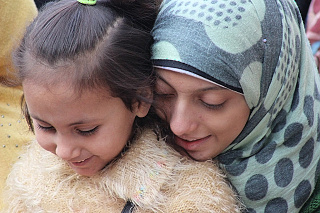
Sep 17, 2018 | Focolare Worldwide
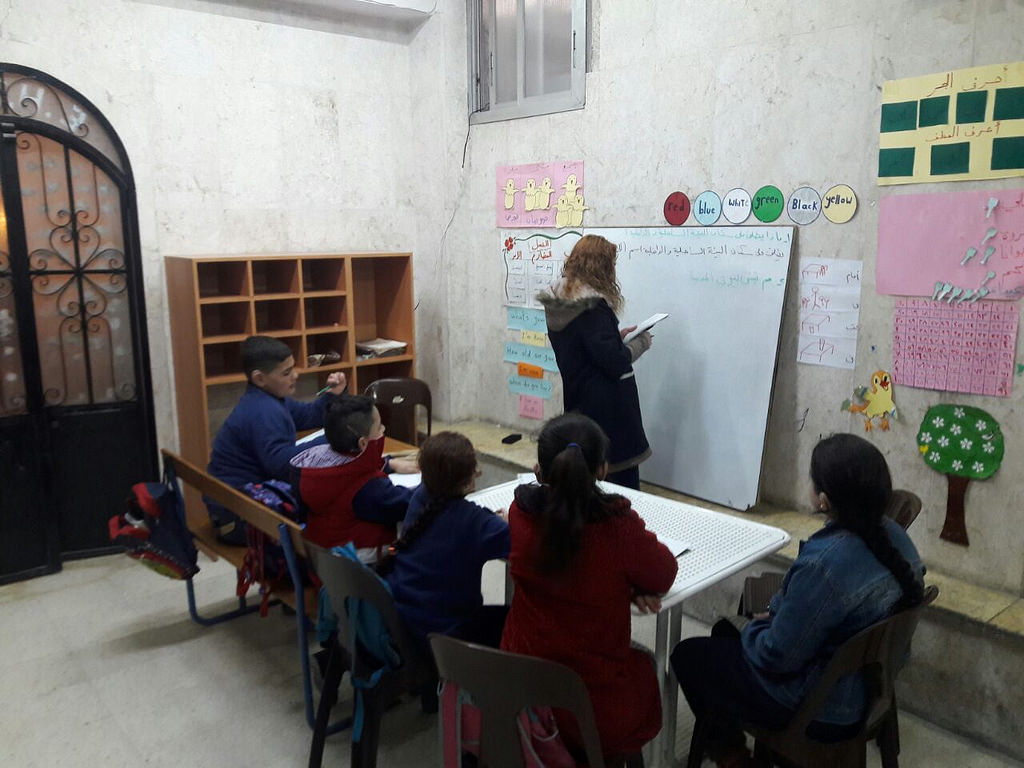 In the hemisphere where summer is giving way to autumn, many cities have suddenly changed their rhythm, to conform partly to the opening and closing schedules of the schools, the cause of morning traffic, jams, or the gathering of groups at the exit of the scholastic facilities. But if for many children it is obvious that the return to school with a backpack, means meeting teachers, schoolmates, occupying a desk and are chair, for many others, in other parts of the world, struck by painful situations of war or poverty, going to school, keeping up with one’s studies or doing the homework is a challenge. These are the problems addressed by AMU (Action for a United World). Inspired by the spirituality of Chiara Lubich, it works to spread a culture of dialogue and unity among peoples through development projects worldwide.
In the hemisphere where summer is giving way to autumn, many cities have suddenly changed their rhythm, to conform partly to the opening and closing schedules of the schools, the cause of morning traffic, jams, or the gathering of groups at the exit of the scholastic facilities. But if for many children it is obvious that the return to school with a backpack, means meeting teachers, schoolmates, occupying a desk and are chair, for many others, in other parts of the world, struck by painful situations of war or poverty, going to school, keeping up with one’s studies or doing the homework is a challenge. These are the problems addressed by AMU (Action for a United World). Inspired by the spirituality of Chiara Lubich, it works to spread a culture of dialogue and unity among peoples through development projects worldwide. 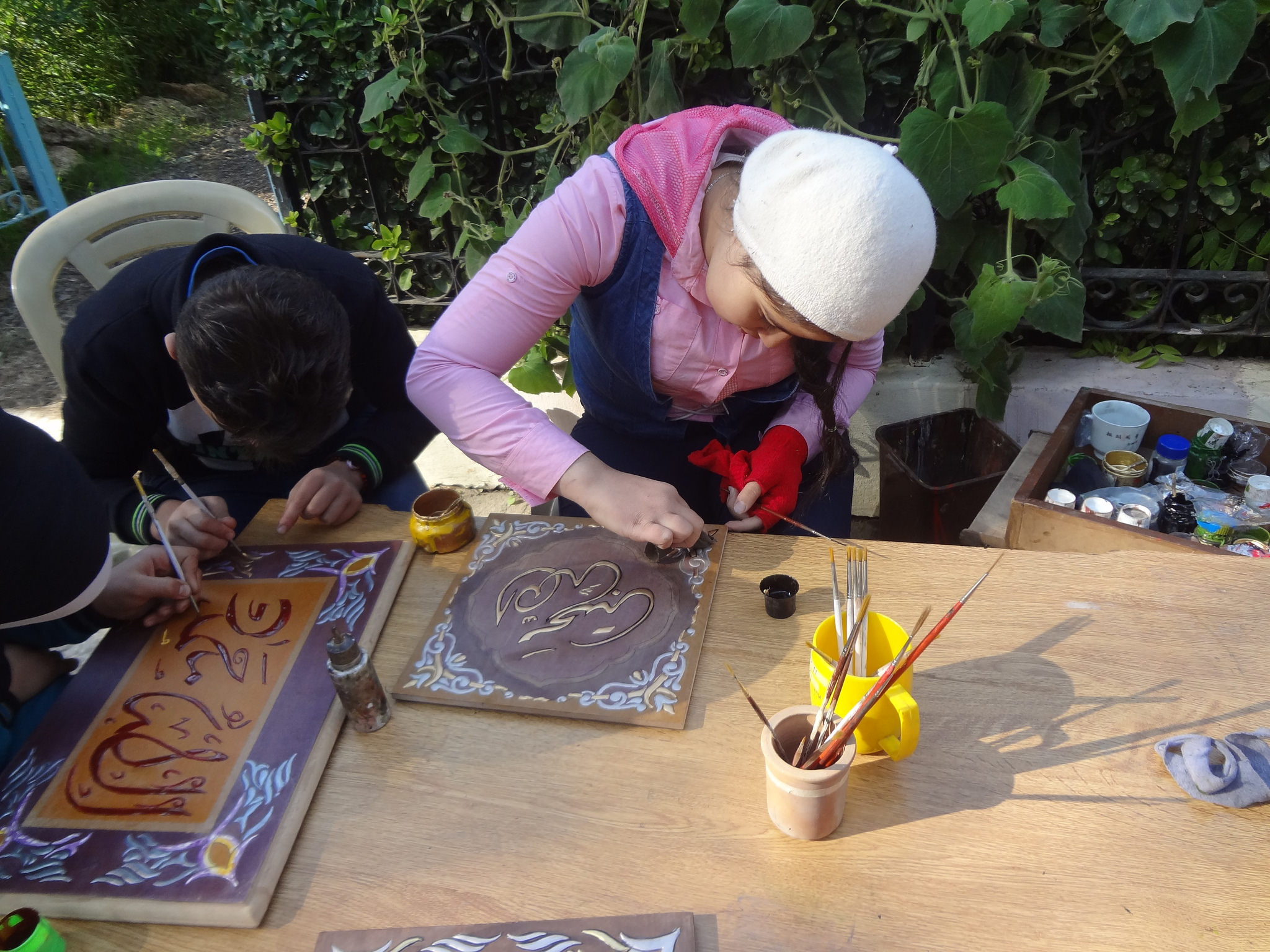 As for example in Syria. Today, now that the violent armed clashes have ceased, but not the emergency, the country is taking stock of the destruction of many school infrastructures and buildings, the migration of capital abroad, the economic embargo. In Homs, the transfer of many people from some bombed districts to others considered “safe” and the reduced number of professors, who have migrated, have led to an overcrowding of the schools, resulting in the lack of adequate support for each student. On the other hand, the cost of attending a private school has become impossible. AMU’s commitment is that of offering greater care and attention to the evacuated children, accompanying them with educational and scholastic programmes. Instead in Damascus, in the old Tabbale district, the aid goes to the “Bayt al Atfal” Centre which gathers, for four days a week, 120 children between 6 and 10 years of age. Some of them live with their families in just one room and do not have a place where they can study, others have learning difficulties or syndromes such as dyslexia, or simply cannot count on anyone’s help, due to the absence or the illiteracy of their parents. In Aleppo, AMU supports a centre for deaf children who are not admitted to public or private schools. Today the “EHIS” school hosts 75 children and offers work to 30 people, among whom, professors, assistants and labourers. Still in Aleppo, the learning project “Learn and produce,” organised by the Syrian Handicrafts Centre, and supported by AMU, is bringing ahead a training course, for 20 adolescents, who learn to make and sell local artisanal items like soap based on laurel, brass objects and embroideries.
As for example in Syria. Today, now that the violent armed clashes have ceased, but not the emergency, the country is taking stock of the destruction of many school infrastructures and buildings, the migration of capital abroad, the economic embargo. In Homs, the transfer of many people from some bombed districts to others considered “safe” and the reduced number of professors, who have migrated, have led to an overcrowding of the schools, resulting in the lack of adequate support for each student. On the other hand, the cost of attending a private school has become impossible. AMU’s commitment is that of offering greater care and attention to the evacuated children, accompanying them with educational and scholastic programmes. Instead in Damascus, in the old Tabbale district, the aid goes to the “Bayt al Atfal” Centre which gathers, for four days a week, 120 children between 6 and 10 years of age. Some of them live with their families in just one room and do not have a place where they can study, others have learning difficulties or syndromes such as dyslexia, or simply cannot count on anyone’s help, due to the absence or the illiteracy of their parents. In Aleppo, AMU supports a centre for deaf children who are not admitted to public or private schools. Today the “EHIS” school hosts 75 children and offers work to 30 people, among whom, professors, assistants and labourers. Still in Aleppo, the learning project “Learn and produce,” organised by the Syrian Handicrafts Centre, and supported by AMU, is bringing ahead a training course, for 20 adolescents, who learn to make and sell local artisanal items like soap based on laurel, brass objects and embroideries.  In Cairo, Egypt, the “hot topics” are scholastic dispersion and access of women to educational and professional courses that could help them develop their own professional capabilities. “Change For Tomorrow” of the Koz Kazah Foundation, in the community of Shubra, one of the most populated districts of the grand capital on the Nile, supports a group of women who have started up activities like the processing of wicker, cuisine, and ecological prints. In Italy, AMU offers to teachers and educators a training path entitled “Living peace: peace as a school project.” Instead, for schools and groups of teens, it offers the “Basta conoscersi” project. The AMU educational and study assistance projects welcome donations. In this way, for many children and adolescents September can really become a time to go back to school. By Chiara Favotti
In Cairo, Egypt, the “hot topics” are scholastic dispersion and access of women to educational and professional courses that could help them develop their own professional capabilities. “Change For Tomorrow” of the Koz Kazah Foundation, in the community of Shubra, one of the most populated districts of the grand capital on the Nile, supports a group of women who have started up activities like the processing of wicker, cuisine, and ecological prints. In Italy, AMU offers to teachers and educators a training path entitled “Living peace: peace as a school project.” Instead, for schools and groups of teens, it offers the “Basta conoscersi” project. The AMU educational and study assistance projects welcome donations. In this way, for many children and adolescents September can really become a time to go back to school. By Chiara Favotti
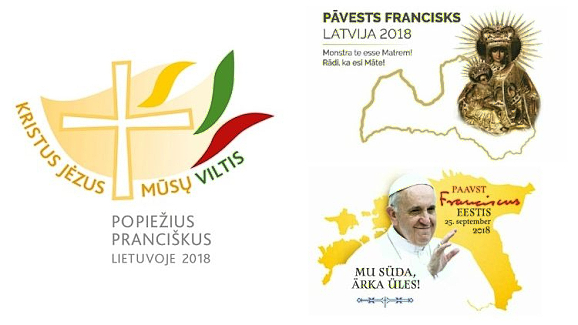
Sep 16, 2018 | Focolare Worldwide
 The next international itinerary of Pope Francis’s apostolic journeys will be in Lithuania, Latvia and Estonia, which will take place from 22 to 25 September, on the occasion of the centennial celebrations of the first declaration of independence of the three Baltic states of Russia. Among the most important events will be the prayer at the Museum of Occupations and Freedom Fights, known as the Museum of the Genocide Victims in Vilnius (Lithuania), the ecumenical meeting in Riga (Latvia), and the visit to the beneficiaries of the Works of Charity of Tallin (Estonia). The visit to the so-called Genocide Museum will be particularly symbolical because it was used by the secret police of the Soviet Union from 1944, the year in which Lithuania returned under the control of the USSR, up to 1991 when it regained its independence. Besides hosting the officials of the State Security Committee, the building acted as the venue for interrogations and as a prison for the political opponents of the communist regime. But the history of horror in this building started even earlier, in 1941 when the Nazis invaded Lithuania and the building was set up as the general headquarters of the Gestapo. In the three years between 1941 and 1944, about 100 thousand victims, a third of the city’s inhabitants, mostly Jews, were killed in Vilnius alone. Precisely to recall these horrors of the occupation, the Government decided to convert the building into a place of remembrance. In the various legs of his trip, the Pope will pay homage to the painful history of a population which has remained deeply anchored to its own Christian roots, despite the persecutions.
The next international itinerary of Pope Francis’s apostolic journeys will be in Lithuania, Latvia and Estonia, which will take place from 22 to 25 September, on the occasion of the centennial celebrations of the first declaration of independence of the three Baltic states of Russia. Among the most important events will be the prayer at the Museum of Occupations and Freedom Fights, known as the Museum of the Genocide Victims in Vilnius (Lithuania), the ecumenical meeting in Riga (Latvia), and the visit to the beneficiaries of the Works of Charity of Tallin (Estonia). The visit to the so-called Genocide Museum will be particularly symbolical because it was used by the secret police of the Soviet Union from 1944, the year in which Lithuania returned under the control of the USSR, up to 1991 when it regained its independence. Besides hosting the officials of the State Security Committee, the building acted as the venue for interrogations and as a prison for the political opponents of the communist regime. But the history of horror in this building started even earlier, in 1941 when the Nazis invaded Lithuania and the building was set up as the general headquarters of the Gestapo. In the three years between 1941 and 1944, about 100 thousand victims, a third of the city’s inhabitants, mostly Jews, were killed in Vilnius alone. Precisely to recall these horrors of the occupation, the Government decided to convert the building into a place of remembrance. In the various legs of his trip, the Pope will pay homage to the painful history of a population which has remained deeply anchored to its own Christian roots, despite the persecutions.





 Cherylanne (Doni) Menezes is from Mumbai. She is part of the delegation of 11 members representing India at the Synod on Youth, underway in Rome up to 28 October. Raised in a family that is very active in the district parish, and within the context of a multi-religious community, after her studies in economy and business Cherylanne started to work in the field of management. But her broad range of interests led her to acquire a Master’s at the
Cherylanne (Doni) Menezes is from Mumbai. She is part of the delegation of 11 members representing India at the Synod on Youth, underway in Rome up to 28 October. Raised in a family that is very active in the district parish, and within the context of a multi-religious community, after her studies in economy and business Cherylanne started to work in the field of management. But her broad range of interests led her to acquire a Master’s at the  The new appointment was for 17 October. The delegation arrived on time, at the entrance of Aula Nervi, at 4 p.m., together with that of South America. The afternoon session started at 4.30, and half an hour earlier Pope Francis met the single groups, in a joyful and informal personal encounter that was an integral part of the Synodal spirit. Percival gave the Pope a sandalwood cross bearing the image of the Good Shepherd, work of a Hindu artist. “I have also letters for you, Holy Father” Cherylanne added. The letters are wonderful, full of affection of the youth and families of
The new appointment was for 17 October. The delegation arrived on time, at the entrance of Aula Nervi, at 4 p.m., together with that of South America. The afternoon session started at 4.30, and half an hour earlier Pope Francis met the single groups, in a joyful and informal personal encounter that was an integral part of the Synodal spirit. Percival gave the Pope a sandalwood cross bearing the image of the Good Shepherd, work of a Hindu artist. “I have also letters for you, Holy Father” Cherylanne added. The letters are wonderful, full of affection of the youth and families of 




 Many of our readers are familiar with the story of Margarita Ramirez De Moreno who comes from Santa Maria di Catamarca in the north east of Argentina. She is a descendent of Calchaquies Aborigines whose leader was Juan Calchaqui. These people were well known for their abilities in many forms of traditional crafts. Margarita certainly inherited an enterprising spirit and great talent in weaving from her ancestors. When she was young, she studied for a diploma at the “Aurora School” in her town: this institute is recognised by the Argentinian government for the outstanding contribution it makes to teaching about designs and traditional skills deriving from the “quechuan” culture. Later on in life, Margarita was unemployed but she did not give in to the personal challenges that she and many women like her faced but decided to open a spinning mill to provide thread for the looms in the school workshop. This enabled her to overcome discrimination and reclaim her cultural identity. On October 1st in Tucuman, Margarita received an award during the first international meeting of “Women for Peace” organised by the “World Federation of Grand Master Ladies”. This is an international association, found in many parts of the world that works with individuals, groups and foundations: its spirit facilitates women in establishing links of friendship, fraternity and support and enables them engage politically in initiatives promoting peace, security and protection.
Many of our readers are familiar with the story of Margarita Ramirez De Moreno who comes from Santa Maria di Catamarca in the north east of Argentina. She is a descendent of Calchaquies Aborigines whose leader was Juan Calchaqui. These people were well known for their abilities in many forms of traditional crafts. Margarita certainly inherited an enterprising spirit and great talent in weaving from her ancestors. When she was young, she studied for a diploma at the “Aurora School” in her town: this institute is recognised by the Argentinian government for the outstanding contribution it makes to teaching about designs and traditional skills deriving from the “quechuan” culture. Later on in life, Margarita was unemployed but she did not give in to the personal challenges that she and many women like her faced but decided to open a spinning mill to provide thread for the looms in the school workshop. This enabled her to overcome discrimination and reclaim her cultural identity. On October 1st in Tucuman, Margarita received an award during the first international meeting of “Women for Peace” organised by the “World Federation of Grand Master Ladies”. This is an international association, found in many parts of the world that works with individuals, groups and foundations: its spirit facilitates women in establishing links of friendship, fraternity and support and enables them engage politically in initiatives promoting peace, security and protection.  “There is no peace without justice and there is no justice without peace,” affirmed Mariela Martin Domenichelli, the co ordinator of the Latin American branch of the federation. “It’s important to listen to the women describing the situations in which they live so they can transform their ideas into political action that benefits the entire community.” The meeting wanted to showcase the positive contribution made by women in various fields of action. After the federation visited her area, Margarita was chosen as the person who symbolises the complete integration of women and the entire Aboriginal community to which they belong. Margarita – who now has seven children – said that it had not been easy to convince women in her area to work in spinning mills once again because they had suffered discrimination for so long. In addition, they had to walk long distances, crossing rivers to reach the mill because there was no transport. However, they gradually began to share the little they had: a bobbin, some wool or their skills in traditional crafts.
“There is no peace without justice and there is no justice without peace,” affirmed Mariela Martin Domenichelli, the co ordinator of the Latin American branch of the federation. “It’s important to listen to the women describing the situations in which they live so they can transform their ideas into political action that benefits the entire community.” The meeting wanted to showcase the positive contribution made by women in various fields of action. After the federation visited her area, Margarita was chosen as the person who symbolises the complete integration of women and the entire Aboriginal community to which they belong. Margarita – who now has seven children – said that it had not been easy to convince women in her area to work in spinning mills once again because they had suffered discrimination for so long. In addition, they had to walk long distances, crossing rivers to reach the mill because there was no transport. However, they gradually began to share the little they had: a bobbin, some wool or their skills in traditional crafts. 








 Put the heads of a group of teenagers together having taken part in the recent annual workshop in Loppiano, and one keyword emerges: “participation.” In view of this, the Youth Section of the Economy of Communion (EoC) launched on the social network and among their friends a workshop called “Inside the LABel.” At the conclusion of the day which the Bonfanti Industrial Park had dedicated to the topics of economy and work, the participants left the meeting hall and the filled cars that were waiting to take them to the nearby Coop Supermarket in the town of Figline. A table was set up at the entrance of the superstore along with ballot boxes. Then, an innovative experiment began that lasted for two hours, a genuine voting campaign. The five candidates were: pasta, coffee, chocolate, canned tuna and oranges. “But what does democracy have to do with a supermarket?” someone asked. “It does, it has a lot to do…” said one of the organizers named Chiara. “Using our wallets, we exert our “buying power.” The “vote with our wallet” is just one example of civil responsibility. Whenever we buy a product we express a preference, we support the work of a business that produces the product, a particular business model, a mission, a series of internal processes, a certain type of managing of relationships with employees and providers, a certain type of impact on the environment.” “After a meeting with Luigino Buni on the relationship between democracy and market,” says Stefania, “we worked for nearly three months examining the ‘vision’ and ‘mission’ of small and large brands at around 20 businesses. Following indicators such as transparency, production chain, respect for the environment, social responsibility, corporate form and legal record, we gathered data and information that were published on the web.”
Put the heads of a group of teenagers together having taken part in the recent annual workshop in Loppiano, and one keyword emerges: “participation.” In view of this, the Youth Section of the Economy of Communion (EoC) launched on the social network and among their friends a workshop called “Inside the LABel.” At the conclusion of the day which the Bonfanti Industrial Park had dedicated to the topics of economy and work, the participants left the meeting hall and the filled cars that were waiting to take them to the nearby Coop Supermarket in the town of Figline. A table was set up at the entrance of the superstore along with ballot boxes. Then, an innovative experiment began that lasted for two hours, a genuine voting campaign. The five candidates were: pasta, coffee, chocolate, canned tuna and oranges. “But what does democracy have to do with a supermarket?” someone asked. “It does, it has a lot to do…” said one of the organizers named Chiara. “Using our wallets, we exert our “buying power.” The “vote with our wallet” is just one example of civil responsibility. Whenever we buy a product we express a preference, we support the work of a business that produces the product, a particular business model, a mission, a series of internal processes, a certain type of managing of relationships with employees and providers, a certain type of impact on the environment.” “After a meeting with Luigino Buni on the relationship between democracy and market,” says Stefania, “we worked for nearly three months examining the ‘vision’ and ‘mission’ of small and large brands at around 20 businesses. Following indicators such as transparency, production chain, respect for the environment, social responsibility, corporate form and legal record, we gathered data and information that were published on the web.”  “It was an interesting and enriching challenge,” continues Francesca, “which revealed a complexity of ethics, values and conventions that influence our daily purchases. As we moved ahead and our awareness increased, we came up with a project that we could share. The role of civil responsibility, being critical consumers and becoming aware that one’s own purchases, can influence the behaviour of large and small businesses. This is why we came up with a project that we call “Inside the Label.” This year’s LoppianoLab seemed like the opportunity to present it.” Andrea interrupts: “Based on the materials that were collected, we chose three products from different brands for each category, trying to highlight the nuances in terms of transparency, pricing, commitment and quality. We left it to the participants to choose the products they would buy, after having shared with them the tools for reading the labels also for “moral calories” and “ethical sugars.” It was a project that took nothing for granted, but stuck to reality.
“It was an interesting and enriching challenge,” continues Francesca, “which revealed a complexity of ethics, values and conventions that influence our daily purchases. As we moved ahead and our awareness increased, we came up with a project that we could share. The role of civil responsibility, being critical consumers and becoming aware that one’s own purchases, can influence the behaviour of large and small businesses. This is why we came up with a project that we call “Inside the Label.” This year’s LoppianoLab seemed like the opportunity to present it.” Andrea interrupts: “Based on the materials that were collected, we chose three products from different brands for each category, trying to highlight the nuances in terms of transparency, pricing, commitment and quality. We left it to the participants to choose the products they would buy, after having shared with them the tools for reading the labels also for “moral calories” and “ethical sugars.” It was a project that took nothing for granted, but stuck to reality. 



 Last September, Mayur and his friends visited the slums in Bhandup and a school in Kanjur (Mumbai). They met with around 110 children. With his group, the Mayur’s Dance Academy, Mayur organised dance workshops for children at a town school in the Bhandup school district. At the conclusion, there was the long awaited distribution of nutritious food like milk, fruit, etc. to the joy of all! Despite the strong rains over the last months, we,
Last September, Mayur and his friends visited the slums in Bhandup and a school in Kanjur (Mumbai). They met with around 110 children. With his group, the Mayur’s Dance Academy, Mayur organised dance workshops for children at a town school in the Bhandup school district. At the conclusion, there was the long awaited distribution of nutritious food like milk, fruit, etc. to the joy of all! Despite the strong rains over the last months, we,  With the sum collected, we bought a lot of cereals which we donated to the Ursuline nuns who take care of children affected by AIDS and their families. Though it was tiring, the happiness for having done something concrete was greater. Our efforts, though modest, were a small step ahead in contributing to the “
With the sum collected, we bought a lot of cereals which we donated to the Ursuline nuns who take care of children affected by AIDS and their families. Though it was tiring, the happiness for having done something concrete was greater. Our efforts, though modest, were a small step ahead in contributing to the “
 The great history of Central Europe, in particular of the Czech nation will serve as a backdrop for a new stage in the journey of
The great history of Central Europe, in particular of the Czech nation will serve as a backdrop for a new stage in the journey of 





 “There were more than 1,000 participants, a quarter of which belonged to the age bracket of the youth, adolescents and children; three central themes on employment, education, and participation, starting from the heritage of the 1968 youth movement; almost 50 workshops for adults and children; and around 10 speakers.” Aurora Nicosia, New City Director expressed her great satisfaction at the conclusion of the event. The title of this year’s LoppianoLab held in the International town of Loppiano recalled the anniversary of the youth protests: “From the dream to commitment, education, participation, and work fifty years after 1968.” Each of the three themes – education, participation, and employment were central to the plenary session which was followed by a series of workshops open to the contribution of everyone. The morning of Saturday, 29 September was dedicated to the theme of employment, and focused on “Why work will never end.” A dialogue was set up and participated in by Carlo Petrini, founder and soul of Slow food, Sr. Alessandra Smerilli, economist, and Fr. Antonio Loffredo of the Social Cooperative La Paranza, and was moderated by Atty. Flavia Cerino. The round table involved Mario Capanna, politician and essayist, Brunetto Salvarani, theologian, and Rosy Bind, former Congresswoman. It focused on the heritage handed down by the 1968 movement, was emceed by Marco Luppi (Historian, Sophia Univ. Inst.) and Federico Rovea (doctoral candidate in the Science of Education, Padua Univ.), and centred on the title: From the dream to commitment: beyond the revolution and the 1968 protest.
“There were more than 1,000 participants, a quarter of which belonged to the age bracket of the youth, adolescents and children; three central themes on employment, education, and participation, starting from the heritage of the 1968 youth movement; almost 50 workshops for adults and children; and around 10 speakers.” Aurora Nicosia, New City Director expressed her great satisfaction at the conclusion of the event. The title of this year’s LoppianoLab held in the International town of Loppiano recalled the anniversary of the youth protests: “From the dream to commitment, education, participation, and work fifty years after 1968.” Each of the three themes – education, participation, and employment were central to the plenary session which was followed by a series of workshops open to the contribution of everyone. The morning of Saturday, 29 September was dedicated to the theme of employment, and focused on “Why work will never end.” A dialogue was set up and participated in by Carlo Petrini, founder and soul of Slow food, Sr. Alessandra Smerilli, economist, and Fr. Antonio Loffredo of the Social Cooperative La Paranza, and was moderated by Atty. Flavia Cerino. The round table involved Mario Capanna, politician and essayist, Brunetto Salvarani, theologian, and Rosy Bind, former Congresswoman. It focused on the heritage handed down by the 1968 movement, was emceed by Marco Luppi (Historian, Sophia Univ. Inst.) and Federico Rovea (doctoral candidate in the Science of Education, Padua Univ.), and centred on the title: From the dream to commitment: beyond the revolution and the 1968 protest. 




 On the second day, the “marathon” continued. “The entire team” – recounted Carolina – “woke up early to meet over 300 students of the fourth and fifth year of 12 schools in Rosario, who gathered at the ‘Colegio Natividad del Señor’ to participate in a workshop. The kids put all their creativity to ‘create’ businesses and ‘make decisions’ over various situations regarding competition, crises, distribution of profits and selection of the personnel. The most important part, however, was that they subjected the EoC entrepreneurs present to a test, and who responded with their own life experiences. In the afternoon we went to the After Unplugged ‘Empresas de un solo tiempo’ session in La Maquinita Rosario. It was a co-working setting where Gonzalo Perrín, Leandro Simeoni and Lucas Longhi narrated about their own experiences as entrepreneurs for a common project. On Saturday, we welcomed the 120 participants from 30 cities of 8 provinces and 4 different countries. It was a big group, highly assorted by age and profession. The innovative presentation, tracing the present to the origins of the EoC, was followed by testimonials of the employees of some companies that were a part of the project. There were different experiences, from a family business that produces sustainable benches to a contact center with 1,200 employees, ’Nomines,’ an inclusive company which hires only disabled people.”
On the second day, the “marathon” continued. “The entire team” – recounted Carolina – “woke up early to meet over 300 students of the fourth and fifth year of 12 schools in Rosario, who gathered at the ‘Colegio Natividad del Señor’ to participate in a workshop. The kids put all their creativity to ‘create’ businesses and ‘make decisions’ over various situations regarding competition, crises, distribution of profits and selection of the personnel. The most important part, however, was that they subjected the EoC entrepreneurs present to a test, and who responded with their own life experiences. In the afternoon we went to the After Unplugged ‘Empresas de un solo tiempo’ session in La Maquinita Rosario. It was a co-working setting where Gonzalo Perrín, Leandro Simeoni and Lucas Longhi narrated about their own experiences as entrepreneurs for a common project. On Saturday, we welcomed the 120 participants from 30 cities of 8 provinces and 4 different countries. It was a big group, highly assorted by age and profession. The innovative presentation, tracing the present to the origins of the EoC, was followed by testimonials of the employees of some companies that were a part of the project. There were different experiences, from a family business that produces sustainable benches to a contact center with 1,200 employees, ’Nomines,’ an inclusive company which hires only disabled people.” 





 “Whatever you did to one of the least of these brothers and sisters of mine, you did it to me” (Mt 26:40). This sentence from the Gospel is the most definitive word on what a human being is. This definition is no less scandalous than Jesus declaring himself Son of God. In the name of their personal freedom, identity and uniqueness, human beings think that they have a right to contest the fact that they are so identified with Jesus Christ. Human beings want to be loved for themselves, for who they are, and not to be degraded as some sort of mask for Jesus. Human beings fear that the “bit more” of love that they receive out of love for Jesus might not take them into account, might rob them of the love they need and desire for themselves. But who could neglect their neighbours while trying to love Jesus in them (and in this way also neglect Jesus)? And who could claim that acknowledging the presence of Jesus in others means diminishing their human dignity; in that case they have not understood the presence of Jesus in their neighbours. Since Jesus has identified himself with humankind – God himself who is Love – he has also identified himself with every individual human being. But love is never an affirmation of oneself that consumes and annihilates others. It’s something that gives of itself, and, in its self-giving, provides others with the freedom to be themselves. Jesus never leaves me alone. He is on my side, he accepts me just as I am, and whatever concerns me, also concerns Him. I remain myself. Indeed, I become my fullest self precisely because I never remain alone. The mystery of Christ is the mystery of every human being. What does this mean for the people I meet, and what does it mean for me and my life? For what regards other people, it means that I am never dealing merely with a link in the chain, a cog in the wheel, or just a number in the huge numbers of people that exist. Each time I look upon a human face, I meet God in his unconditioned state, I encounter that voice that still declares over the face of every human being, what was said of Jesus during the Transfiguration on that mountaintop: “This is my beloved son!” (Mk 9:7). There are no exceptions… A human cannot rob itself of its ultimate reality. Whether he is a criminal or a scoundrel, I can never again write him off as a lost case. I encounter Christ in every person not because the person is good or deserving, not even because he or she draws upon the divine light in their personal lives, but because God has irrevocably adopted them as his own sons and daughters. Certainly the human being is immense because of the Divine life that he and she have let into their souls because of their personal choice to believe, which took place in baptism in the name of Jesus. Belonging to Jesus is something “automatic.” When a person is born, Christ has already assumed into himself that person’s living and dying, fault and self-inflicted wounds: everything is assumed into the life and death of Christ who gave his life for each one of us. This is why we encounter Jesus in every human being. And we encounter him in a particular way in the least, in those who seem to be farthest from Him, in the people in whom his face seems to be most overshadowed. Why? Because on the cross, during his abandonment by God, even becoming sin (2 Cor 5:21), Jesus identified himself with what is farthest from God, what seems most opposed to God. [It is only by] discovering Christ in our neighbours and giving to each of them that human love with which you turn towards every neighbour, with an indivisible love that is therefore directed to Christ himself, that will enable every neighbour to discover his and her own identity with Jesus, their own nearness to Jesus, being completely assumed by Him.” (From “Offene Weltformel”, by
“Whatever you did to one of the least of these brothers and sisters of mine, you did it to me” (Mt 26:40). This sentence from the Gospel is the most definitive word on what a human being is. This definition is no less scandalous than Jesus declaring himself Son of God. In the name of their personal freedom, identity and uniqueness, human beings think that they have a right to contest the fact that they are so identified with Jesus Christ. Human beings want to be loved for themselves, for who they are, and not to be degraded as some sort of mask for Jesus. Human beings fear that the “bit more” of love that they receive out of love for Jesus might not take them into account, might rob them of the love they need and desire for themselves. But who could neglect their neighbours while trying to love Jesus in them (and in this way also neglect Jesus)? And who could claim that acknowledging the presence of Jesus in others means diminishing their human dignity; in that case they have not understood the presence of Jesus in their neighbours. Since Jesus has identified himself with humankind – God himself who is Love – he has also identified himself with every individual human being. But love is never an affirmation of oneself that consumes and annihilates others. It’s something that gives of itself, and, in its self-giving, provides others with the freedom to be themselves. Jesus never leaves me alone. He is on my side, he accepts me just as I am, and whatever concerns me, also concerns Him. I remain myself. Indeed, I become my fullest self precisely because I never remain alone. The mystery of Christ is the mystery of every human being. What does this mean for the people I meet, and what does it mean for me and my life? For what regards other people, it means that I am never dealing merely with a link in the chain, a cog in the wheel, or just a number in the huge numbers of people that exist. Each time I look upon a human face, I meet God in his unconditioned state, I encounter that voice that still declares over the face of every human being, what was said of Jesus during the Transfiguration on that mountaintop: “This is my beloved son!” (Mk 9:7). There are no exceptions… A human cannot rob itself of its ultimate reality. Whether he is a criminal or a scoundrel, I can never again write him off as a lost case. I encounter Christ in every person not because the person is good or deserving, not even because he or she draws upon the divine light in their personal lives, but because God has irrevocably adopted them as his own sons and daughters. Certainly the human being is immense because of the Divine life that he and she have let into their souls because of their personal choice to believe, which took place in baptism in the name of Jesus. Belonging to Jesus is something “automatic.” When a person is born, Christ has already assumed into himself that person’s living and dying, fault and self-inflicted wounds: everything is assumed into the life and death of Christ who gave his life for each one of us. This is why we encounter Jesus in every human being. And we encounter him in a particular way in the least, in those who seem to be farthest from Him, in the people in whom his face seems to be most overshadowed. Why? Because on the cross, during his abandonment by God, even becoming sin (2 Cor 5:21), Jesus identified himself with what is farthest from God, what seems most opposed to God. [It is only by] discovering Christ in our neighbours and giving to each of them that human love with which you turn towards every neighbour, with an indivisible love that is therefore directed to Christ himself, that will enable every neighbour to discover his and her own identity with Jesus, their own nearness to Jesus, being completely assumed by Him.” (From “Offene Weltformel”, by 




 The following intervention was by Patience Lobe, first
The following intervention was by Patience Lobe, first 



 During the press release for the presentation of the Apostolic Constitution “Episcopalis Communio,” on 18 September, a new encounter of the Pope with the youth was announced, to be held at the start of
During the press release for the presentation of the Apostolic Constitution “Episcopalis Communio,” on 18 September, a new encounter of the Pope with the youth was announced, to be held at the start of 










